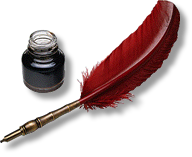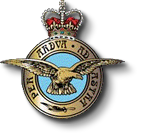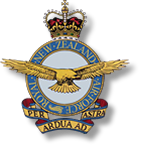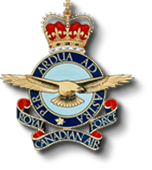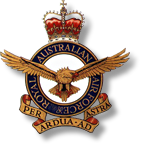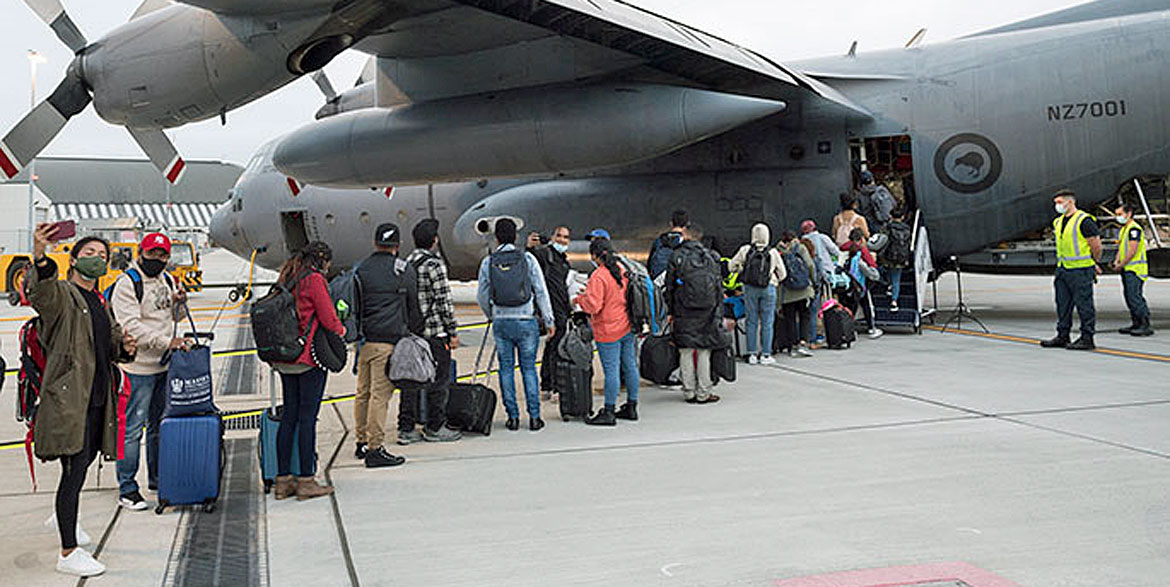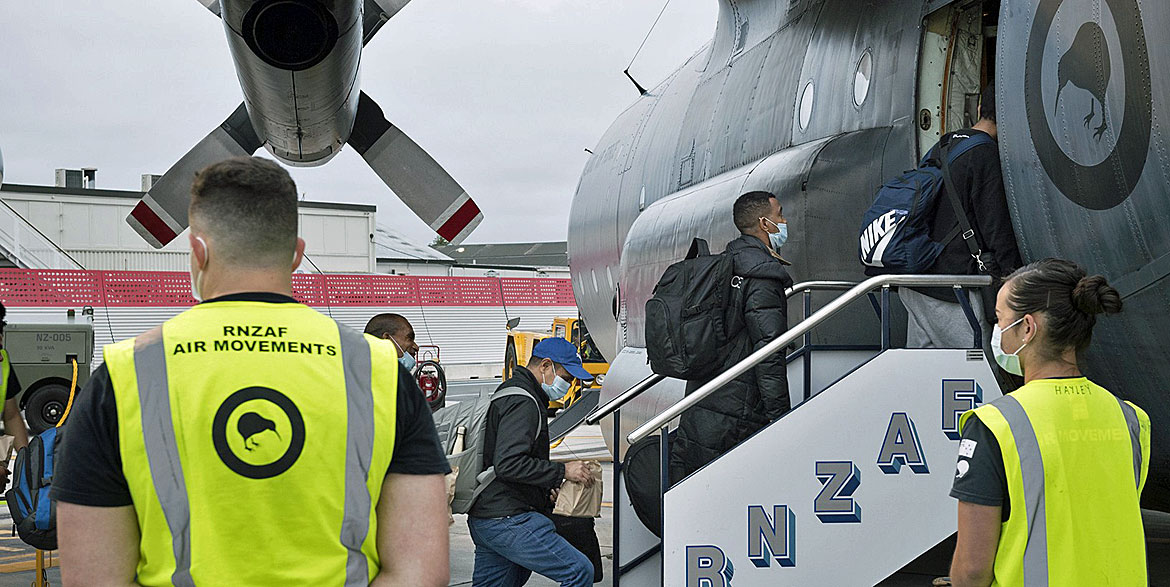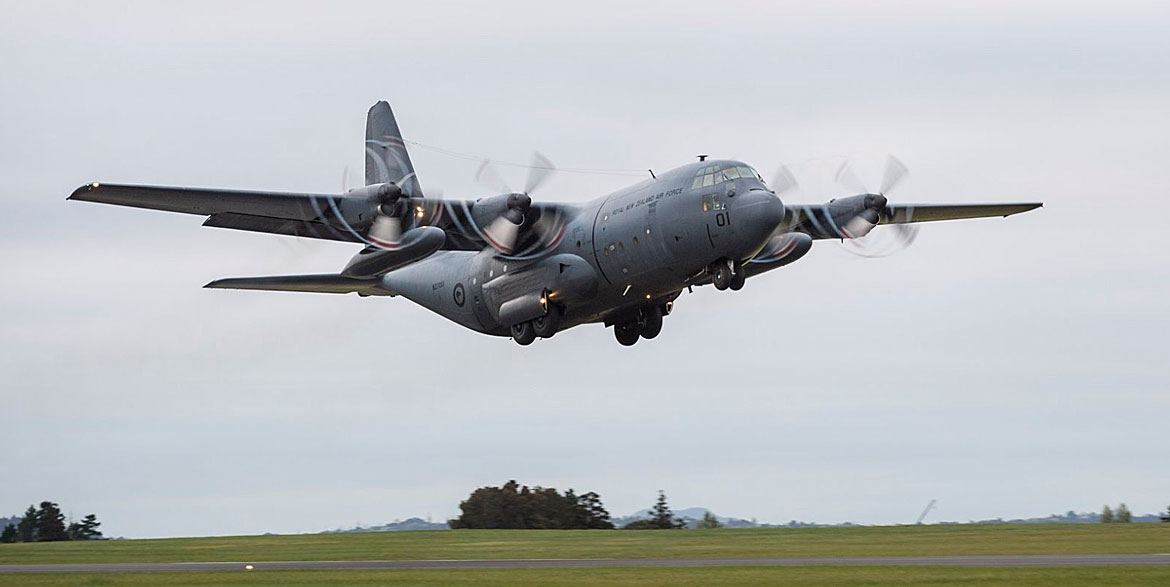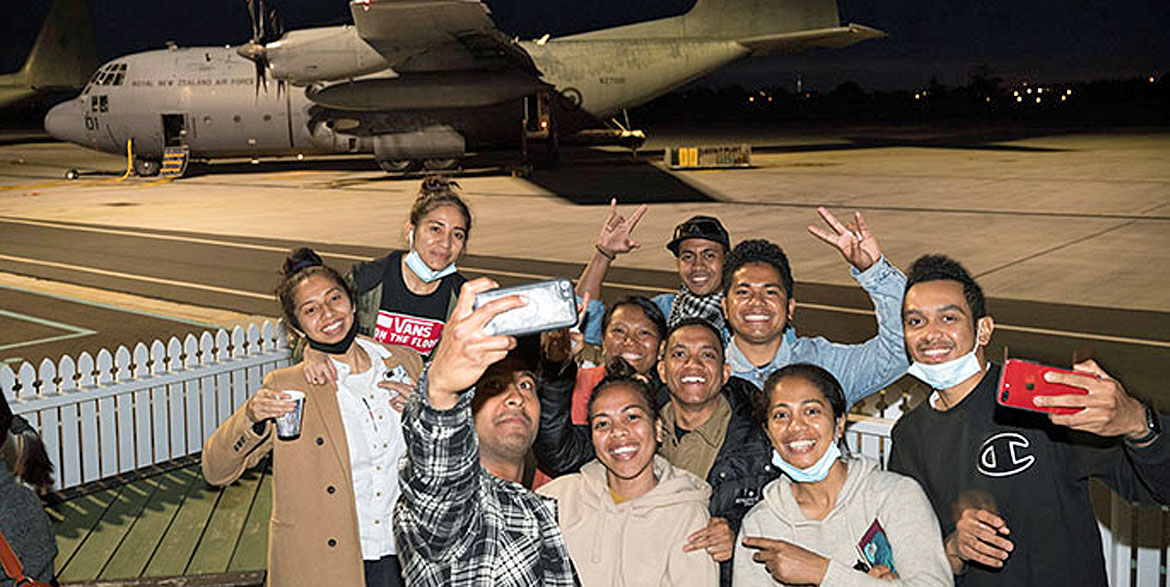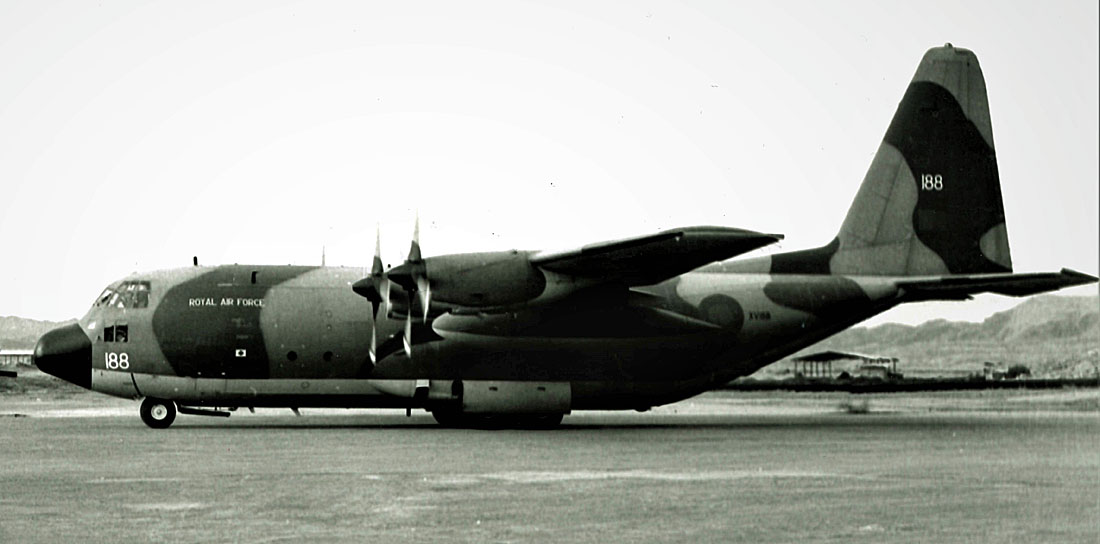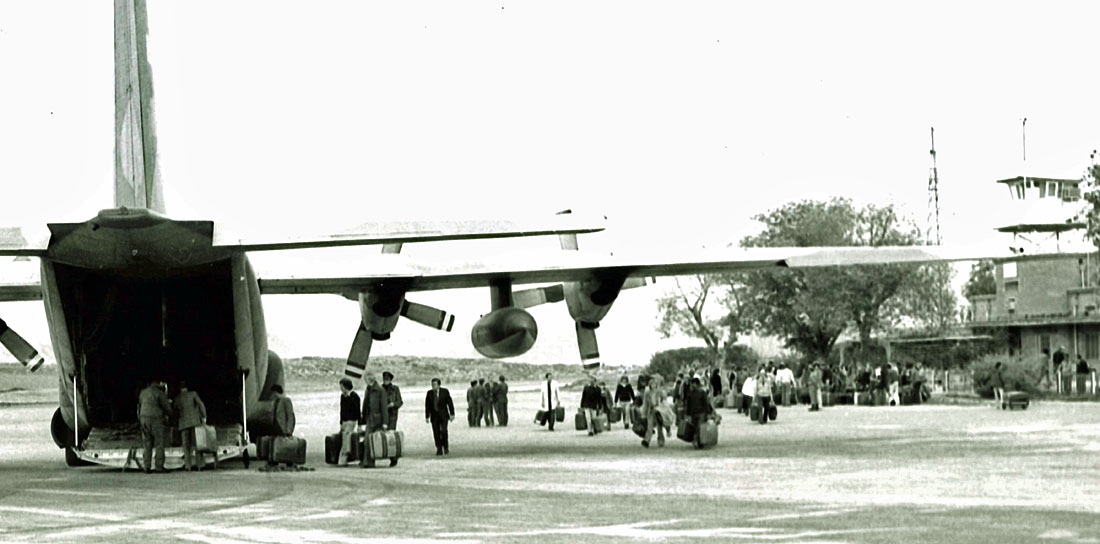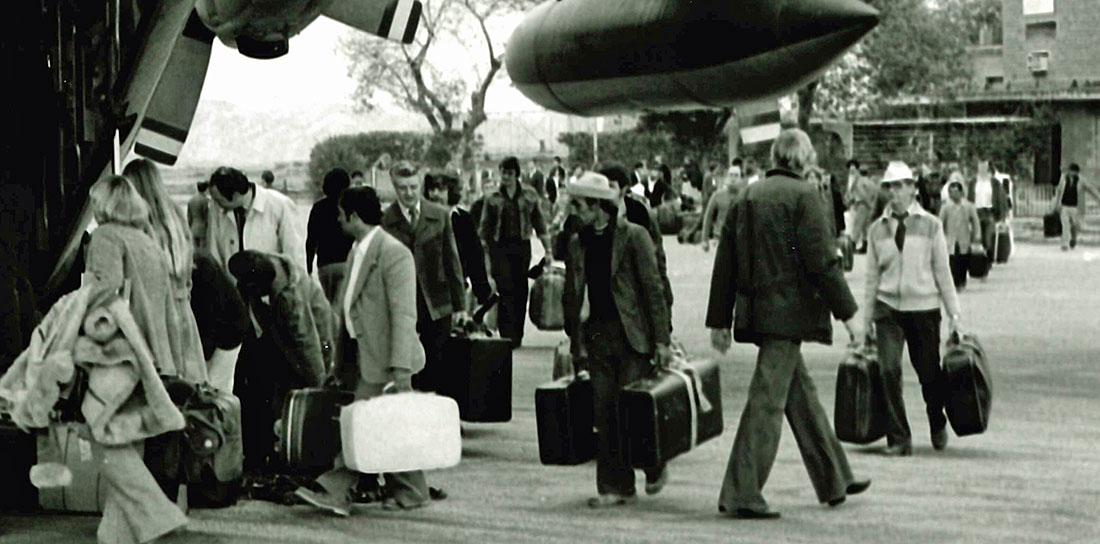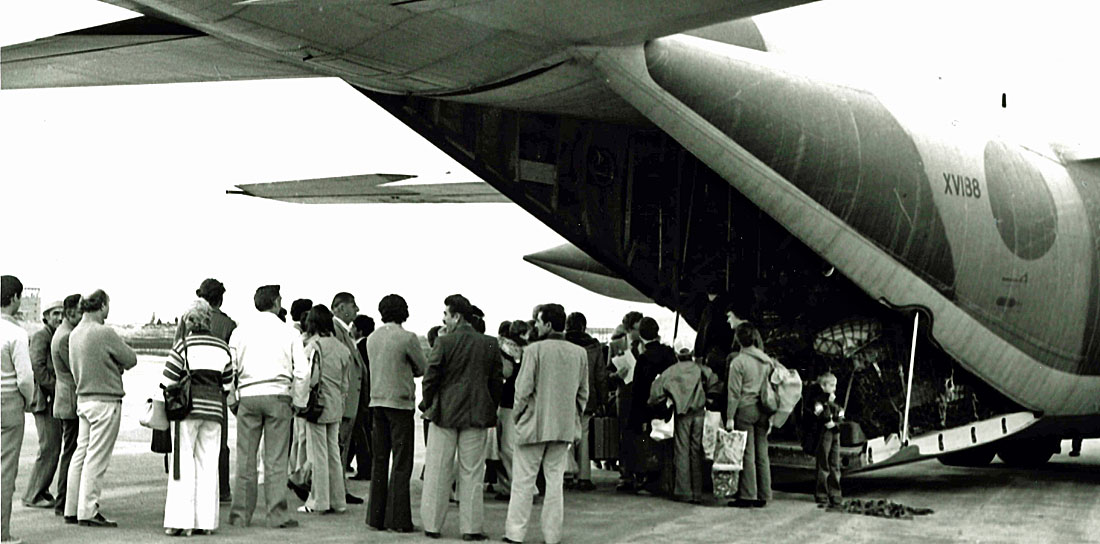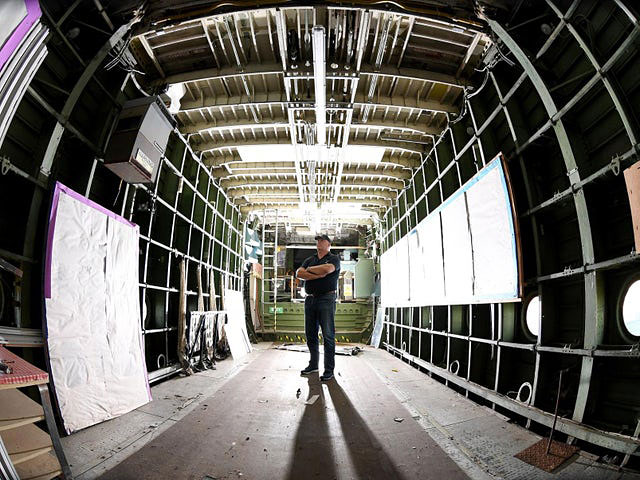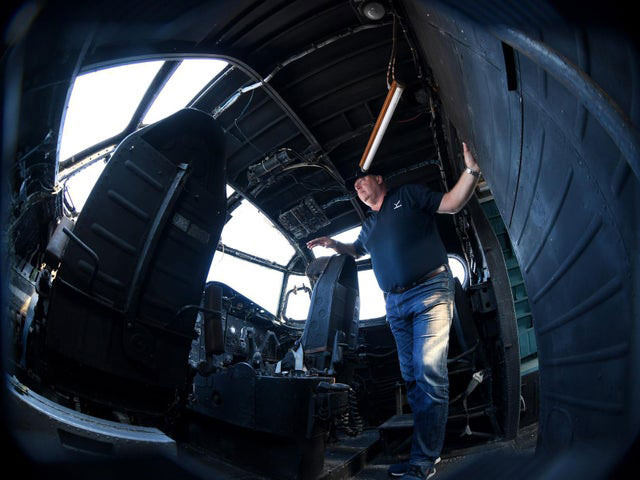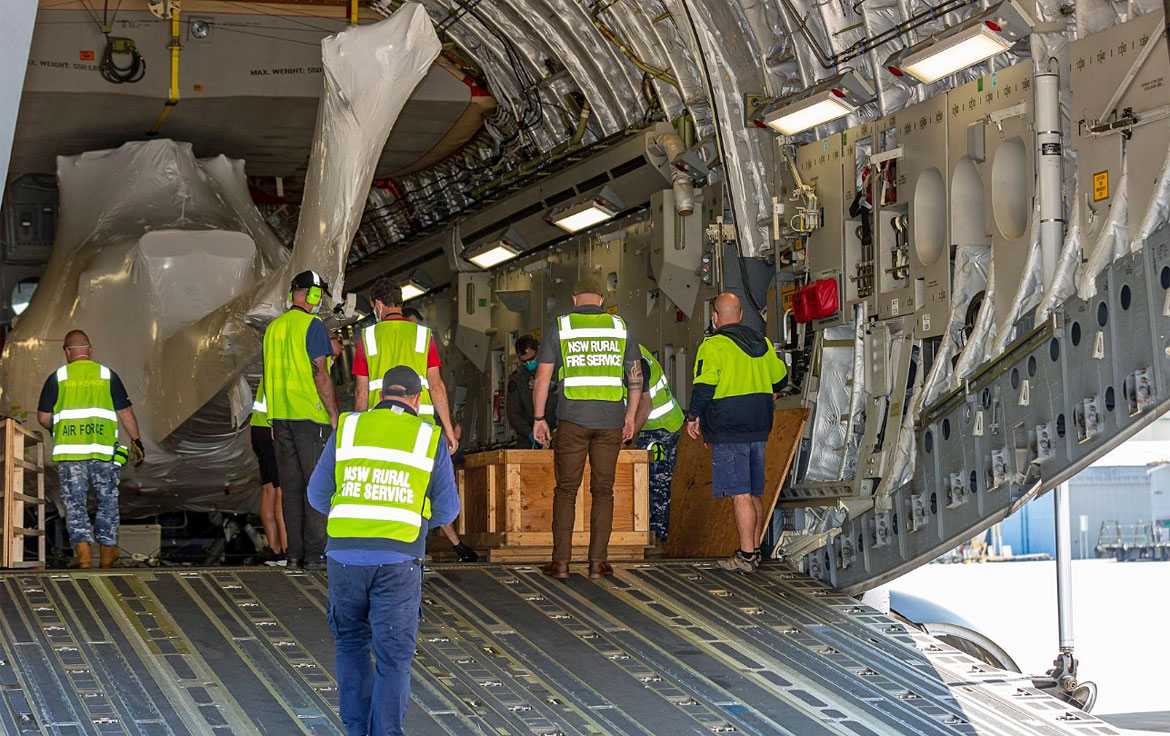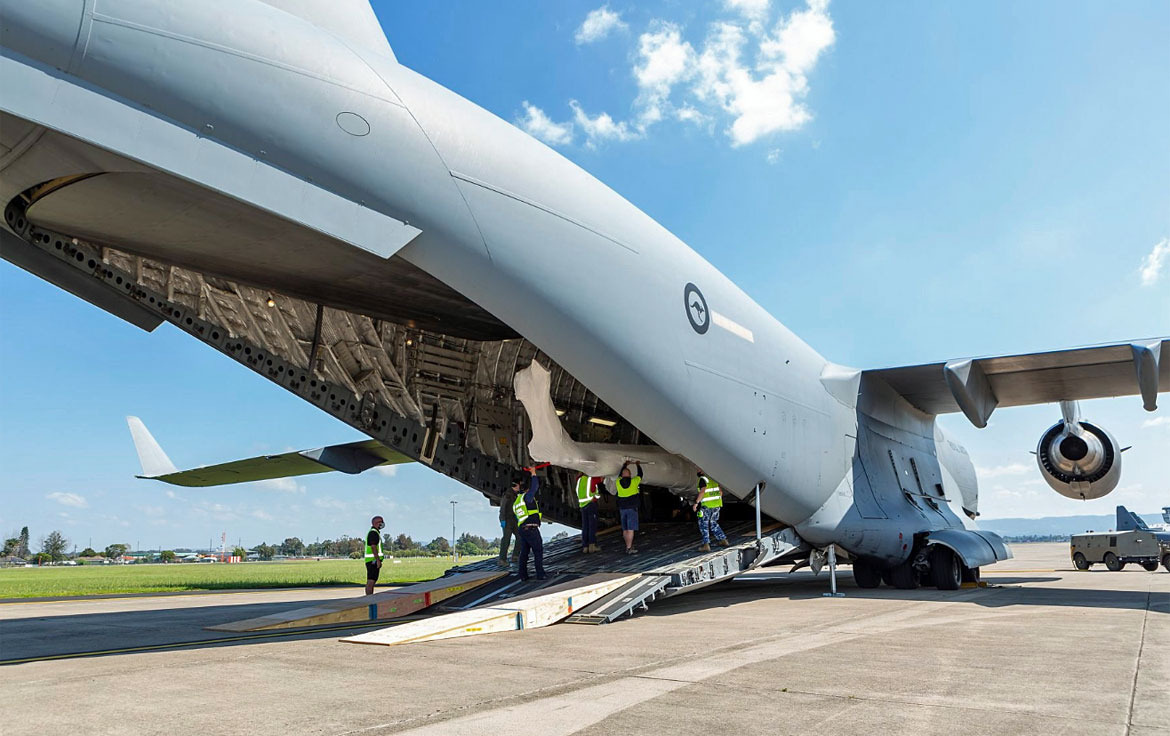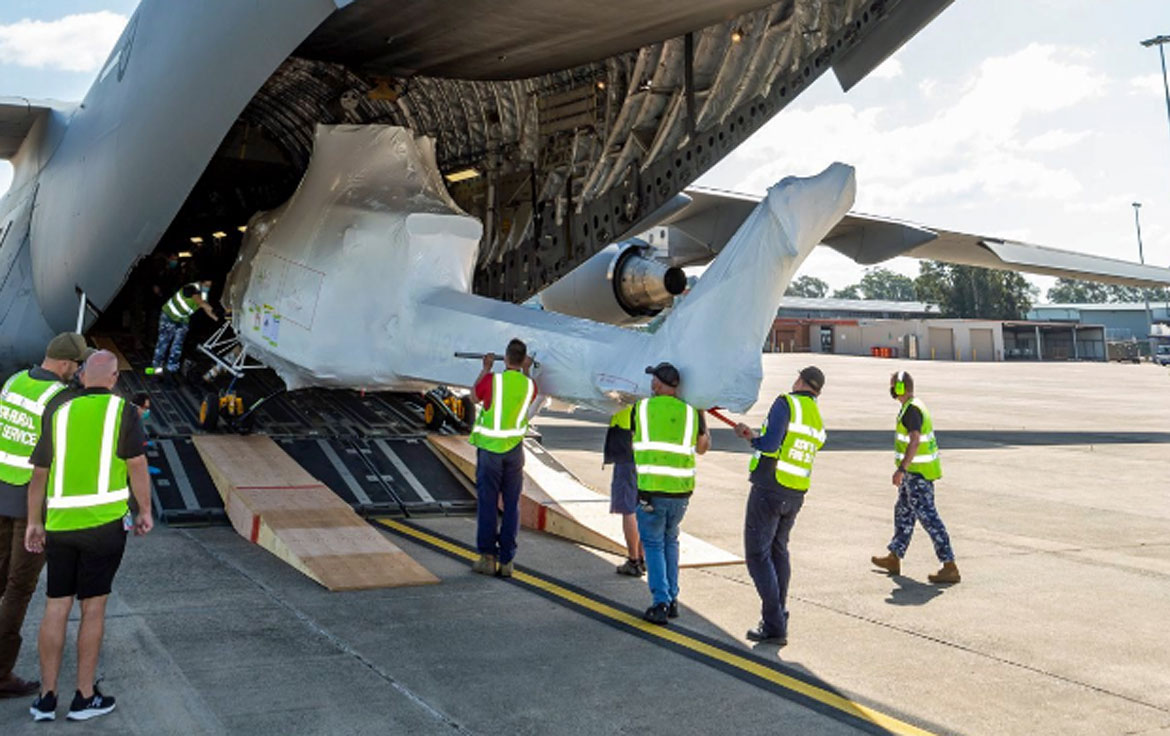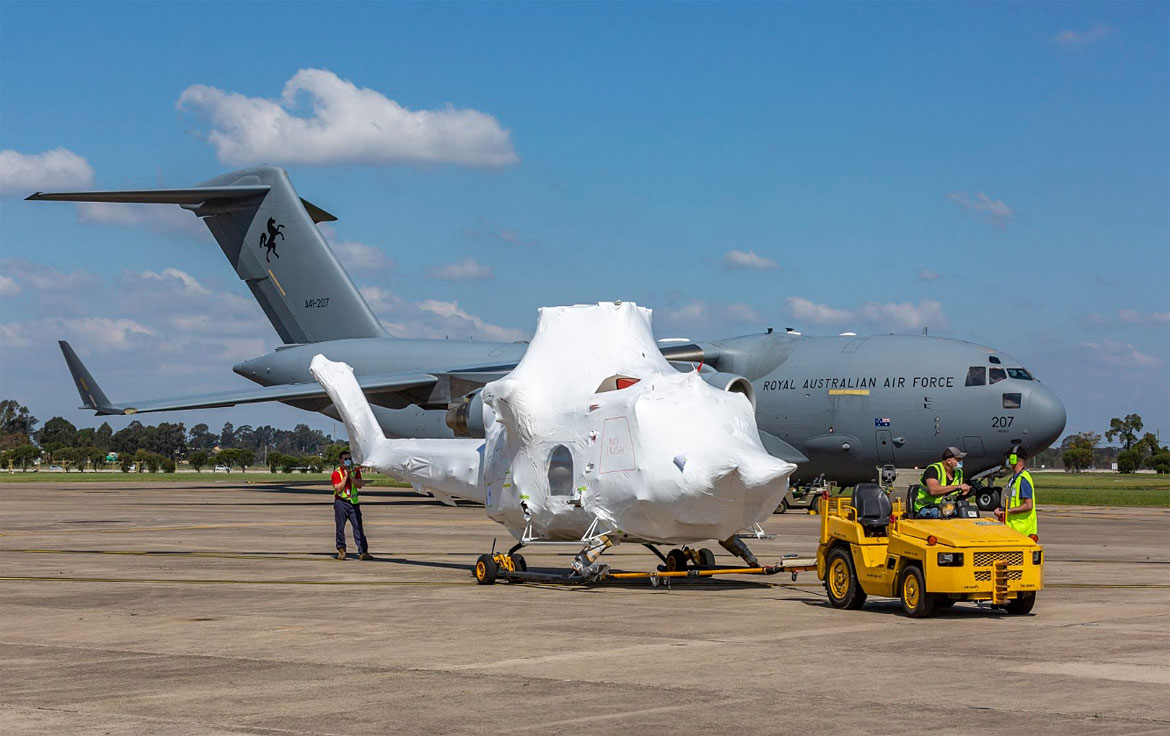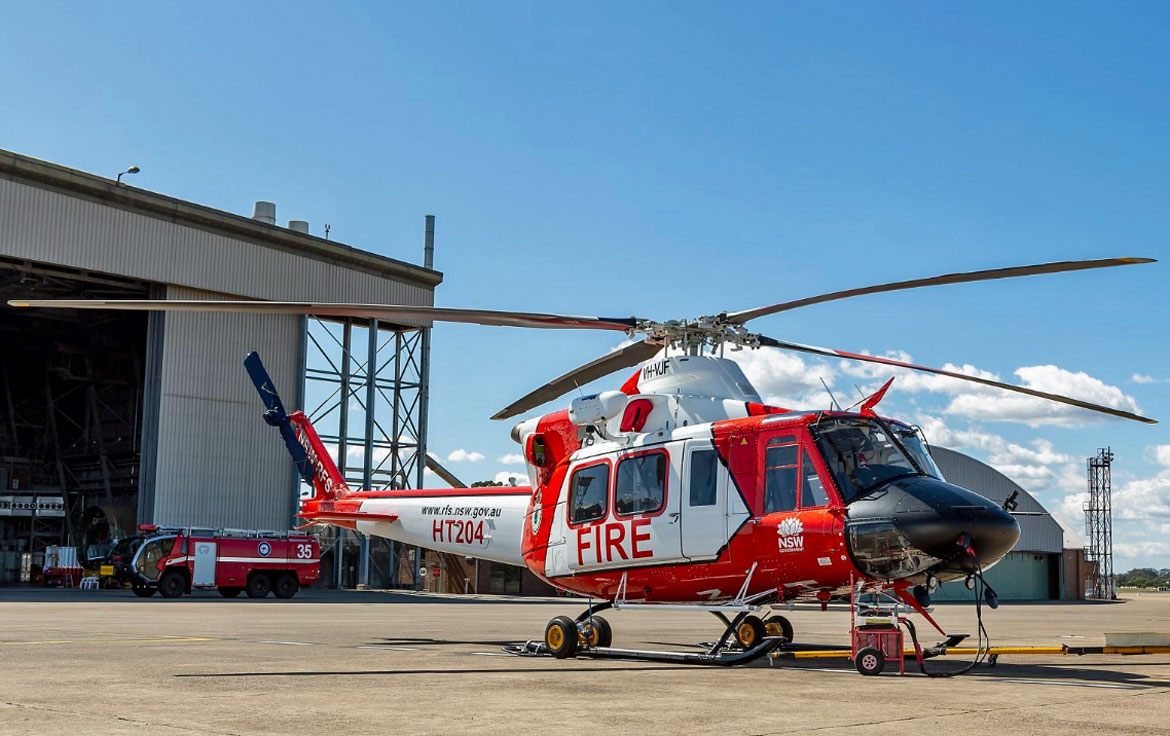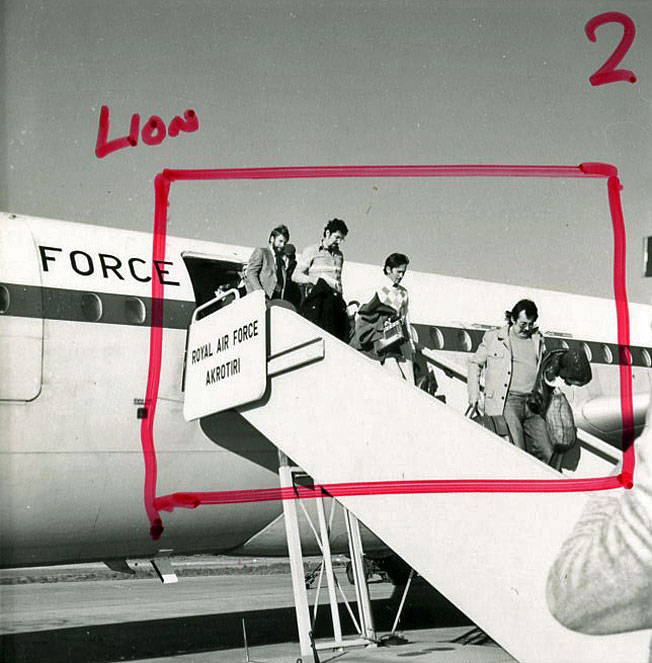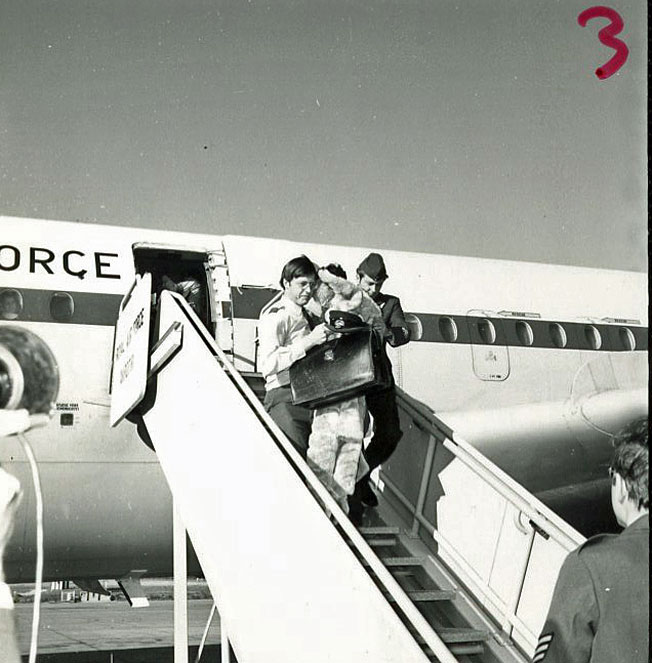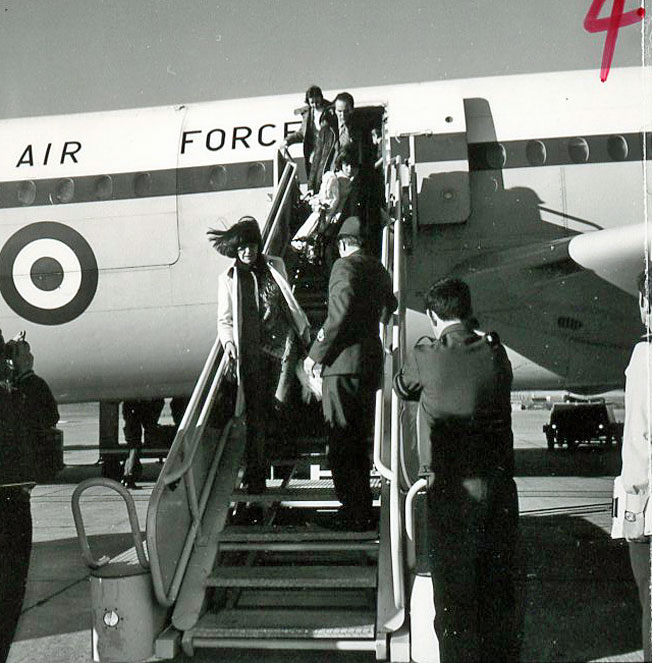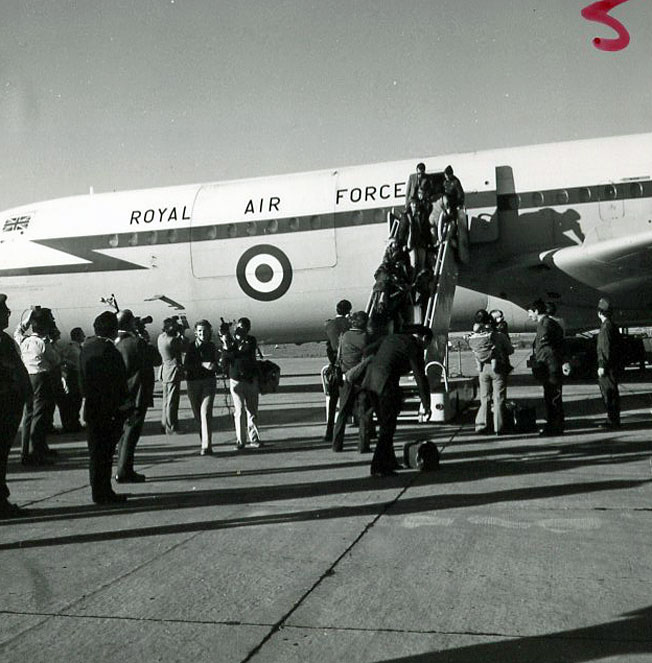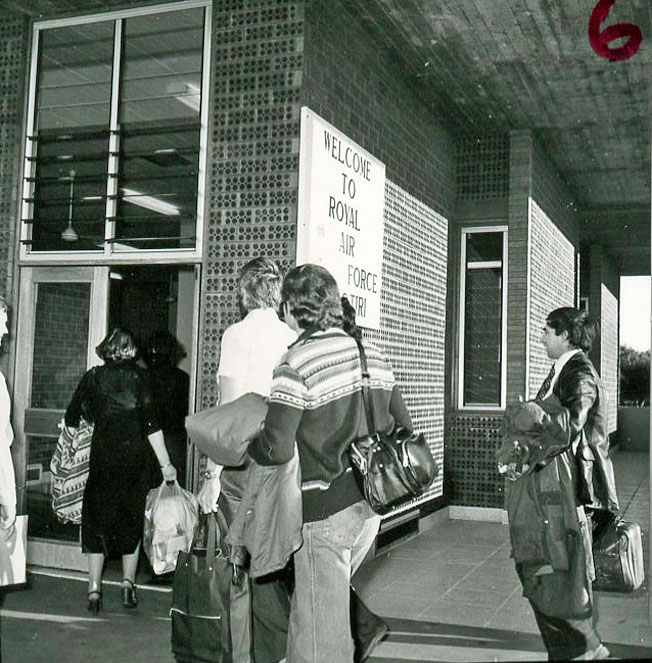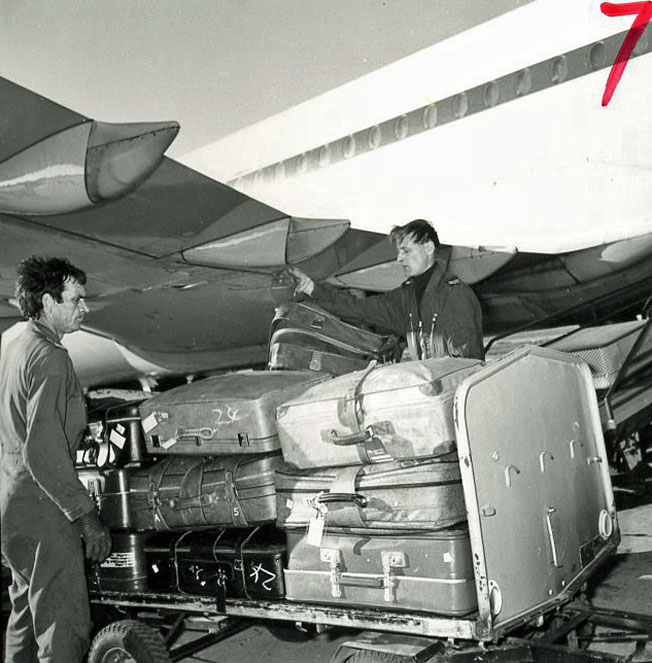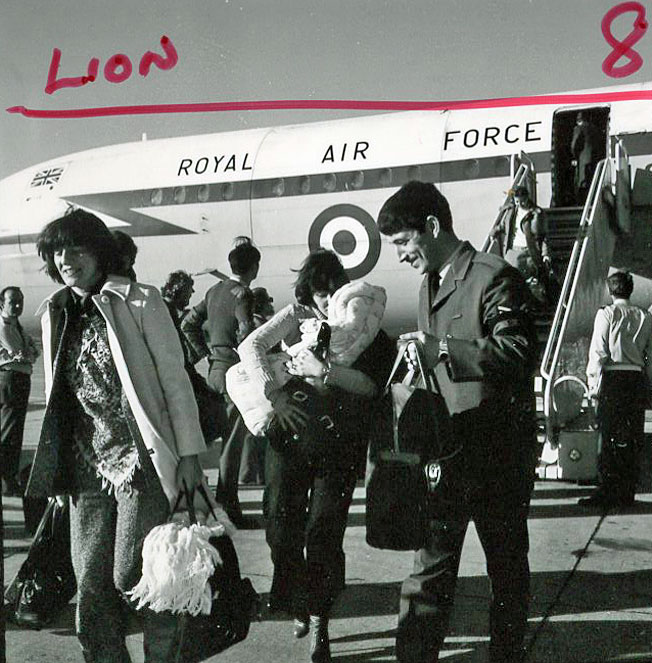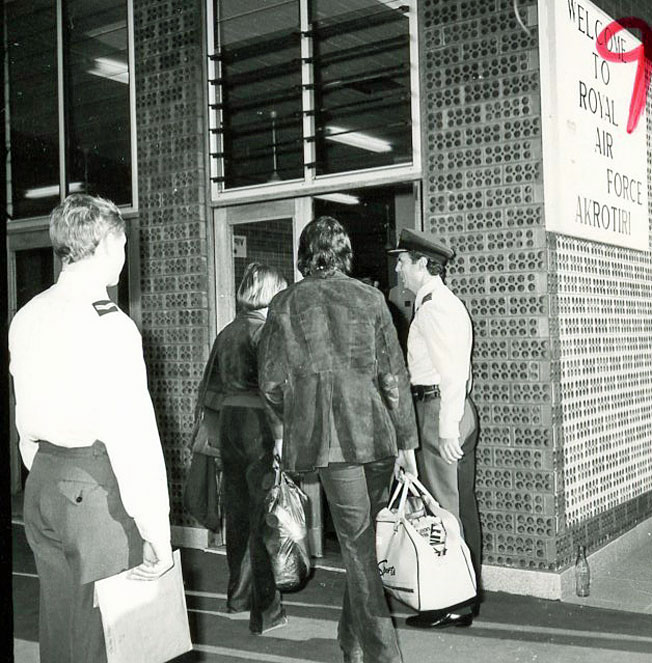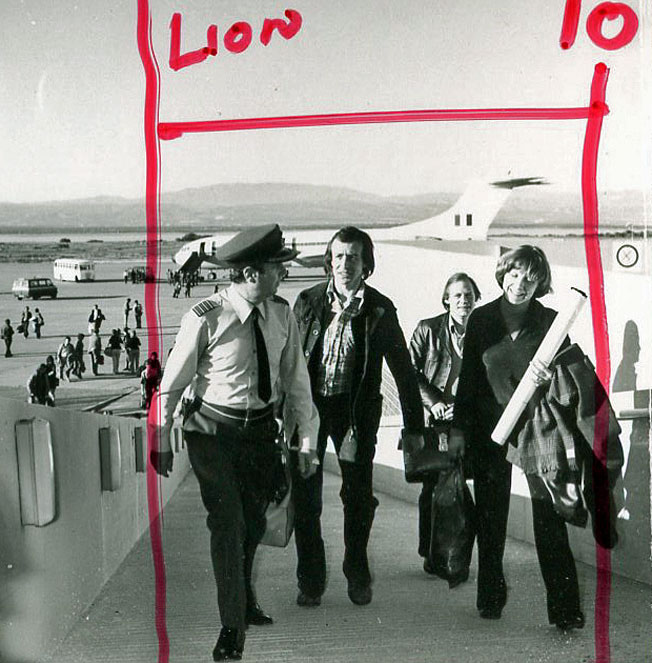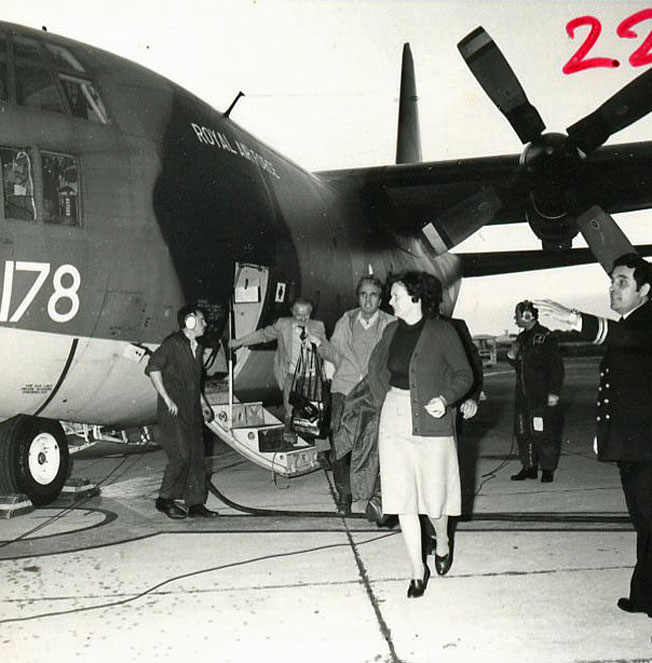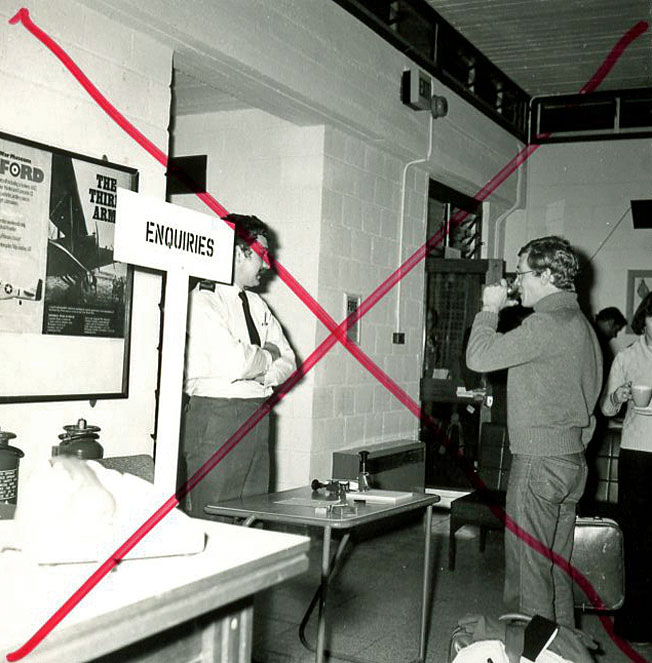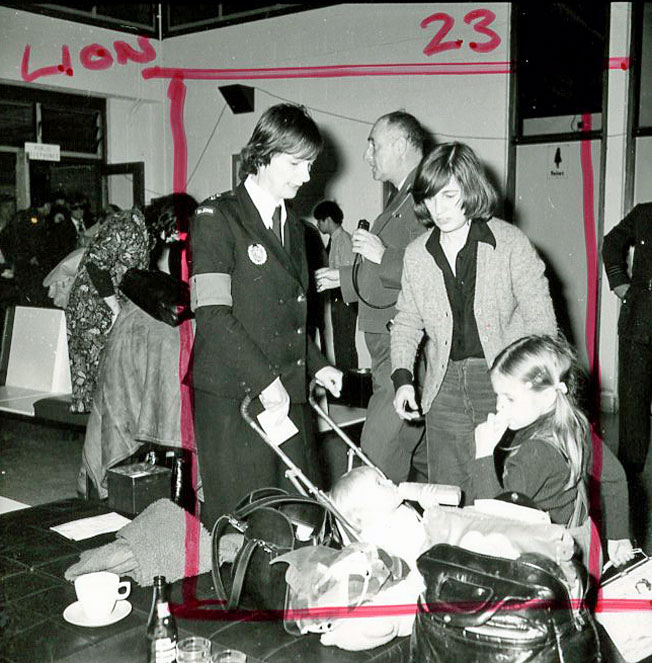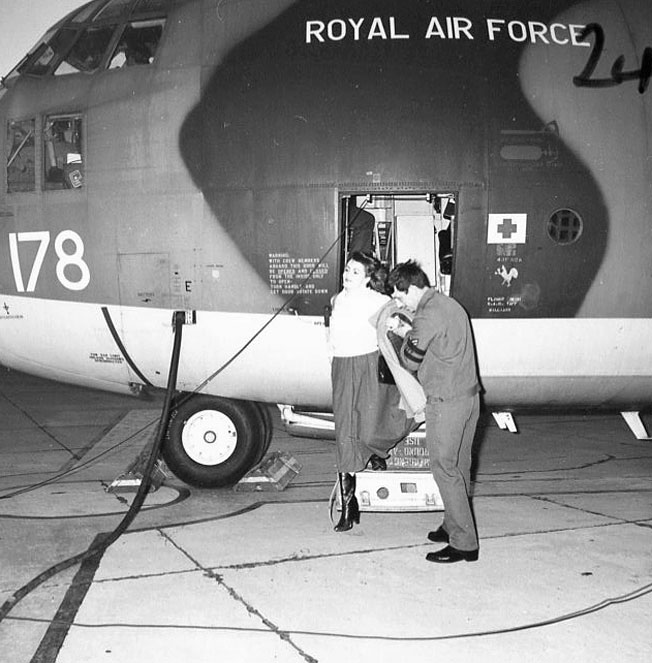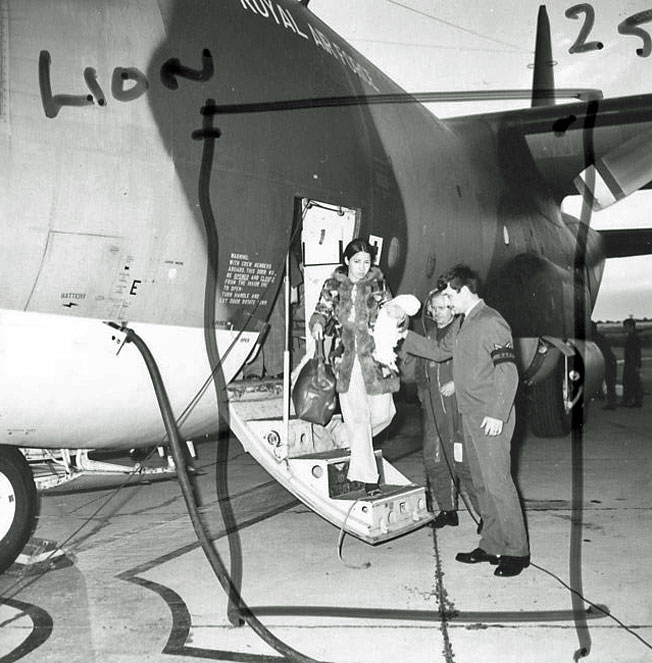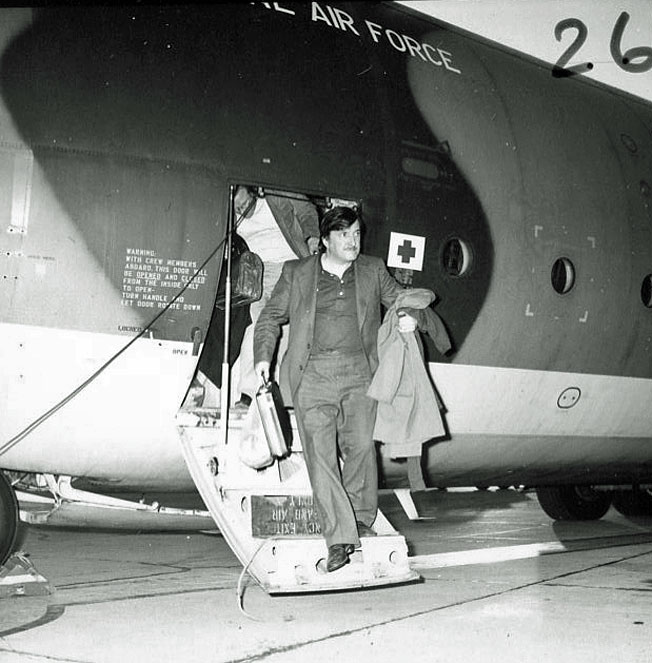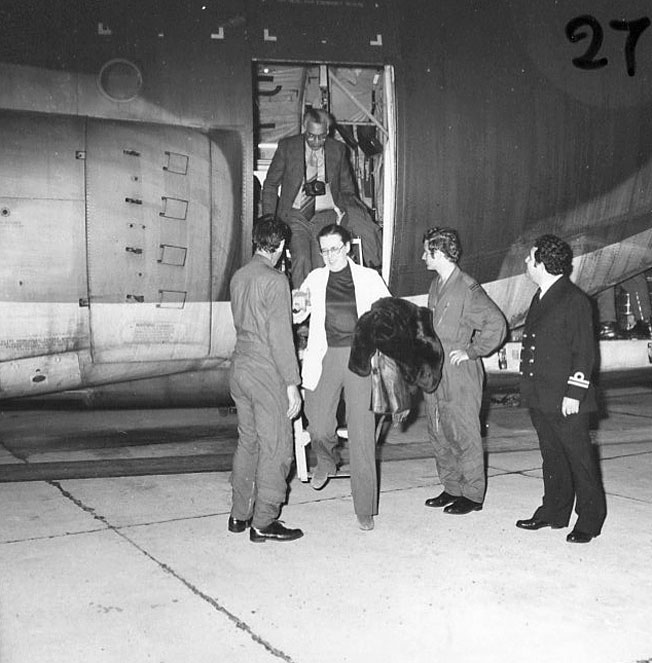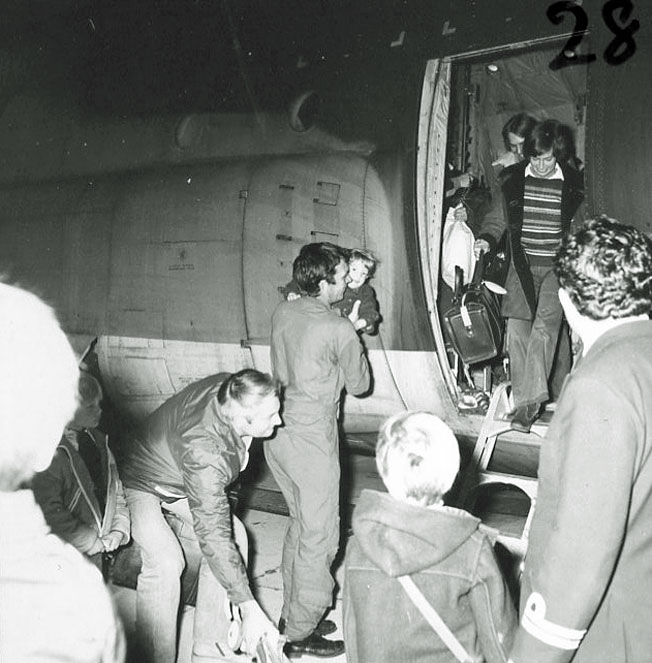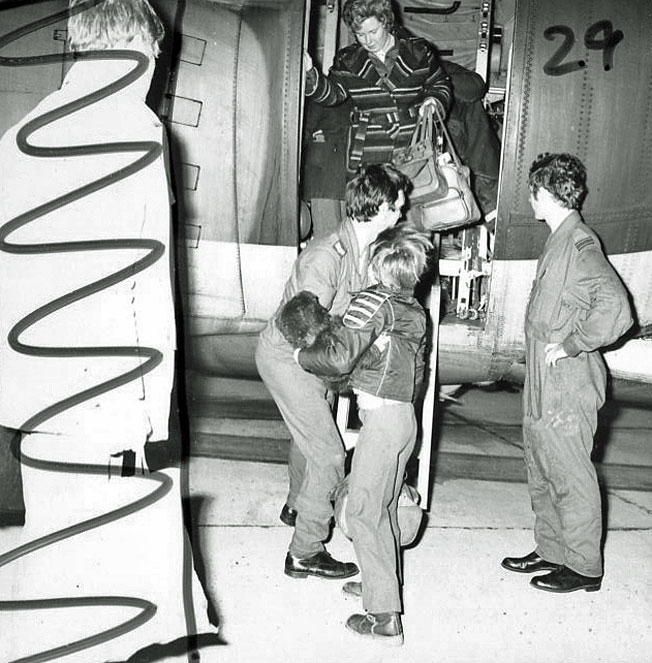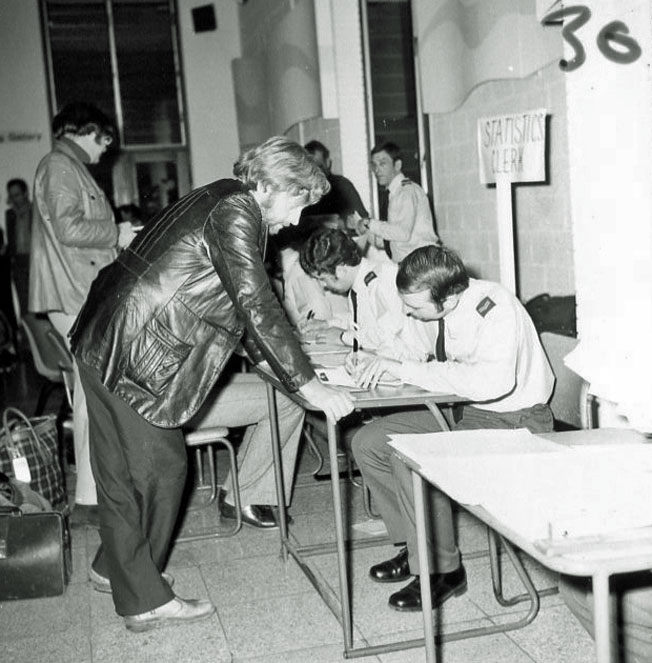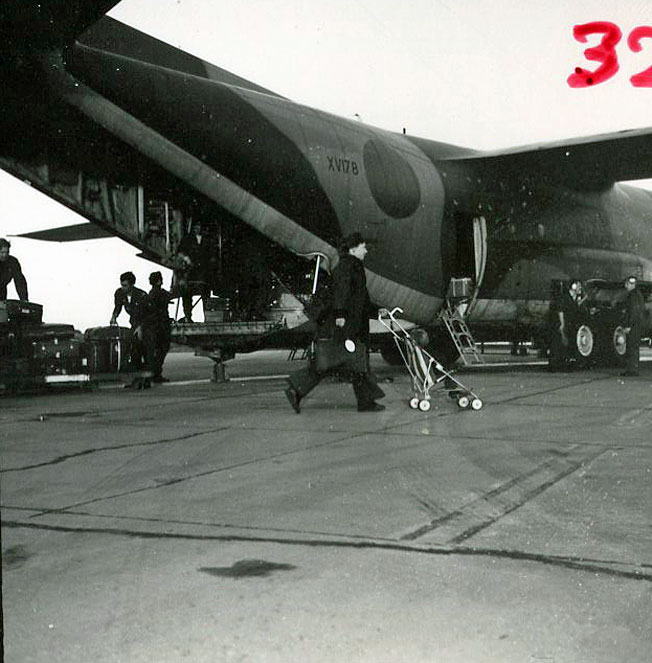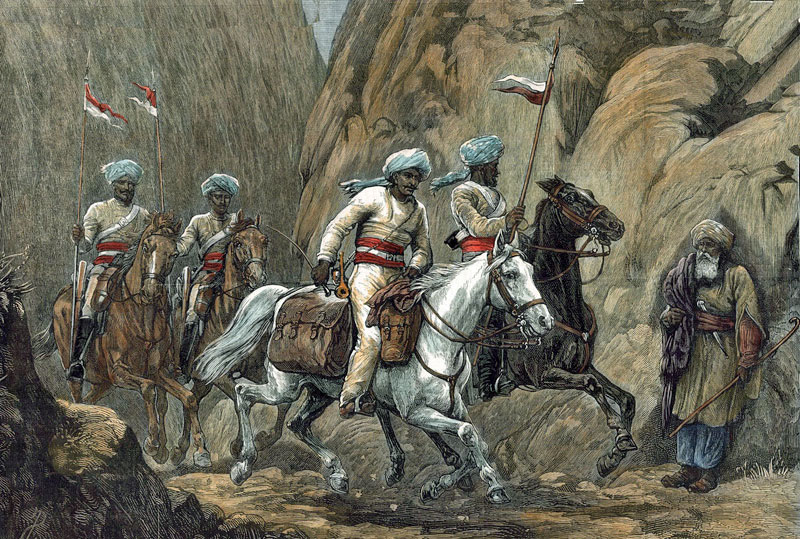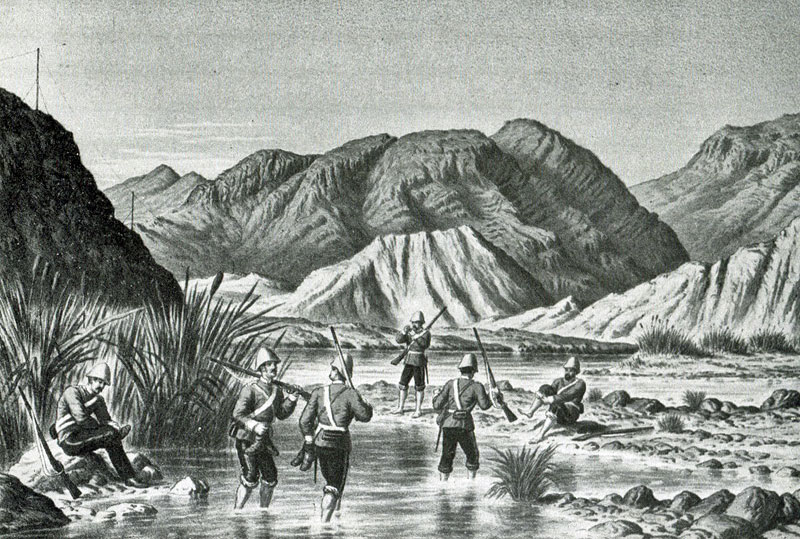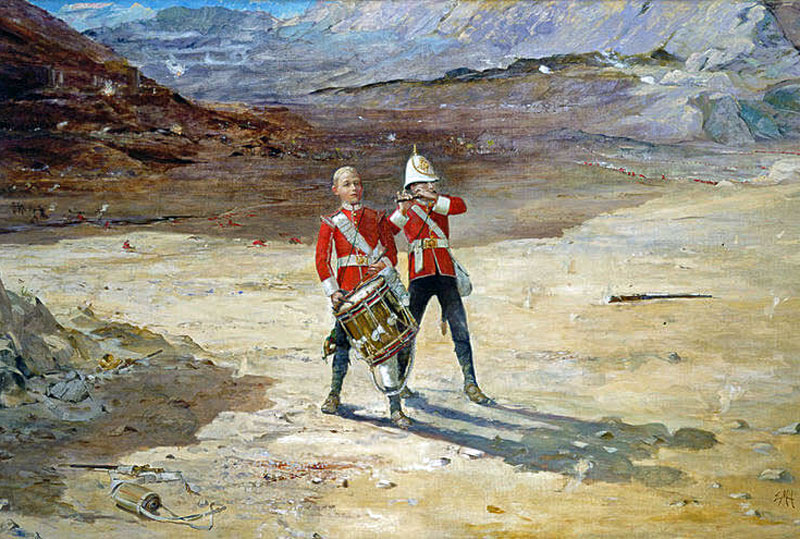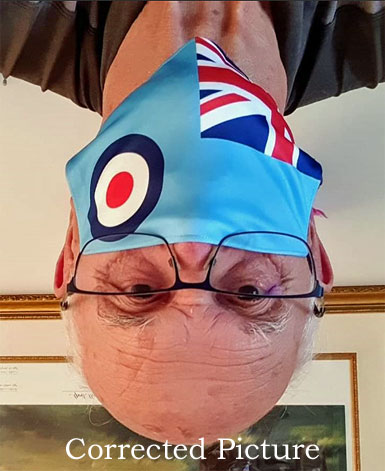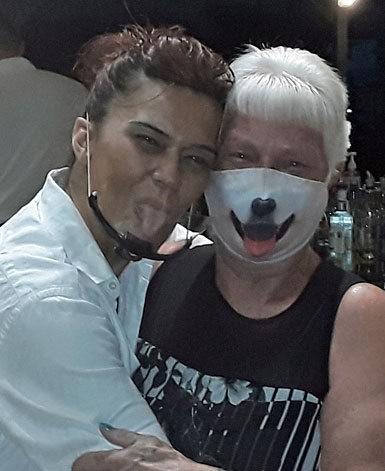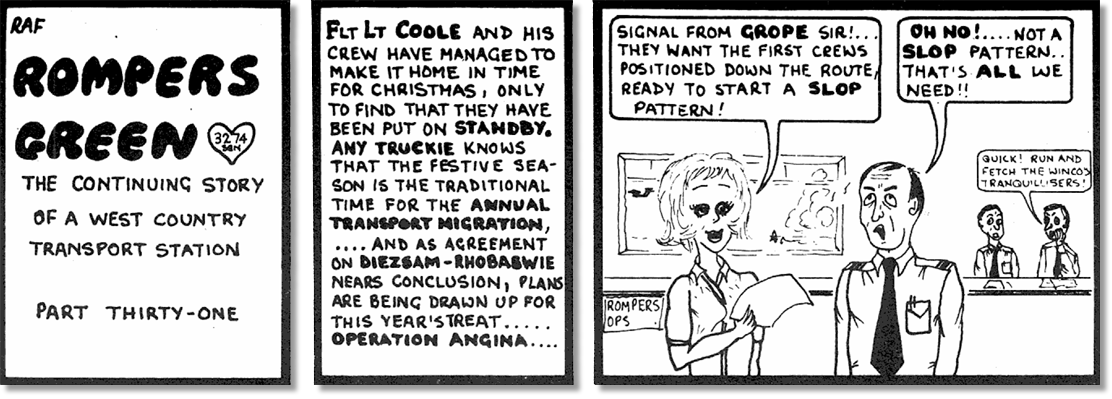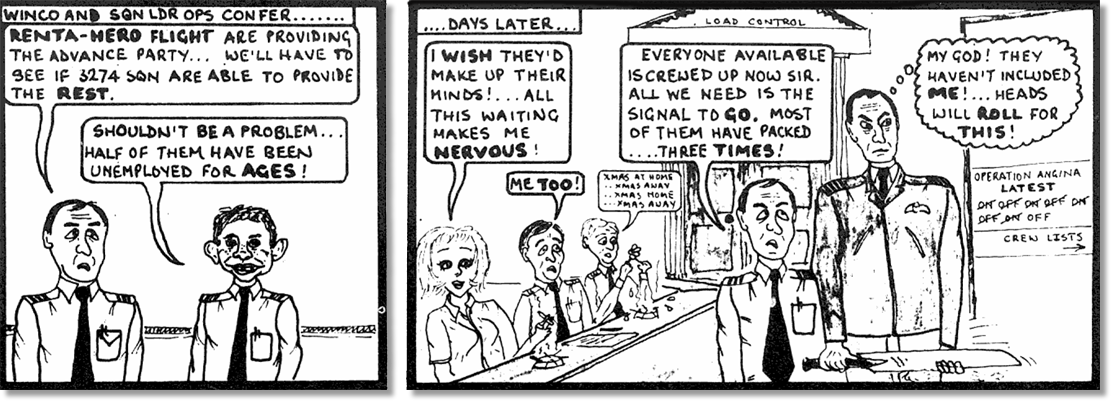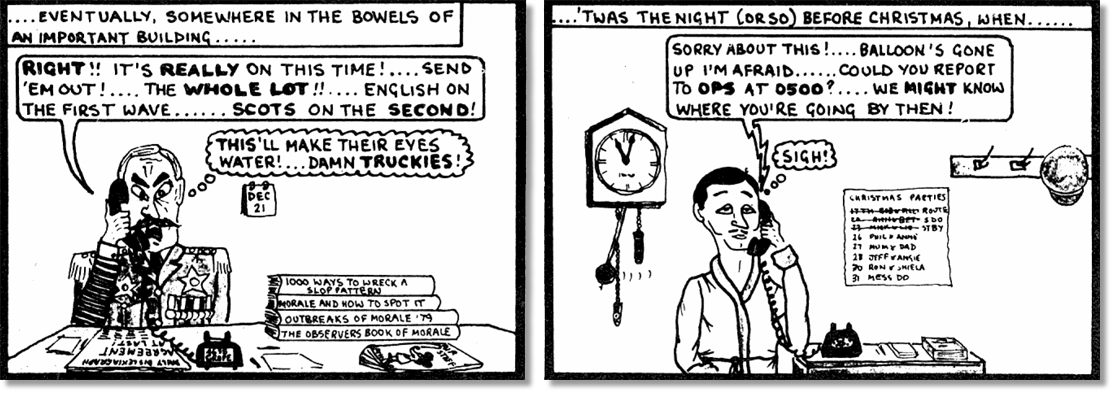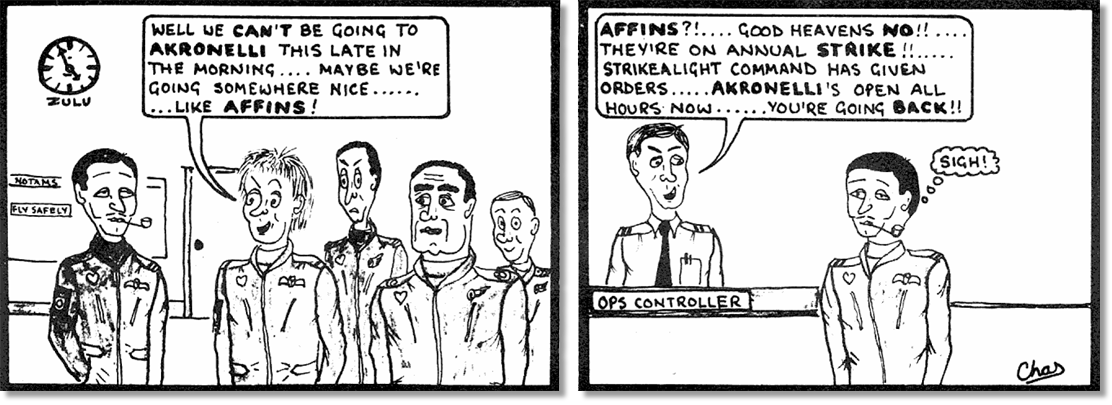For the third time in 78 years, Sarajevo has been the focus of world attention. June 1914 saw Hapsburg Archduke Franz Ferdinand assassinated in Sarajevo; the event which triggered the crisis leading up to the First World War. February 1984 saw Sarajevo host the Winter Olympic Games and in June 1992, war torn and distraught after three months of bombardment by Serbian, Moslem Slav and Croatian forces, Sarajevo became the subject of a United Nations co-ordinated effort to airlift in humanitarian aid for its desperate in habitants.
In response to the UN appeal for airlift, one C130 Mk1 supported by one UKMAMS team, TCW (Tactical Communications Wing) and ATSy (Air transport Security) was put on immediate standby waiting for the RAF involvement to begin.
The green light finally came 72 hours later on July 2nd when, having been bade farewell by Armed forces minister, Mr Archie Hamilton MP, we departed Lyneham with our payload of press, compo rations and a MAMS Landrover; Operation Cheshire had begun.
As with all other flights in the relief effort, the aircraft first flew to a UN staging area at Zagreb airport in Croatia, where a UN High Commissioner for Refugees (UNHCR) representative inspected our cargo. Although our cargo was desperately needed in Sarajevo, urgent medical supplies and Croatian ration packs were already on hand at Zagreb when we arrived and these afforded an even higher priority than ours. Because we were the first nation to provide airlift from Zagreb the responsibility for moving this urgent consignment fell to us and, in order to make room for it, 12,000 lbs of British compo rations had to be offloaded – a tiring job on a flat floor aircraft! Eventually with the aircraft reloaded, refuelled and prepared for the following morning’s mercy flight to Sarajevo, we locked up and departed for the hotel. The detachment hotel turned out to be two 12 x 12 tents located in the corner of a dirty, mosquito infested hangar shared with several pigeons, four twin engine light aircraft and a stray dog named “Rabies”. The Mobile RAFLO was more fortunate, his room was a cupboard. The operating crew fared even better they had a boiler room . Nevertheless the accommodation was dry and, for the short term, proved adequate until we were able to find something more permanent.
XV196 left Zagreb for Sarajevo for the first time on July 3rd at 0445 hrs GMT. Unsure of the welcome we would receive, as a precautionary measure all crew members were armed, wore flak jackets and carried UN blue berets. Exposure to ground fire was considered a significant risk and in order to avoid Serbian SAM sites our route took us South along the Adriatic coastline to Split and then across the mountains to Sarajevo Airport which nestles in a bowl of mountains 1700 feet above sea level; the flying time was one hour ten minutes. Our approach into the airport was high and steep because even though the warring factions had agreed to allow mercy flights to operate, mortar activity and fire from rogue snipers was commonplace.
In response to the UN appeal for airlift, one C130 Mk1 supported by one UKMAMS team, TCW (Tactical Communications Wing) and ATSy (Air transport Security) was put on immediate standby waiting for the RAF involvement to begin.
The green light finally came 72 hours later on July 2nd when, having been bade farewell by Armed forces minister, Mr Archie Hamilton MP, we departed Lyneham with our payload of press, compo rations and a MAMS Landrover; Operation Cheshire had begun.
As with all other flights in the relief effort, the aircraft first flew to a UN staging area at Zagreb airport in Croatia, where a UN High Commissioner for Refugees (UNHCR) representative inspected our cargo. Although our cargo was desperately needed in Sarajevo, urgent medical supplies and Croatian ration packs were already on hand at Zagreb when we arrived and these afforded an even higher priority than ours. Because we were the first nation to provide airlift from Zagreb the responsibility for moving this urgent consignment fell to us and, in order to make room for it, 12,000 lbs of British compo rations had to be offloaded – a tiring job on a flat floor aircraft! Eventually with the aircraft reloaded, refuelled and prepared for the following morning’s mercy flight to Sarajevo, we locked up and departed for the hotel. The detachment hotel turned out to be two 12 x 12 tents located in the corner of a dirty, mosquito infested hangar shared with several pigeons, four twin engine light aircraft and a stray dog named “Rabies”. The Mobile RAFLO was more fortunate, his room was a cupboard. The operating crew fared even better they had a boiler room . Nevertheless the accommodation was dry and, for the short term, proved adequate until we were able to find something more permanent.
XV196 left Zagreb for Sarajevo for the first time on July 3rd at 0445 hrs GMT. Unsure of the welcome we would receive, as a precautionary measure all crew members were armed, wore flak jackets and carried UN blue berets. Exposure to ground fire was considered a significant risk and in order to avoid Serbian SAM sites our route took us South along the Adriatic coastline to Split and then across the mountains to Sarajevo Airport which nestles in a bowl of mountains 1700 feet above sea level; the flying time was one hour ten minutes. Our approach into the airport was high and steep because even though the warring factions had agreed to allow mercy flights to operate, mortar activity and fire from rogue snipers was commonplace.
Operation Cheshire – Yugotours with a Difference
by Flt Lt Mike Cumberland, UKMAMS
With ramp and cargo doors open we taxied to our parking slot. Immediately on chox the first truck was marshalled to the rear of the Hercules and we began offloading, our objective to offload and get airborne as quickly as possible. During the turn round small arms and heavy machine gun fire was clearly audible coming mainly from the hotly contested Dobrinja area adjacent to the terminal. Behind us the terminal buildings had been peppered with bullet holes, the majority of windows were shattered and some buildings were showing signs of structural damage.
Following a brief chat with BBC’s Martin Bell we departed for Zagreb to reload and return. Three sorties were completed on July 3rd in which a total of 80,000 lbs of medicine, compo rations and UNHCR emergency parcels which contained corned beef, mackerel, vegetable oil, washing powder and soap were moved.
Over the next three days, eight sorties were completed, each sortie a flat floor load of boxes the size of 10 man ration packs; by the end of the third day, one Hercules and one MAMS team assisted by the crew had moved 250,000 lbs of humanitarian aid. Aid convoys arriving at Zagreb were increasing in frequency and fortunately on July 5th a much needed set of roller and side guidance was flown in from Lyneham. XV196 was re-rolled to 108 inch side guidance and immediately loaded with four pallets of American “Meals Ready to Eat” (MRE) weighing 38,400 lbs. As a result of palletisation, load times were reduced to 15 minutes and offloads at Sarajevo to less than eight minutes as we moved pallet after pallet of MRE’s, sugar, yeast, flour, feta cheese, baby food and family parcels, all built on the UKMAMS production line.
As time progressed more nations became involved and the airlift gathered momentum. With British, German, Canadian and Norwegian movements teams preparing the loads and airlift provided by the Air Forces of Canada, Denmark, Italy, USA, Germany, CIS, Holland, Turkey, France, Greece, Sweden, Norway, Kuwait and ourselves, the UN effort was of true International magnitude. By July 10th a total of 20 sorties were being flown daily into Sarajevo whose 380,000 inhabitants were estimated to need 190 tons of food a day.
At the time of my departure on July 18th the RAF detachment had completed 39 sorties and moved a total of 1,350,000 lbs of humanitarian aid. By the time these words are read, twice as many sorties will have been flown and over 2,000,000 lbs of aid will have been airlifted by the RAF into the beleaguered city. The International airlift is currently Sarajevo’s only lifeline and seems certain to continue until a ground corridor is opened. Although tentative arrangements are underway it seems unlikely this will occur in the near future and until this happens, Operation Cheshire will continue.
In 1993 the RAF detachment relocated to Ancona in Italy and continued daily sorties to Sarajevo until July 1996. The main reason for the relocation from Zagreb was hostility from many locals, acts of sabotage and the risk of assault especially to the French Forces!
When Operation Cheshire ended, the RAF had flown just short of 2,000 sorties and delivered 27,000 tons of humanitarian aid.
Following a brief chat with BBC’s Martin Bell we departed for Zagreb to reload and return. Three sorties were completed on July 3rd in which a total of 80,000 lbs of medicine, compo rations and UNHCR emergency parcels which contained corned beef, mackerel, vegetable oil, washing powder and soap were moved.
Over the next three days, eight sorties were completed, each sortie a flat floor load of boxes the size of 10 man ration packs; by the end of the third day, one Hercules and one MAMS team assisted by the crew had moved 250,000 lbs of humanitarian aid. Aid convoys arriving at Zagreb were increasing in frequency and fortunately on July 5th a much needed set of roller and side guidance was flown in from Lyneham. XV196 was re-rolled to 108 inch side guidance and immediately loaded with four pallets of American “Meals Ready to Eat” (MRE) weighing 38,400 lbs. As a result of palletisation, load times were reduced to 15 minutes and offloads at Sarajevo to less than eight minutes as we moved pallet after pallet of MRE’s, sugar, yeast, flour, feta cheese, baby food and family parcels, all built on the UKMAMS production line.
As time progressed more nations became involved and the airlift gathered momentum. With British, German, Canadian and Norwegian movements teams preparing the loads and airlift provided by the Air Forces of Canada, Denmark, Italy, USA, Germany, CIS, Holland, Turkey, France, Greece, Sweden, Norway, Kuwait and ourselves, the UN effort was of true International magnitude. By July 10th a total of 20 sorties were being flown daily into Sarajevo whose 380,000 inhabitants were estimated to need 190 tons of food a day.
At the time of my departure on July 18th the RAF detachment had completed 39 sorties and moved a total of 1,350,000 lbs of humanitarian aid. By the time these words are read, twice as many sorties will have been flown and over 2,000,000 lbs of aid will have been airlifted by the RAF into the beleaguered city. The International airlift is currently Sarajevo’s only lifeline and seems certain to continue until a ground corridor is opened. Although tentative arrangements are underway it seems unlikely this will occur in the near future and until this happens, Operation Cheshire will continue.
In 1993 the RAF detachment relocated to Ancona in Italy and continued daily sorties to Sarajevo until July 1996. The main reason for the relocation from Zagreb was hostility from many locals, acts of sabotage and the risk of assault especially to the French Forces!
When Operation Cheshire ended, the RAF had flown just short of 2,000 sorties and delivered 27,000 tons of humanitarian aid.
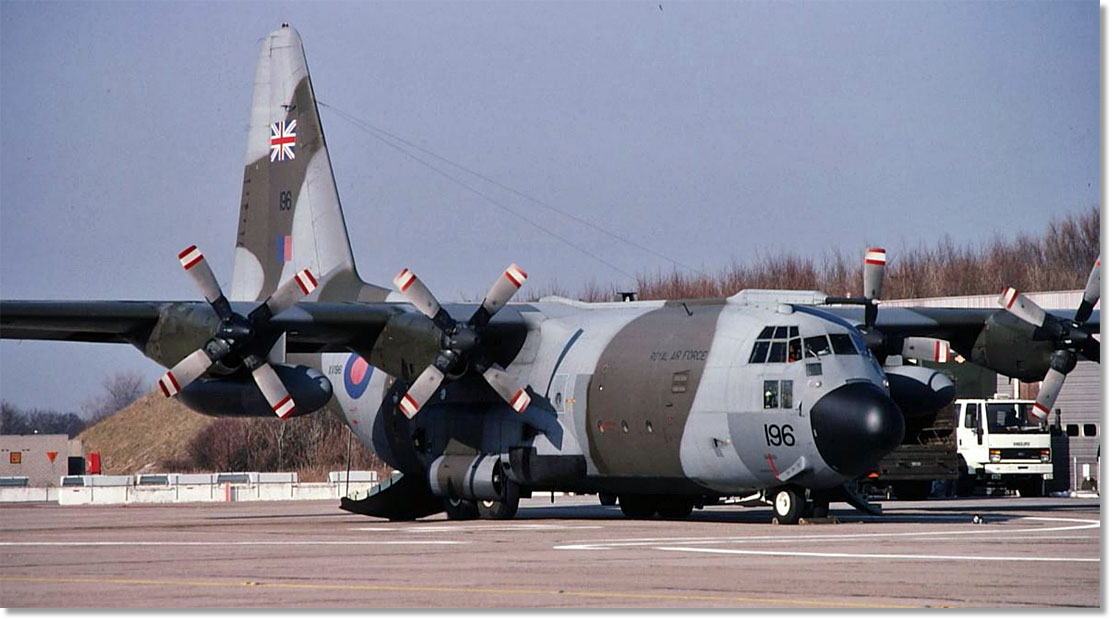
XV196 left Zagreb for Sarajevo for the first time on July 3rd, 1992
Khe San (Space Shuttle) approach into Sarajevo
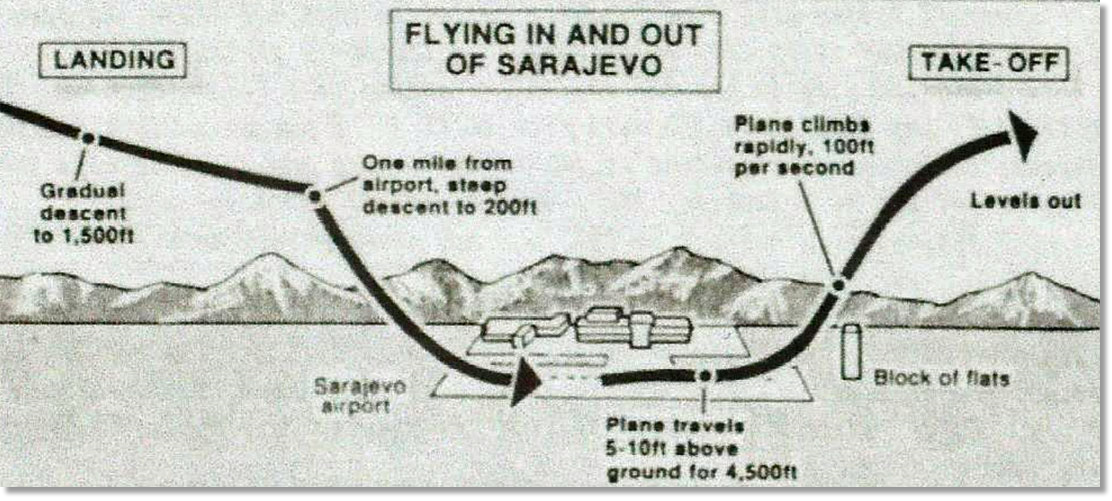
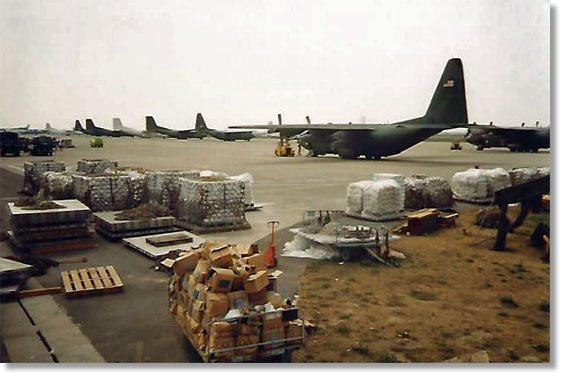
Where's your helmet?
A truly international effort




From: Stephen Tomlinson, Tenerife, QLD
Subject: UKMAMS OBA OBB #093020
G'day Tony,
Good to see you back up-and-running! Just a quick comment for Kepler Aerospace if they get some of the VC-10's back in the air? Please give them a "wicked" paint job, they are a stylishly beautiful aircraft design and deserve it. Further, consider re-christening them with their original RAF Victoria Cross holders' names. Fingers-crossed to see them flying again.
Cheers!
Steve
Subject: UKMAMS OBA OBB #093020
G'day Tony,
Good to see you back up-and-running! Just a quick comment for Kepler Aerospace if they get some of the VC-10's back in the air? Please give them a "wicked" paint job, they are a stylishly beautiful aircraft design and deserve it. Further, consider re-christening them with their original RAF Victoria Cross holders' names. Fingers-crossed to see them flying again.
Cheers!
Steve

From: Tony Street, Buffalo, NY
Subject: Re: UKMAMS OBA OBB #093020
Tony,
Regarding the RCAF's new CC295 Kingfisher aircraft.
Back in the day, when I worked for Metric Systems in Ft. Walton Beach FL, myself and five others were sent to Madrid, Spain, where we were contracted by CASA (now part of Airbus).
Our job was to certify the CC295 for all methods of aerial delivery, including LAPES. A fun month.
Regards
Tony
Subject: Re: UKMAMS OBA OBB #093020
Tony,
Regarding the RCAF's new CC295 Kingfisher aircraft.
Back in the day, when I worked for Metric Systems in Ft. Walton Beach FL, myself and five others were sent to Madrid, Spain, where we were contracted by CASA (now part of Airbus).
Our job was to certify the CC295 for all methods of aerial delivery, including LAPES. A fun month.
Regards
Tony


Timorese students repatriated home on RNZAF flight
A group of students has today (7th October) been repatriated to Timor-Leste after they were stranded in New Zealand by the COVID-19 pandemic. About 30 students were among passengers on a Royal New Zealand Air Force C-130H Hercules flight to Dili. The New Zealand Defence Force has been working with the New Zealand Ministry of Foreign Affairs and Trade and the Government of Timor-Leste to get the students home. They had been studying at universities and training institutions in New Zealand but have been unable to return home due to the unavailability of commercial passenger flights.
Two staff from non-government organisations Blue Ventures and HANDS Programme were also on the flight. In addition, the flight carried medical supplies including personal protective equipment.
The passengers will undergo 14 days’ managed isolation on arrival in Dili to meet Timor-Leste government requirements.
Air Component Commander Air Commodore Tim Walshe says the RNZAF had carried out a number of repatriation flights to support Pacific neighbours seeking help in getting their citizens home. This included eight flights in June returning more than 1000 Vanuatu nationals, including Recognised Seasonal Employer workers, who had been unable to return home due to the cancellation of commercial flights.
nzdf.co.nz
Two staff from non-government organisations Blue Ventures and HANDS Programme were also on the flight. In addition, the flight carried medical supplies including personal protective equipment.
The passengers will undergo 14 days’ managed isolation on arrival in Dili to meet Timor-Leste government requirements.
Air Component Commander Air Commodore Tim Walshe says the RNZAF had carried out a number of repatriation flights to support Pacific neighbours seeking help in getting their citizens home. This included eight flights in June returning more than 1000 Vanuatu nationals, including Recognised Seasonal Employer workers, who had been unable to return home due to the cancellation of commercial flights.
nzdf.co.nz
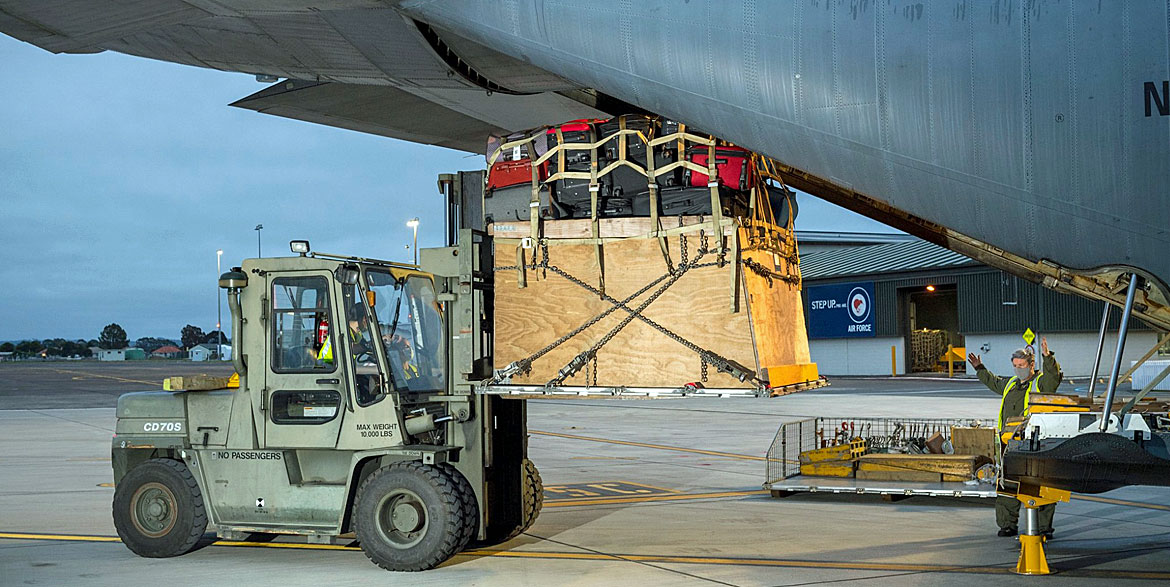
From: Tim James, Boston, Lincs
Escape from Iran
Preamble - I was born in 1961, and in 1965 my dad died in a road accident. Shortly afterwards my younger brother was born. In 1968 my mum remarried and I gained a stepfather along with an older stepbrother and stepsister. I’ll just refer to him as my dad for ease. My dad was in the army, so we moved to Germany (BAOR - British Army of the Rhine), but in 1970 at the age of 9, I found myself in boarding school back in the UK. Three times a year I would fly from Luton to Gütersloh for school holidays. In 1976 my dad finished his time in the army and within a few months had secured an accompanied ex-pat role in Iran. I was 15. He was working for the Shah’s government in a military training school located in Masjed-I-Suleiman (known as MIS). As I was still in boarding school, all that changed was my route home for school holidays, instead of going to Germany I was flying unaccompanied from Heathrow to Abadan. And so, on to the main part of the story.
The main story - The content of this story comes from three sources; firstly, my own memories, some of which are clear as day and others which are a little more cloudy; secondly, snippets gained from my mother, some of them only very recently; thirdly, snippets from others who were there, which I collected at the time and stored away in my head forever.
The photos from Iran were all taken by my dad and are, to my knowledge, the only ones in existence.
It was December 1978 and I was 17 years old. My family was living in Iran in a place called Masjed-I Suleiman (known as MIS) in Khuzestan province. MIS is located about 130km east of the border with Iraq, about 450km south west of Tehran and about 200km north east of Abadan which is at the north end of the Persian Gulf.
My dad was working for the Shah’s government in a technical military training school that was based upon the two REME technical training schools in the UK, Bordon and Arborfield.
Also located in MIS was an American company called BMY (Bowen McLaughlin York) who operated a tank repair facility. We all lived in a joint British-US community called Naftak just a few miles outside of MIS.
The photos from Iran were all taken by my dad and are, to my knowledge, the only ones in existence.
It was December 1978 and I was 17 years old. My family was living in Iran in a place called Masjed-I Suleiman (known as MIS) in Khuzestan province. MIS is located about 130km east of the border with Iraq, about 450km south west of Tehran and about 200km north east of Abadan which is at the north end of the Persian Gulf.
My dad was working for the Shah’s government in a technical military training school that was based upon the two REME technical training schools in the UK, Bordon and Arborfield.
Also located in MIS was an American company called BMY (Bowen McLaughlin York) who operated a tank repair facility. We all lived in a joint British-US community called Naftak just a few miles outside of MIS.
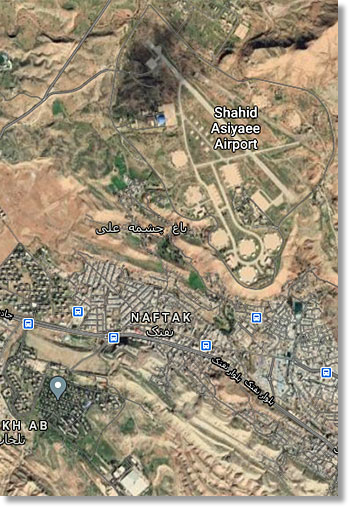
It's fair to say that life in Iran was rather different than the UK. We had a very nice large stone bungalow and we had a car, but no TV. Contact with the outside world was via the BBC World Service on a short-wave radio and newspapers that were at least a week old. We never heard BBC World Service news broadcasts because rather strangely there was always some loud interference on the radio whenever the news began, but other programmes were unaffected. Parts of the newspapers were usually overprinted with solid black rectangles to block out certain news stories. Welcome to the world of Iranian censorship.
As a result of this, most of the Naftak community knew absolutely nothing of the Islamic Revolution that had been developing over the preceding months. In boarding school I also saw very little of TV or newspapers, they did their best to ensure we were shielded from such distracting influences regardless of what was going on around the world, but I still saw some reports of the growing troubles in Iran.
Whenever I flew to Iran for school holidays from boarding school in the UK, it was usual for my mum to travel the 250km journey to the airport in a car with a company driver, to collect me and travel the 250km back again. It was also usual, if not extremely risky, for my relatives in the UK to stash a few uncensored newspapers in my suitcase. The likely consequences of being caught are quite unthinkable. On this occasion, my parents had been told that my dad would have to collect me instead. They asked why but were not told. It wasn’t for discussion, my mum had to stay at home.
I found out only recently that my parents had pre-ordered some Omega watches as Christmas presents from a shop in Abadan, so when my dad asked the driver to take him to the shop he said “No sir, we cannot”. My dad insisted and was taken to the shop. It was here that the first signs of trouble became apparent. The shopkeeper lifted the shutter, said “I’m glad you could make it”, handed over the watches and slammed the shutter. Very odd indeed. On the journey home I told my dad all that I knew. Everything I had seen on the news. The rioting and violence in Tehran, Isfahan and other cities - the arrests and the shootings - he was stunned. Why on earth had the company made arrangements to send kids in boarding schools home for Christmas and into an Islamic revolution? We arrived home and he got the newspapers out. He took them into the company offices and played hell with the management. They just accused him of causing trouble.
Over the following weeks, life began to change as rioting and violence took hold in MIS, however, it wasn’t until after Christmas that a plan to leave the country began to form. We all had a very good relationship with the local commanding officer of the Iranian army garrison but in January he said that it was becoming increasingly difficult to protect the British and American citizens, even from his own soldiers. He suggested that we should leave the country without delay. Now I’m unsure how exactly we found out about the two RAF C-130 aircraft based in Bahrain, nor how they were contacted. A vague story was heard that some of the British instructors in the telecommunications wing of the school had rigged some HF equipment and managed to talk to the aircraft crew, but I have no details. It may be untrue. My dad and our neighbour took a car in the evening to recce the local roads. They found the road out towards Ahvaz and Abadan was blocked, it was the same with the other routes out of town, but the road up to the local airport [Shahid Asiyaee] was clear. This was an almost completed new military airfield alongside the old airfield
As a result of this, most of the Naftak community knew absolutely nothing of the Islamic Revolution that had been developing over the preceding months. In boarding school I also saw very little of TV or newspapers, they did their best to ensure we were shielded from such distracting influences regardless of what was going on around the world, but I still saw some reports of the growing troubles in Iran.
Whenever I flew to Iran for school holidays from boarding school in the UK, it was usual for my mum to travel the 250km journey to the airport in a car with a company driver, to collect me and travel the 250km back again. It was also usual, if not extremely risky, for my relatives in the UK to stash a few uncensored newspapers in my suitcase. The likely consequences of being caught are quite unthinkable. On this occasion, my parents had been told that my dad would have to collect me instead. They asked why but were not told. It wasn’t for discussion, my mum had to stay at home.
I found out only recently that my parents had pre-ordered some Omega watches as Christmas presents from a shop in Abadan, so when my dad asked the driver to take him to the shop he said “No sir, we cannot”. My dad insisted and was taken to the shop. It was here that the first signs of trouble became apparent. The shopkeeper lifted the shutter, said “I’m glad you could make it”, handed over the watches and slammed the shutter. Very odd indeed. On the journey home I told my dad all that I knew. Everything I had seen on the news. The rioting and violence in Tehran, Isfahan and other cities - the arrests and the shootings - he was stunned. Why on earth had the company made arrangements to send kids in boarding schools home for Christmas and into an Islamic revolution? We arrived home and he got the newspapers out. He took them into the company offices and played hell with the management. They just accused him of causing trouble.
Over the following weeks, life began to change as rioting and violence took hold in MIS, however, it wasn’t until after Christmas that a plan to leave the country began to form. We all had a very good relationship with the local commanding officer of the Iranian army garrison but in January he said that it was becoming increasingly difficult to protect the British and American citizens, even from his own soldiers. He suggested that we should leave the country without delay. Now I’m unsure how exactly we found out about the two RAF C-130 aircraft based in Bahrain, nor how they were contacted. A vague story was heard that some of the British instructors in the telecommunications wing of the school had rigged some HF equipment and managed to talk to the aircraft crew, but I have no details. It may be untrue. My dad and our neighbour took a car in the evening to recce the local roads. They found the road out towards Ahvaz and Abadan was blocked, it was the same with the other routes out of town, but the road up to the local airport [Shahid Asiyaee] was clear. This was an almost completed new military airfield alongside the old airfield
The plan was set, we would all drive to the airport before dawn and await the arrival of the C-130s. There must have been around fifty cars in convoy and nearly 200 people, British and American, with one suitcase each. We had been promised a military guard as an act of farewell.
As we prepared to leave the house around 5am, I had an idea. My brother and I each had a large Union Jack bedspread from the 1977 Queen’s Silver Jubilee celebrations. I grabbed mine, saying “I'm not leaving it here, they’ll only enjoy burning it”. Little did we know the great significance of that decision.
My brother grabbed his too and we set off. A great long convoy in the dark going up to the airport. Once there, daylight came and we waited a while under the trees near the old control tower building.
As we prepared to leave the house around 5am, I had an idea. My brother and I each had a large Union Jack bedspread from the 1977 Queen’s Silver Jubilee celebrations. I grabbed mine, saying “I'm not leaving it here, they’ll only enjoy burning it”. Little did we know the great significance of that decision.
My brother grabbed his too and we set off. A great long convoy in the dark going up to the airport. Once there, daylight came and we waited a while under the trees near the old control tower building.

After what seemed like ages, someone shouted and we could see a small dark smudge just above the horizon to the south east. As we watched, the smudge grew bigger and took the form of a big beautiful C-130. It roared over the runway at just a few hundred feet before circling round to the left and making a big loop to line up for landing.
Everyone was so excited, cheering and jumping up and down.
Suddenly, a woman said to me, “What’s that you’ve got there, a flag? Let's wave it!” so we did, jumping up and down waving this huge bedspread like a pair of excited idiots. The C-130 landed and taxied over to the hardstanding to our front.
We were saved. XV188 was here.
It all seemed pretty relaxed. The crew got out and did a few checks. We were told the second plane was about an hour behind and we were split into two groups. The rear ramp came down and we were told to hand over our luggage, which was piled on the ramp and secured with a net.
Everyone was so excited, cheering and jumping up and down.
Suddenly, a woman said to me, “What’s that you’ve got there, a flag? Let's wave it!” so we did, jumping up and down waving this huge bedspread like a pair of excited idiots. The C-130 landed and taxied over to the hardstanding to our front.
We were saved. XV188 was here.
It all seemed pretty relaxed. The crew got out and did a few checks. We were told the second plane was about an hour behind and we were split into two groups. The rear ramp came down and we were told to hand over our luggage, which was piled on the ramp and secured with a net.
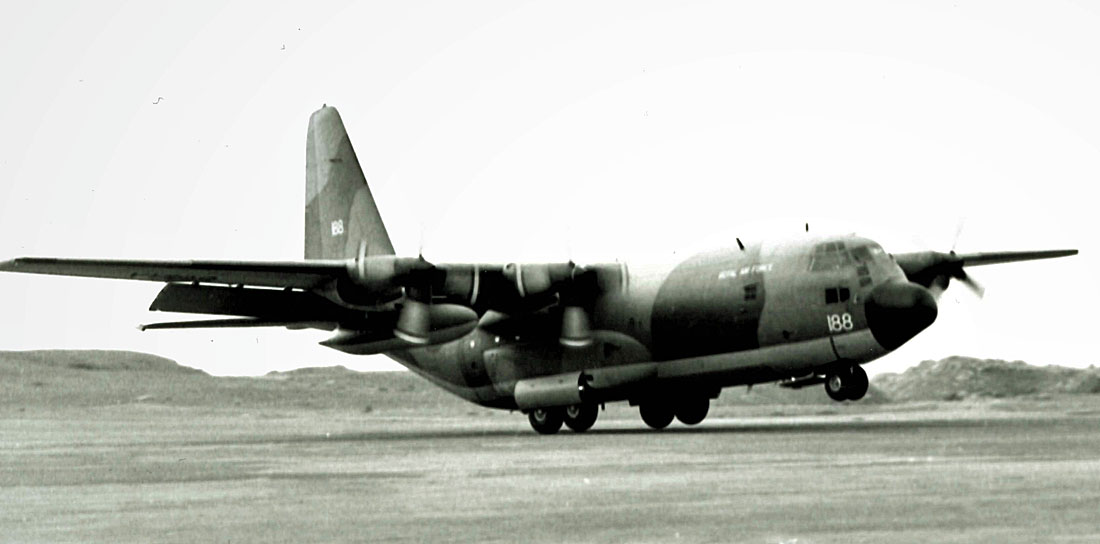
Eventually we were allowed to board the aircraft and make ourselves comfortable on those nice red webbing seats.
To a 17-year-old lad, this was fantastic stuff. Minutes later we were airborne. I had a seat near the back on the left side with a small round window above my head.
Most of the flying was low level through mountainous valleys, presumably staying below any radar, until we got somewhere down towards Shiraz (apparently) where we turned to the south west and out over the gulf, eventually arriving at Bahrain International Airport.
I can’t remember how long it took, but it was around 800km.
To a 17-year-old lad, this was fantastic stuff. Minutes later we were airborne. I had a seat near the back on the left side with a small round window above my head.
Most of the flying was low level through mountainous valleys, presumably staying below any radar, until we got somewhere down towards Shiraz (apparently) where we turned to the south west and out over the gulf, eventually arriving at Bahrain International Airport.
I can’t remember how long it took, but it was around 800km.
Our luggage was almost the last to be taken off, so we were hanging around a short while. Someone had left a pushchair and some bags behind (isn't there always one!) so the crew asked us to wait and take them through. But instead of joining the queue with everyone else the crew said “Come with us.” So, we were out the other side first.
We then discovered we were to be accommodated overnight in the same hotel as the RAF crew and they said there was a swimming pool on the roof. Bonus! British Airways flights to Heathrow were booked for the following day.
We were taken to the hotel by bus and before very long we were in that swimming pool. It didn’t take long to discover the aircrew were there on sun loungers with cold drinks. Life in the RAF hey!
Then came the most incredible news. One of the crew asked, “Whose idea was it to wave that huge flag?”
I responded, “Oh, it wasn’t a planned idea, just excitement, and it’s my bedspread that I didn’t want to leave behind.”
“Well it’s a good job you did,” said one of the aircrew, “because we came in over the airfield to check it out, we saw all the armed soldiers and thought this looks very dodgy so we turned around to bug out, then we spotted the people under the trees and the flag being waved and said shall we chance it? Yes, OK, but the first sign of shooting and we’re off!”
So we were very lucky indeed, it could’ve ended so very differently.
Another story was circulated a little while later, that one of the aircraft was intercepted by a pair of Iranian F-4s over the Gulf, who demanded the C-130 turn around and land at Shiraz (allegedly). This also may be untrue, I cannot verify it. The story went that the C-130 pilot ignored their demands for a while before replying something like “Iran air force fighter aircraft, this is Royal Air Force C-130, we are now out of your airspace, good day”. If that is true, the man has balls of steel.
So, all’s well that ends well. We are still alive 41 years later. I have some good memories and some interesting photographs.
I was saddened to learn that XV188 was retired and broken up a few years ago, but I found its airspeed indicator for sale on e-Bay, which now sits on my bookshelf. And I still have the Union Jack bedspread.
If anyone here was involved in that operation and would like to share their part of the story, please do. I would love to hear from you.
Tim J.
We then discovered we were to be accommodated overnight in the same hotel as the RAF crew and they said there was a swimming pool on the roof. Bonus! British Airways flights to Heathrow were booked for the following day.
We were taken to the hotel by bus and before very long we were in that swimming pool. It didn’t take long to discover the aircrew were there on sun loungers with cold drinks. Life in the RAF hey!
Then came the most incredible news. One of the crew asked, “Whose idea was it to wave that huge flag?”
I responded, “Oh, it wasn’t a planned idea, just excitement, and it’s my bedspread that I didn’t want to leave behind.”
“Well it’s a good job you did,” said one of the aircrew, “because we came in over the airfield to check it out, we saw all the armed soldiers and thought this looks very dodgy so we turned around to bug out, then we spotted the people under the trees and the flag being waved and said shall we chance it? Yes, OK, but the first sign of shooting and we’re off!”
So we were very lucky indeed, it could’ve ended so very differently.
Another story was circulated a little while later, that one of the aircraft was intercepted by a pair of Iranian F-4s over the Gulf, who demanded the C-130 turn around and land at Shiraz (allegedly). This also may be untrue, I cannot verify it. The story went that the C-130 pilot ignored their demands for a while before replying something like “Iran air force fighter aircraft, this is Royal Air Force C-130, we are now out of your airspace, good day”. If that is true, the man has balls of steel.
So, all’s well that ends well. We are still alive 41 years later. I have some good memories and some interesting photographs.
I was saddened to learn that XV188 was retired and broken up a few years ago, but I found its airspeed indicator for sale on e-Bay, which now sits on my bookshelf. And I still have the Union Jack bedspread.
If anyone here was involved in that operation and would like to share their part of the story, please do. I would love to hear from you.
Tim J.
From: Bruce Oram, San Fulgencio, Alicante
Subject: Iran Evacuations
Here are my recollections from 41 years ago on the Iran evacuations. There were 6 MAMS personnel involved being, Flt Lt Guy Blythe, Cpl Bob Thacker and Cpl Bruce Oram on one aircraft and I think the other team was Flt Lt Tom James, Cpl Gus Cobb and A N Other. We were accommodated in the Hotel Vendome in Manama.
The crew I flew with were Andy Potter, Ray Evans, Jinx Newman, Martin Simmons, George Fair and Dave Pyne (all 30 Sqn). Our first trip into Iran came on the morning of 16 January 1979, setting off for a place called Majeid Sulieman which was in the mountains. There being no radar, everyone on board was busy looking out of every window possible often looking up at shepherds on the surrounding hills. As we got nearer to our destination we could see smoke in the distance, apparently from the town. Then we spotted the runway and the airport building with a huge Union Jack flag on the roof.
I had hooked a net to the forward edge of the ramp so the evacuees carrying a bag each could drop it to me and proceed to a seat. The local British priest had already checked all the passports to verify who the people were. This was all done at high speed (25 minutes). I hooked the rear end of the net as we taxied to the runway. The net was secured as we did our run for take-off. It was then the job of writing out a manifest of those on board amid all the cheers. On landing in Bahrain we readied the aircraft just in case we were required the next day. The evacuees were accommodated in the Vendome Hotel also and met us in the bar that night.
My second trip into Iran came on the 24 Jan 1979 to a place called Awaz which was carried out in a similar manner but a little slower as we loaded 65 evacuees back to Bahrain.
Subject: Iran Evacuations
Here are my recollections from 41 years ago on the Iran evacuations. There were 6 MAMS personnel involved being, Flt Lt Guy Blythe, Cpl Bob Thacker and Cpl Bruce Oram on one aircraft and I think the other team was Flt Lt Tom James, Cpl Gus Cobb and A N Other. We were accommodated in the Hotel Vendome in Manama.
The crew I flew with were Andy Potter, Ray Evans, Jinx Newman, Martin Simmons, George Fair and Dave Pyne (all 30 Sqn). Our first trip into Iran came on the morning of 16 January 1979, setting off for a place called Majeid Sulieman which was in the mountains. There being no radar, everyone on board was busy looking out of every window possible often looking up at shepherds on the surrounding hills. As we got nearer to our destination we could see smoke in the distance, apparently from the town. Then we spotted the runway and the airport building with a huge Union Jack flag on the roof.
I had hooked a net to the forward edge of the ramp so the evacuees carrying a bag each could drop it to me and proceed to a seat. The local British priest had already checked all the passports to verify who the people were. This was all done at high speed (25 minutes). I hooked the rear end of the net as we taxied to the runway. The net was secured as we did our run for take-off. It was then the job of writing out a manifest of those on board amid all the cheers. On landing in Bahrain we readied the aircraft just in case we were required the next day. The evacuees were accommodated in the Vendome Hotel also and met us in the bar that night.
My second trip into Iran came on the 24 Jan 1979 to a place called Awaz which was carried out in a similar manner but a little slower as we loaded 65 evacuees back to Bahrain.
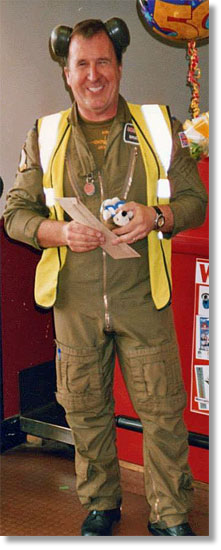
The final run into Iran came on 31 Jan 1979, destination Tehran. Getting closer to our destination we could see the aircraft below us spiralling down towards the runway. After landing and parking up, I proceeded to manifest 71 evacuees. Whilst doing this I felt a rumbling where I was sat. This apparently was a tank and armoured cars racing across the airport as there was some trouble beginning. I quickly finished the manifest and helped Bob secure the bags and load the evacuees. We landed back at Bahrain to the delight of all our passengers on board.
Cheers the noo! Bruce
Cheers the noo! Bruce
From: Tim James, Boston, Lincs
Subject: Escape from Iran - Follow up
Subject: Escape from Iran - Follow up
Wow, that is about as close as it gets! The date Bruce has given tallies exactly with what my mother told me last week, how they remember that I'll never know. I had figured it was sometime in January because I was due back at boarding school and missed the start of term.
After 41 years you might expect there to be a few differences between two accounts of the same event, particularly from two opposing perspectives, but the only comment I would make is that the huge Union Jack wasn't on the roof because I was holding it and we were not far from the front of the BMY hangar, but that could easily be mistaken from the air.
I wasn't aware of the smoke that Bruce mentions because we stayed away from the town and I'm pretty sure it was only just getting light as we drove up there. No surprise though, probably the result of some rioting the previous evening.
The journey to the airfield was only about 7km though my mother tells me that one of the still serving British Army officers had decided to take charge of the road move and promptly got everyone lost, ending up in a quarry. I don't remember that.
I'm not entirely sure what time the aircraft arrived, or was due to arrive. I have it in my head it was 0800 but I could be wrong. I'm sure we weren't waiting more than about an hour, probably less.
Interesting comment about there being no radar. Did Bruce mean the Iranians had no radar or the C-130 had no radar? We were under the impression the Iranians did have radar hence the need for low level flying, but I'm not going to dispute that.
I seem to remember there was still activity with the cargo net on the ramp as the aircraft was rolling, as I was sat very near the back, so I probably saw Bruce.
I also have a vague recollection of someone shouting three cheers for the RAF; Bruce said there was a load of cheering.
I can also remember needing a pee during the flight and being directed by a crewman at the rear to climb up on top of the centre row of seats and walk along to the front, sort of tightrope style, because the toilet was near the cockpit. Good excuse for a brief cockpit visit too. I wish I had taken photos.
Really good to read Bruce's report. I shall relay it on to my family and if I ever go to Benidorm I'll buy him a few beers!
Best regards,
Tim
After 41 years you might expect there to be a few differences between two accounts of the same event, particularly from two opposing perspectives, but the only comment I would make is that the huge Union Jack wasn't on the roof because I was holding it and we were not far from the front of the BMY hangar, but that could easily be mistaken from the air.
I wasn't aware of the smoke that Bruce mentions because we stayed away from the town and I'm pretty sure it was only just getting light as we drove up there. No surprise though, probably the result of some rioting the previous evening.
The journey to the airfield was only about 7km though my mother tells me that one of the still serving British Army officers had decided to take charge of the road move and promptly got everyone lost, ending up in a quarry. I don't remember that.
I'm not entirely sure what time the aircraft arrived, or was due to arrive. I have it in my head it was 0800 but I could be wrong. I'm sure we weren't waiting more than about an hour, probably less.
Interesting comment about there being no radar. Did Bruce mean the Iranians had no radar or the C-130 had no radar? We were under the impression the Iranians did have radar hence the need for low level flying, but I'm not going to dispute that.
I seem to remember there was still activity with the cargo net on the ramp as the aircraft was rolling, as I was sat very near the back, so I probably saw Bruce.
I also have a vague recollection of someone shouting three cheers for the RAF; Bruce said there was a load of cheering.
I can also remember needing a pee during the flight and being directed by a crewman at the rear to climb up on top of the centre row of seats and walk along to the front, sort of tightrope style, because the toilet was near the cockpit. Good excuse for a brief cockpit visit too. I wish I had taken photos.
Really good to read Bruce's report. I shall relay it on to my family and if I ever go to Benidorm I'll buy him a few beers!
Best regards,
Tim
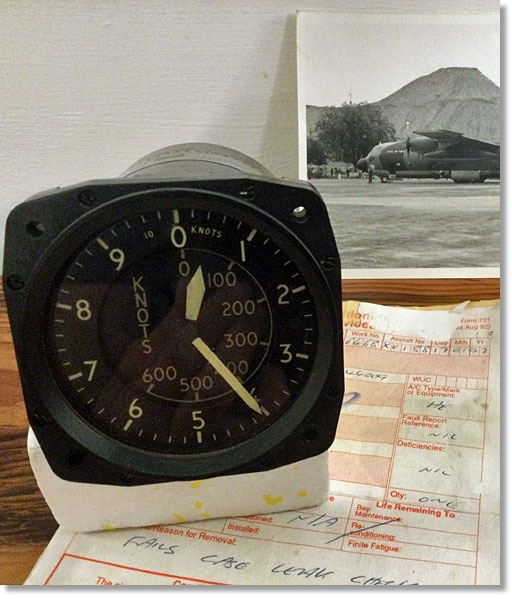
The airspeed indicator from Hercules XV188 which
I found on e-Bay and now resides on my bookshelf
I found on e-Bay and now resides on my bookshelf
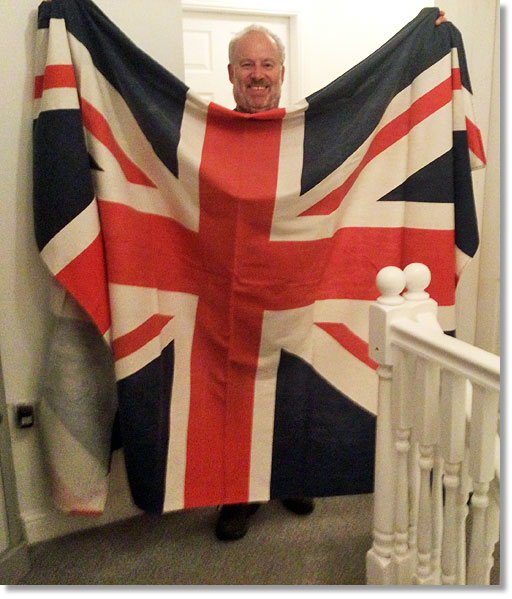
The Union Jack bedspread that literally saved
the day back in '79 is now a family heirloom.
the day back in '79 is now a family heirloom.

From: Charlie Marlow, Freshwater, Isle of Wight
Subject: Re: Movements Officers' Reunion 2020
What a shame that the reunion had to be canceled; very disappointing for all those who were hoping to attend. However, these unprecedented times have brought disappointment to many. Serving and ex-service men and women don’t always need reunions to maintain friendships and camaraderie. We are all acutely aware that out of sight is not out of mind and when we do reunite it’s as though we’d never been apart.
Subject: Re: Movements Officers' Reunion 2020
What a shame that the reunion had to be canceled; very disappointing for all those who were hoping to attend. However, these unprecedented times have brought disappointment to many. Serving and ex-service men and women don’t always need reunions to maintain friendships and camaraderie. We are all acutely aware that out of sight is not out of mind and when we do reunite it’s as though we’d never been apart.

World's last Blackburn Beverley aircraft saved by plan to create amazing holiday let
The businessman who has saved the world’s last Blackburn Beverley aircraft from the scrap heap has revealed plans to turn it into a unique Airbnb let – with a jacuzzi in the nose cone. Pilot Martyn Wiseman, who has an airfield near Selby, Birchwood Lodge, bought the giant aircraft at auction earlier this month. having had his eye on it for a year.
Mr Wiseman has already converted an eight-seater Hawker executive plane, which was once at the beck and call of the Russian jet set, into a luxury crash pad. It featured on George Clarke’s Channel 4 show Amazing Spaces. But those plans are dwarfed by his vision for the transport plane, which will take six months to dismantle – the engines weigh two tonnes each – and then move by crane and lowloader from Paull Fort to his airfield. There is even a possibility the parts could get flown the 33 miles distance if the RAF decides to get its heavy-lift Chinook helicopter fleet involved.
The conversion will see the area where the paratroopers once waited to jump turned into two bedrooms, while the main cargo hold – which could carry 94 troops – will be a kitchen and dining area. And for the evening G&T where else? The cockpit where the pilot and co-pilots seats will be reupholstered and put on swivels, and guests can watch as aircraft land on Mr Wiseman’s runway.
Some people had hoped it would remain a museum, but Mr Wiseman said “simple commercial reality” had to prevail. Nothing would be thrown away, with some internal fittings going on display in a separate building. Mr Wiseman, who has a civil engineering firm and also makes bespoke experimental designs for light aircraft, said: “You have to be realistic. As a museum it’s not an attraction – people will come once and that’s it.
The Beverley Association, for former aircrew and groundcrew, he said, were very supportive and “quite relaxed about getting it modernised to preserve it.”
Yorkshire Post
Mr Wiseman has already converted an eight-seater Hawker executive plane, which was once at the beck and call of the Russian jet set, into a luxury crash pad. It featured on George Clarke’s Channel 4 show Amazing Spaces. But those plans are dwarfed by his vision for the transport plane, which will take six months to dismantle – the engines weigh two tonnes each – and then move by crane and lowloader from Paull Fort to his airfield. There is even a possibility the parts could get flown the 33 miles distance if the RAF decides to get its heavy-lift Chinook helicopter fleet involved.
The conversion will see the area where the paratroopers once waited to jump turned into two bedrooms, while the main cargo hold – which could carry 94 troops – will be a kitchen and dining area. And for the evening G&T where else? The cockpit where the pilot and co-pilots seats will be reupholstered and put on swivels, and guests can watch as aircraft land on Mr Wiseman’s runway.
Some people had hoped it would remain a museum, but Mr Wiseman said “simple commercial reality” had to prevail. Nothing would be thrown away, with some internal fittings going on display in a separate building. Mr Wiseman, who has a civil engineering firm and also makes bespoke experimental designs for light aircraft, said: “You have to be realistic. As a museum it’s not an attraction – people will come once and that’s it.
The Beverley Association, for former aircrew and groundcrew, he said, were very supportive and “quite relaxed about getting it modernised to preserve it.”
Yorkshire Post


From: Jeremy Babington, Frome, Somerset
Subject: Repatriations
Tony,
I recall, with hazy memory, the evacuation of British nationals from Cyprus in 1974. I had just joined UKMAMS and as an officer with no team was sent out to reinforce the other MAMS teams who were already there living in 12 by 12 tents outside of Load Control.
I was the only passenger on a Comet during the outbound flight and remember a slight sense of alarm when all the lights were doused 200 miles out from landing.
I spent about 4 weeks there helping to offload inbound flights and embarking many distraught passengers for the flight home some of whom had come straight from the beaches.
My abiding memory though will be the utter frustration of unloading APCs from inbound UK flights only to load them on to 70 Sqn aircraft (the only dirt-strip qualified C130 Sqn) for onward flight to Kingsfield, Dhekhelia for REME checks. Many of them subsequently arrived back at Akrotiri by air for operation! Unload, load, unload. Lots of chains and in oppressive heat.
Best wishes to all in these strange times,
Jerry Babington
Subject: Repatriations
Tony,
I recall, with hazy memory, the evacuation of British nationals from Cyprus in 1974. I had just joined UKMAMS and as an officer with no team was sent out to reinforce the other MAMS teams who were already there living in 12 by 12 tents outside of Load Control.
I was the only passenger on a Comet during the outbound flight and remember a slight sense of alarm when all the lights were doused 200 miles out from landing.
I spent about 4 weeks there helping to offload inbound flights and embarking many distraught passengers for the flight home some of whom had come straight from the beaches.
My abiding memory though will be the utter frustration of unloading APCs from inbound UK flights only to load them on to 70 Sqn aircraft (the only dirt-strip qualified C130 Sqn) for onward flight to Kingsfield, Dhekhelia for REME checks. Many of them subsequently arrived back at Akrotiri by air for operation! Unload, load, unload. Lots of chains and in oppressive heat.
Best wishes to all in these strange times,
Jerry Babington

From: Tony Mullen, Toowoomba, QLD
Subject: Evacuation of British Nationals from East Pakistan
Subject: Evacuation of British Nationals from East Pakistan
In 1965 Pakistan and India were at war. East Pakistan was what is now independent Bangladesh. The British Government decided that the risk of casualties in East Pakistan was significant and that British ex-pats should be offered temporary residence in Singapore.
A Britannia aircraft from 99 Sqn at Lyneham was put on standby at Changi and a FEAF MAMS team was assigned to the task. I was the team leader. We were instructed to report to the Changi Transit Hotel at “sparrows” and wait for the signal that the operation was to proceed. We were told to be prepared for a two or three day stay at Dacca because some three evacuation flights were planned. We were also told to have a tent and rations with us as accommodation was unlikely.
We waited some four hours at Changi until advised that the operation was postponed and we were to repeat the standby at Changi the following day. Again we were stood down but on the 3rd day we got the green light. We loaded our camping equipment on board the Britannia bound for the capital of East Pakistan, Dacca.
On arrival we were met by a Pakistan Air Force Sqn Ldr and a hundred or so British women and children. I asked the Sqn Ldr where we could pitch our MAMS tent and was politely but very firmly advised that we were not permitted to remain there under any circumstances and must return on the aircraft once we had loaded the baggage and embarked the passengers!
This we did but the aircraft was at full capacity and we had to sit on the floor for the return trip. Another MAMS team was assigned for the other two flights.
Obviously, the planning of the operation was very poor. The Air Staff forgot to get authorisation for the MAMS team to remain at Dacca. All very amateur in hindsight.
Best regards
Tony Mullen
A Britannia aircraft from 99 Sqn at Lyneham was put on standby at Changi and a FEAF MAMS team was assigned to the task. I was the team leader. We were instructed to report to the Changi Transit Hotel at “sparrows” and wait for the signal that the operation was to proceed. We were told to be prepared for a two or three day stay at Dacca because some three evacuation flights were planned. We were also told to have a tent and rations with us as accommodation was unlikely.
We waited some four hours at Changi until advised that the operation was postponed and we were to repeat the standby at Changi the following day. Again we were stood down but on the 3rd day we got the green light. We loaded our camping equipment on board the Britannia bound for the capital of East Pakistan, Dacca.
On arrival we were met by a Pakistan Air Force Sqn Ldr and a hundred or so British women and children. I asked the Sqn Ldr where we could pitch our MAMS tent and was politely but very firmly advised that we were not permitted to remain there under any circumstances and must return on the aircraft once we had loaded the baggage and embarked the passengers!
This we did but the aircraft was at full capacity and we had to sit on the floor for the return trip. Another MAMS team was assigned for the other two flights.
Obviously, the planning of the operation was very poor. The Air Staff forgot to get authorisation for the MAMS team to remain at Dacca. All very amateur in hindsight.
Best regards
Tony Mullen

A400M transports Griffon armoured vehicle from Djibouti
As part of an operational trial, an A400M Atlas transport aircraft of the French Air and Space Force transported for the first time a Griffon armoured vehicle from Djibouti to Orleans, France.
The operation proved tricky, considering the sheer weight (20.8 tonnes for 37 tonnes of load capacity of the A400M Atlas) and the size of the Griffon.
defenceweb.co.za
The operation proved tricky, considering the sheer weight (20.8 tonnes for 37 tonnes of load capacity of the A400M Atlas) and the size of the Griffon.
defenceweb.co.za
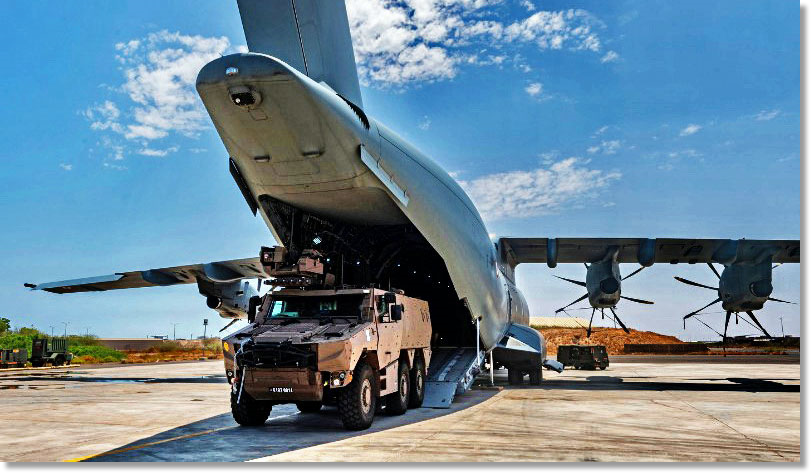

From: Allison Bell, Toronto, ON
Subject: Terry Bell
Hello Tony,
My late Dad, Terry Bell, passed way in May 2018. Several of his RAF mates were in touch with him over the last several years, and it made him so happy!
The purpose of my email is that my Mom, Wendy, has a couple of upcoming milestones in November. Her and my Dad would’ve celebrated their 50th wedding anniversary on November 14th, and her 70th birthday is 3 days later on November 17th. She’s an incredible woman who has lost her incredible life-partner, and I’m trying to make these milestones as special as possible when she’s not got my Dad to celebrate with.
I was hoping that some of Dad’s old RAF buddies could send her a card to let her know she’s cared about; I believe that there’s somewhat of a brethren mentality with RAF folks, so I thought this may be a possibility.
If any of you are able/willing to send her a card, I’m going to receive the cards at my home so as to surprise her:
Wendy Bell
112 Delaware Ave
Toronto, ON, M6H 2T1
Canada
Thank you so very much in advance, Allison Bell
Subject: Terry Bell
Hello Tony,
My late Dad, Terry Bell, passed way in May 2018. Several of his RAF mates were in touch with him over the last several years, and it made him so happy!
The purpose of my email is that my Mom, Wendy, has a couple of upcoming milestones in November. Her and my Dad would’ve celebrated their 50th wedding anniversary on November 14th, and her 70th birthday is 3 days later on November 17th. She’s an incredible woman who has lost her incredible life-partner, and I’m trying to make these milestones as special as possible when she’s not got my Dad to celebrate with.
I was hoping that some of Dad’s old RAF buddies could send her a card to let her know she’s cared about; I believe that there’s somewhat of a brethren mentality with RAF folks, so I thought this may be a possibility.
If any of you are able/willing to send her a card, I’m going to receive the cards at my home so as to surprise her:
Wendy Bell
112 Delaware Ave
Toronto, ON, M6H 2T1
Canada
Thank you so very much in advance, Allison Bell

Helicopter delivered in time for fire season
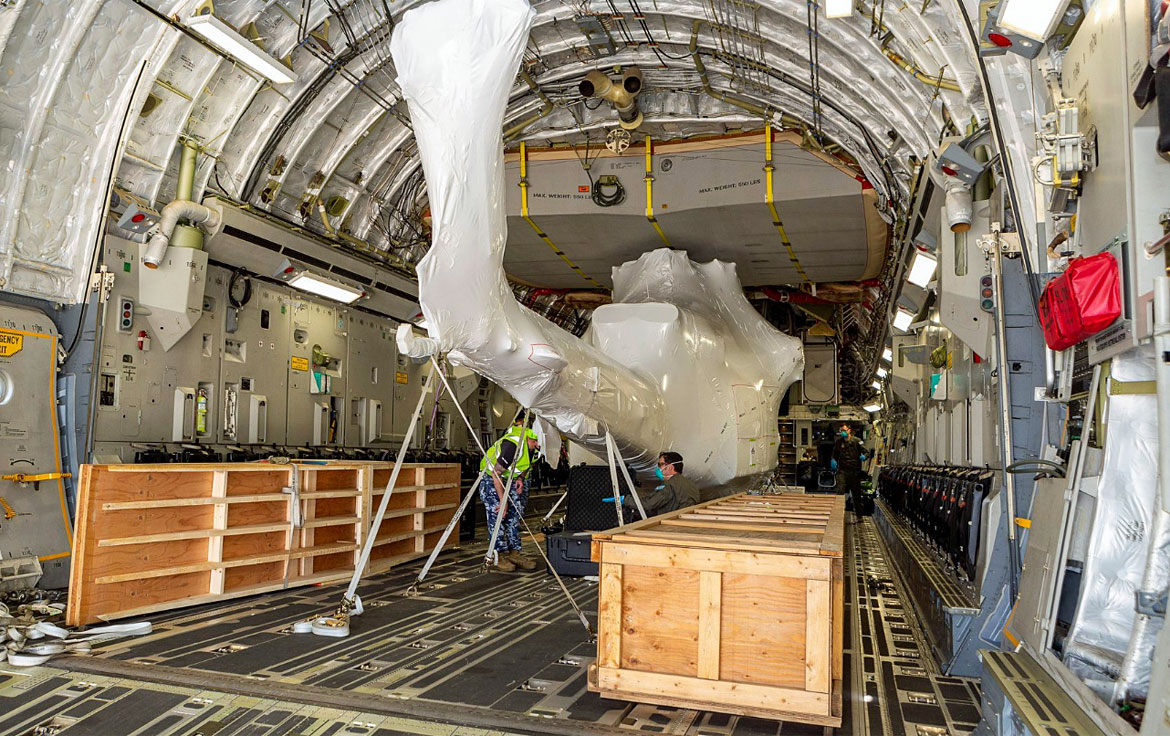
A trans-Pacific mission by an Air Force C-17A Globemaster has delivered a Bell 412 helicopter for the NSW Rural Fire Service.
Loaded by a No. 36 Squadron C-17A crew at Vancouver International Airport, Canada, the Bell 412 was delivered to RAAF Base Richmond where it was reconstructed and received additional servicing. The Bell 412 will be ready to combat bushfires this summer.
Commander Air Mobility Group Air Commodore Carl Newman said the mission was well-suited to the C-17A’s capabilities. “One of the reasons that Defence purchased the C-17A was the aircraft’s ability to transport large loads like this helicopter over great distances, where and when they were needed,” Air Commodore Newman said. “Using a C-17A to carry a Bell 412 across the Pacific is an outstanding example of a Defence asset in support of another government agency and one that will yield positive results for the broader Australian community. “Our air mobility fleet has a strong record of supporting state-based emergency services, including during Operation Bushfire Assist, and we will continue providing support.”
It was the first time an Australian crew had transported a three-tonne Bell 412. A special cargo instruction on how to safely load, restrain, and unload the helicopter was provided by Air Mobility Training and Development Unit.
news.defence.gov.au
Loaded by a No. 36 Squadron C-17A crew at Vancouver International Airport, Canada, the Bell 412 was delivered to RAAF Base Richmond where it was reconstructed and received additional servicing. The Bell 412 will be ready to combat bushfires this summer.
Commander Air Mobility Group Air Commodore Carl Newman said the mission was well-suited to the C-17A’s capabilities. “One of the reasons that Defence purchased the C-17A was the aircraft’s ability to transport large loads like this helicopter over great distances, where and when they were needed,” Air Commodore Newman said. “Using a C-17A to carry a Bell 412 across the Pacific is an outstanding example of a Defence asset in support of another government agency and one that will yield positive results for the broader Australian community. “Our air mobility fleet has a strong record of supporting state-based emergency services, including during Operation Bushfire Assist, and we will continue providing support.”
It was the first time an Australian crew had transported a three-tonne Bell 412. A special cargo instruction on how to safely load, restrain, and unload the helicopter was provided by Air Mobility Training and Development Unit.
news.defence.gov.au

THE ROYAL HAIR FORCE:
The Royal Air Force are allowing its airmen to keep dreadlocks, braids and ponytails in a bid to boost diversity in the service. From now on the fashion-conscious can also keep cornrows and twists should they wish. The new rules follow close on the heels of the force allowing its airmen to grow beards for the first time in its 101-year history last September. It's hoped the changes to their 'hair policy' will help promote inclusivity and broaden the RAF's recruitment pool.
The changes could see airmen rocking a number of hipster hairstyles including mullets, ponytails and man-buns. But standards will not be slipping as there will be strict regulations to keep out wacky designs. Irrespective of their gender, hair in any style will have to be capped by the bottom edge of the collar.
Those with extra long or big hair will have to wrap it up in non-religious turbans if it fails to tuck neatly under peaked caps or berets. And the turbans in question must be of an 'approved service pattern and colour' featuring a cap badge front and centre.
The RAF is the least diverse of the three armed forces and hopes that by allowing the new hair-do's it will reflect society and attract people from diverse backgrounds. The new hair policy is all about moving with the times and bringing the RAF into the 21st century. A spokesman said it was all about moving with the times adding "This is one important step, of many, to deliver a next-generation Air Force fit for the 21st century."
Prior to the new rules, non-regulation styles were approved only on religious grounds. Last year, as well as making changes to their 'facial hair policy' by allowing beards, the RAF also relaxed tattoo rules to allow ink on eyebrows, neck and hands.
Daily Mail Online
The changes could see airmen rocking a number of hipster hairstyles including mullets, ponytails and man-buns. But standards will not be slipping as there will be strict regulations to keep out wacky designs. Irrespective of their gender, hair in any style will have to be capped by the bottom edge of the collar.
Those with extra long or big hair will have to wrap it up in non-religious turbans if it fails to tuck neatly under peaked caps or berets. And the turbans in question must be of an 'approved service pattern and colour' featuring a cap badge front and centre.
The RAF is the least diverse of the three armed forces and hopes that by allowing the new hair-do's it will reflect society and attract people from diverse backgrounds. The new hair policy is all about moving with the times and bringing the RAF into the 21st century. A spokesman said it was all about moving with the times adding "This is one important step, of many, to deliver a next-generation Air Force fit for the 21st century."
Prior to the new rules, non-regulation styles were approved only on religious grounds. Last year, as well as making changes to their 'facial hair policy' by allowing beards, the RAF also relaxed tattoo rules to allow ink on eyebrows, neck and hands.
Daily Mail Online

From: Bernie Lafrance, Nanaimo, BC
Subject: UN Tour Egypt
I was posted to UN Egypt from the Fall of 1975 to the Spring of 1976. On arrival in camp I was immediately dispatched to Beirut, Lebanon, as part of the Beirut MAMS team dealing with passengers and freight on R&R in Beirut and back to Egypt, on a Bi-weekly schedule.
The situation for two months was fine and things were working well, but in my 3rd month things turned sour between two local factions. Every so often missiles would be sent toward the city hitting different parts. We were not too sure what was going on as most people were speaking Arabic which we didn’t understand and as it turned out, the rockets were being fired into the brand new Holiday Inn, setting it on fire and destroying it. I forgot to mention that every time we went to and from the airport we had to drive past Arafat’s camp which increased our discomfort.
We were staying at the Charles Hotel, approximately 1 km from the Holiday Inn, and it was quite comfortable when one night a replacement came in and told our group that we had to move to another location. We challenged the move but moved the next day anyway and that night the Charles Hotel was hit. Lucky for us that day.
Things were not getting any better because we were placed on a nightly curfew from 2000 hrs to 0600 hrs. Soon after our move, the Canadian Embassy staff requested our assistance to evacuate them and their families to the airport and we followed through and completed the move easily. As things went, a few days later, the Canadian Military Attaché, a friend of mine, requested assistance to evacuate them also. Shortly afterwards I was sent to Damascus, Syria for one month.
Cheers, Bernie
Subject: UN Tour Egypt
I was posted to UN Egypt from the Fall of 1975 to the Spring of 1976. On arrival in camp I was immediately dispatched to Beirut, Lebanon, as part of the Beirut MAMS team dealing with passengers and freight on R&R in Beirut and back to Egypt, on a Bi-weekly schedule.
The situation for two months was fine and things were working well, but in my 3rd month things turned sour between two local factions. Every so often missiles would be sent toward the city hitting different parts. We were not too sure what was going on as most people were speaking Arabic which we didn’t understand and as it turned out, the rockets were being fired into the brand new Holiday Inn, setting it on fire and destroying it. I forgot to mention that every time we went to and from the airport we had to drive past Arafat’s camp which increased our discomfort.
We were staying at the Charles Hotel, approximately 1 km from the Holiday Inn, and it was quite comfortable when one night a replacement came in and told our group that we had to move to another location. We challenged the move but moved the next day anyway and that night the Charles Hotel was hit. Lucky for us that day.
Things were not getting any better because we were placed on a nightly curfew from 2000 hrs to 0600 hrs. Soon after our move, the Canadian Embassy staff requested our assistance to evacuate them and their families to the airport and we followed through and completed the move easily. As things went, a few days later, the Canadian Military Attaché, a friend of mine, requested assistance to evacuate them also. Shortly afterwards I was sent to Damascus, Syria for one month.
Cheers, Bernie

From: Kate O’Brien
Subject: Chris Swaithes
Hi Tony,
Hope you are well. I am emailing you as I’m currently looking for information, pictures, stories, memories or anything regarding my Grandad, Chris Swaithes, who I believe worked in the UKMAMS up until around the early 90’s.
I know it would mean so much to him if I could find anything for him to read over or look at, it would be very nostalgic and I would love to be able to help bring back all his wonderful memories. Is this something you would be able to help with?
Thank you so much for your time.
Kind regards,
Kate O’Brien
Subject: Chris Swaithes
Hi Tony,
Hope you are well. I am emailing you as I’m currently looking for information, pictures, stories, memories or anything regarding my Grandad, Chris Swaithes, who I believe worked in the UKMAMS up until around the early 90’s.
I know it would mean so much to him if I could find anything for him to read over or look at, it would be very nostalgic and I would love to be able to help bring back all his wonderful memories. Is this something you would be able to help with?
Thank you so much for your time.
Kind regards,
Kate O’Brien
(Click on the flag next to Kate's name to send an e-mail to her)

RCAF 60 Years Hercules Anniversary
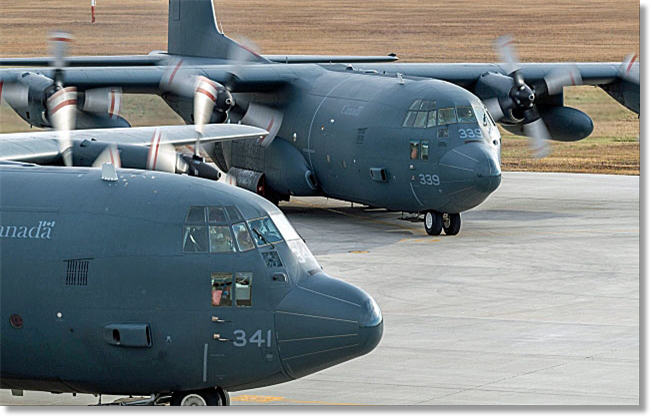
On 13 October 2020, the Royal Canadian Air Force (RCAF) celebrated sixty years of operation with the Lockheed C-130 Hercules.
A ceremony and a flypast were held at CFB Winnipeg to celebrate six decades of flying with the well-known transporter. Back in 1960, 435 squadron was the first Canadian unit to receive the C-130, when four C-130Bs were delivered.
Although the career of the B-model lasted for only six years, with the remaining three aircraft sold in 1967, the introduction set the mark for the next sixty years of flying the Herk with 435 squadron.
The B-model was followed by the E-model, and with both early models retired, the RCAF still operates the CC-130H and CC-130J as the transporters became known under the Canadian military designation system in the late sixties. Such is the span that three generations of Canadian airmen have flown the Hercules and a total of 59 different airframes have been operated by the RCAF.
The Hercules is used in Canada in a variety of roles, mostly as cargo haulers, but 435 squadron is tasked with fighter support by providing an air-to-air refuelling capability to the CF-18 fighter community. Another important role in Canada is Search And Rescue (SAR), in which the older H-models are operated from Trenton ON, and Greenwood, NS. Their tasks will be taken over by the recently acquired CC-295 Kingfisher Fixed Wing SAR aircraft.
The anniversary was celebrated with a flypast, including a Hercules and two CF-18 fighters over Winnipeg.
scramble.nl
A ceremony and a flypast were held at CFB Winnipeg to celebrate six decades of flying with the well-known transporter. Back in 1960, 435 squadron was the first Canadian unit to receive the C-130, when four C-130Bs were delivered.
Although the career of the B-model lasted for only six years, with the remaining three aircraft sold in 1967, the introduction set the mark for the next sixty years of flying the Herk with 435 squadron.
The B-model was followed by the E-model, and with both early models retired, the RCAF still operates the CC-130H and CC-130J as the transporters became known under the Canadian military designation system in the late sixties. Such is the span that three generations of Canadian airmen have flown the Hercules and a total of 59 different airframes have been operated by the RCAF.
The Hercules is used in Canada in a variety of roles, mostly as cargo haulers, but 435 squadron is tasked with fighter support by providing an air-to-air refuelling capability to the CF-18 fighter community. Another important role in Canada is Search And Rescue (SAR), in which the older H-models are operated from Trenton ON, and Greenwood, NS. Their tasks will be taken over by the recently acquired CC-295 Kingfisher Fixed Wing SAR aircraft.
The anniversary was celebrated with a flypast, including a Hercules and two CF-18 fighters over Winnipeg.
scramble.nl
From: Ian Envis, Crowborough, East Sussex
Subject: Iran Airlift 1979 - AKT Movements
Hi Tony,
Your request for scary memories of evacuations and the like - and the fact that we are de-cluttering the house prior to going for sale and downsizing, has uncovered a set of RAF Akrotiri station photographer's proofs from the Iran Airlift of Feb 1979:
Subject: Iran Airlift 1979 - AKT Movements
Hi Tony,
Your request for scary memories of evacuations and the like - and the fact that we are de-cluttering the house prior to going for sale and downsizing, has uncovered a set of RAF Akrotiri station photographer's proofs from the Iran Airlift of Feb 1979:
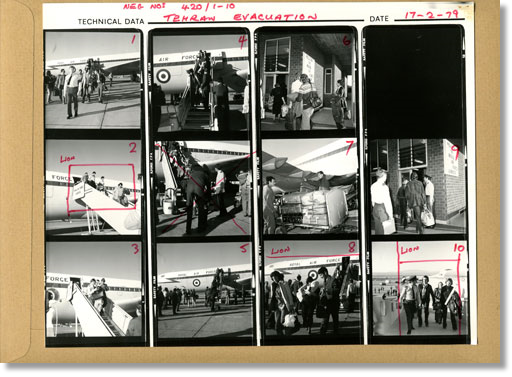
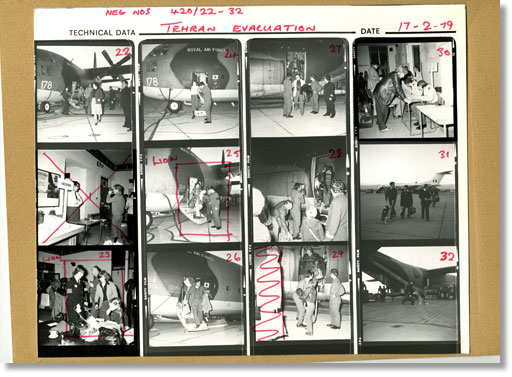
The Story: With the Ayatollah Khomeini's return to Iran following the uprisings in 1978, a huge number of Westerners were stranded in the country which up to then had been ''a moderate country led by The Shah of Iran (Persia)'' - western dress, bars, night clubs etc...
There was an outcry about a rescue mission since we had handled individual aircraft from Bandar Abbas, Mashaad and Tehran, but suddenly the stakes were raised.
The Germans sent a full team of C160s and ground staff plus a Tactical Radio unit who spent nearly 3 weeks partying around Akrotiri and Cyprus but never went anywhere - the aircraft stayed on Alpha Ramp for the entire duration.
Finally, Headquarters 38 Group, as directed by MoD UK, sent a composite help team of VC10 & C130 plus a UKMAMS Team (led by Dick Leonard) to assist the Akrotiri Movers. Additionally, British Airways Air Tours positioned 3 x 707's as the plan was to pick up from Tehran (any Western nationality but primarily British), fly them to Akrotiri and British Airways would then, under a Foreign and Commonwealth Office (FCO) contract, fly them to the UK.
Everybody at Akrotiri wanted to be involved, from the Station Commander down, plus the folks from The British Consulate in Nicosia, the Local Barclays Bank Manager, Red Cross, RAF Medics, RAF Police etc. All evacuees were interviewed, completed documentation for FCO and others to ensure the funds from other governments could be recovered. Meals were provided in the Air Terminal restaurant.
The bank officers conducted a real trade in converting Rials into Sterling and the Movers' charity box saw a massive donation one late afternoon of over 1 Million rials which was priced at approx £700 - surprise, by the time the bank could arrange the deposit to the charity account the following day the rate of exchange had dropped and we finished up with just over £300... the price of war!!
There was an outcry about a rescue mission since we had handled individual aircraft from Bandar Abbas, Mashaad and Tehran, but suddenly the stakes were raised.
The Germans sent a full team of C160s and ground staff plus a Tactical Radio unit who spent nearly 3 weeks partying around Akrotiri and Cyprus but never went anywhere - the aircraft stayed on Alpha Ramp for the entire duration.
Finally, Headquarters 38 Group, as directed by MoD UK, sent a composite help team of VC10 & C130 plus a UKMAMS Team (led by Dick Leonard) to assist the Akrotiri Movers. Additionally, British Airways Air Tours positioned 3 x 707's as the plan was to pick up from Tehran (any Western nationality but primarily British), fly them to Akrotiri and British Airways would then, under a Foreign and Commonwealth Office (FCO) contract, fly them to the UK.
Everybody at Akrotiri wanted to be involved, from the Station Commander down, plus the folks from The British Consulate in Nicosia, the Local Barclays Bank Manager, Red Cross, RAF Medics, RAF Police etc. All evacuees were interviewed, completed documentation for FCO and others to ensure the funds from other governments could be recovered. Meals were provided in the Air Terminal restaurant.
The bank officers conducted a real trade in converting Rials into Sterling and the Movers' charity box saw a massive donation one late afternoon of over 1 Million rials which was priced at approx £700 - surprise, by the time the bank could arrange the deposit to the charity account the following day the rate of exchange had dropped and we finished up with just over £300... the price of war!!
At no stage did the existing UK-Cyprus schedules or even exercise movements stop; the Akrotiri Movers operated their normal tasks and Dick Leonard's UKMAMS troops managed the C130 ops (in the main). The outcome was a complete success for everybody and we - the Movers, were thanked profusely but importantly had a big celebration prior to Dick and his team recovering to the UK.
The most amusing story: Four young Irish ladies advised the Pax Terminal folks that their suitcases hadn't been offloaded from their C130 and wanted to claim etc. Anyway, our UK Customs (seconded to Cyprus) were suddenly interested when the suitcases were found in the terminal and insisted on opening them in the presence of the four ladies. Surprise! They contained very flimsy and provocative lingerie plus numerous self gratification devices (dildos if you must - the sizing being large!). To much embarrassment for the ladies and just about every Mover turning up to view the contents, it transpired that the ladies had been strippers/lap dancers in a Tehran night club and they were tools of the trade! Another day in the life of Movers. I'm sure some of the folks stationed there in February 1979 will be able to add more accurate information, identify faces or provide more funny stories?
The most amusing story: Four young Irish ladies advised the Pax Terminal folks that their suitcases hadn't been offloaded from their C130 and wanted to claim etc. Anyway, our UK Customs (seconded to Cyprus) were suddenly interested when the suitcases were found in the terminal and insisted on opening them in the presence of the four ladies. Surprise! They contained very flimsy and provocative lingerie plus numerous self gratification devices (dildos if you must - the sizing being large!). To much embarrassment for the ladies and just about every Mover turning up to view the contents, it transpired that the ladies had been strippers/lap dancers in a Tehran night club and they were tools of the trade! Another day in the life of Movers. I'm sure some of the folks stationed there in February 1979 will be able to add more accurate information, identify faces or provide more funny stories?
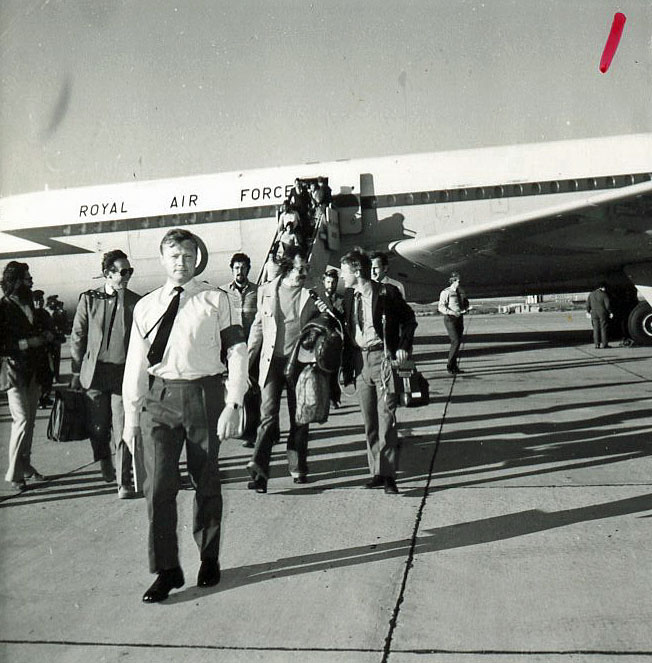
To Movers across the globe - stay safe and dodge the virus - Cheers, Ian
Refugee assisting refugee. Perhaps an unconventional idiom, but truly applicable to team members of NEAF MAMS domiciled in Limassol at the outbreak of the Cyprus war in July 1974 - and subsequently involved in what was accepted to be the largest RAF airlift since Berlin. Long remembered events – Kingsfield (glider hangar); sand and cinder runway; dust; hot sunshine, incessant aircraft movements - up to 24 sorties per day on 23rd/24th July; battalions of infantry - and return trips to Akrotiri - strapping in multi nationals on the para seats as the Hercules turned to take off - and a sprinkling of international politics of the European kind!
However, to understand the background to the Cyprus war, it is appropriate to include mention of the coup in Cyprus on Monday 15th July 1974, when Greek nationals attacked police stations and military units across Cyprus, and, in Nicosia, imposed Nikos SAMSON (an ex EOKA terrorist) as the new President of Cyprus deposing President Makarios. (At the time it was suggested that the long time president had been killed but this was proven to be bogus propaganda.) An horrendously worrying time for the families. My own wife, Rose, recalls that it was that very morning that she was showing a neighbour, the wife of a newly arrived Royal Scots soldier the direction, ‘across the bondu’ to the local NAAFI shop. En-route they stopped at a local bakery. The next thing they heard was a very loud explosion, and seconds later the outbreak of small arms firing. The Cypriot baker explaining that the radio was reporting Makarios had been killed. Desperately anxious, Rose then chose a time to hasten home, nervous for the well-being of our youngest child, Paul who was, at the time, in his Limassol kindergarten located in close proximity to the police station- the focal point of the local rebellion. Later, and with great relief, Rose witnessed the school bus finally arrive home, with all the children lying prostrate on the floor.
During that week I was ‘on task’ and deployed with members of blue team NEAF MAMS conducting the ‘Bait shuttle’ - in support of the Oman war. It was late afternoon, whilst on the ground at Salalah, that we were to learn of the coup. I recall we were sitting on the open ramp, enjoying the breeze, gazing inland towards the Jebel Massif escarpment. The navigator came down from the flight deck and reported that he had heard on the HF that there had been a coup in Cyprus - and Makarios was dead. Obviously, quite disarming news with most of us living off base in Limassol. However we returned to Masirah and then to Akrotiri, and paradoxically were ultimately allowed home - into Limassol. Once home on Friday, I was preparing for an early pick up by a colleague the next morning (Saturday 20th) for an anticipated task at Kingsfield, Dhekelia. My own car was in a local garage, due for a respray, prior to my sending it home to the UK. However, events were to take a dramatic twist.
However, to understand the background to the Cyprus war, it is appropriate to include mention of the coup in Cyprus on Monday 15th July 1974, when Greek nationals attacked police stations and military units across Cyprus, and, in Nicosia, imposed Nikos SAMSON (an ex EOKA terrorist) as the new President of Cyprus deposing President Makarios. (At the time it was suggested that the long time president had been killed but this was proven to be bogus propaganda.) An horrendously worrying time for the families. My own wife, Rose, recalls that it was that very morning that she was showing a neighbour, the wife of a newly arrived Royal Scots soldier the direction, ‘across the bondu’ to the local NAAFI shop. En-route they stopped at a local bakery. The next thing they heard was a very loud explosion, and seconds later the outbreak of small arms firing. The Cypriot baker explaining that the radio was reporting Makarios had been killed. Desperately anxious, Rose then chose a time to hasten home, nervous for the well-being of our youngest child, Paul who was, at the time, in his Limassol kindergarten located in close proximity to the police station- the focal point of the local rebellion. Later, and with great relief, Rose witnessed the school bus finally arrive home, with all the children lying prostrate on the floor.
During that week I was ‘on task’ and deployed with members of blue team NEAF MAMS conducting the ‘Bait shuttle’ - in support of the Oman war. It was late afternoon, whilst on the ground at Salalah, that we were to learn of the coup. I recall we were sitting on the open ramp, enjoying the breeze, gazing inland towards the Jebel Massif escarpment. The navigator came down from the flight deck and reported that he had heard on the HF that there had been a coup in Cyprus - and Makarios was dead. Obviously, quite disarming news with most of us living off base in Limassol. However we returned to Masirah and then to Akrotiri, and paradoxically were ultimately allowed home - into Limassol. Once home on Friday, I was preparing for an early pick up by a colleague the next morning (Saturday 20th) for an anticipated task at Kingsfield, Dhekelia. My own car was in a local garage, due for a respray, prior to my sending it home to the UK. However, events were to take a dramatic twist.
NEAF MAMS – Kingsfield airstrip, Cyprus – July to August 1974:- “Their aid they yield to all, they never shun the man of sorrow, nor the man undone” - George Crabbe (1754-1832)
Cyprus War 1974 – NEAF MAMS
From: Peter Herring, Gosport, Hampshire
At 0530 on the Saturday morning, I answered a loud knock at the door. It was my new neighbour – the newly arrived Royal Scots soldier. “Pete – the Turks have invaded”. He explained that he was due to be collected by someone from his Regiment at 0615 – would I like a lift to Akrotiri? What followed was an aborted trip when we met a road block at the edge of the Pissouri plantation and were ordered to return home. The following hours were spent listening for news and advice on the Forces Radio; Lorries containing numbers of Greek Cypriot National Guard, and para-military were hastening past the house discharging their weapons (generally) skywards. A Greek Cypriot neighbour was digging a large trench in his garden and I recall our landlord and his cousin desperately asking for news from the BBC. The family were sick with worry - agonising in making a decision whether to attempt an escape to relatives in a local village, or remain in the anticipation of their men folk being ‘encouraged’ to enlist in the Limassol version of the ‘Home Guard’ in expectation of an advance of the Turkish army. Our household soon increased by two when we invited the lady and son opposite to our home to shelter with us – her navigator husband was away from the island with the Vulcan squadron.
Into the early afternoon and with no sign of our neighbourhood warden, friends of the lady opposite arrived and crammed herself, together with her son into their car and departed. Soon afterwards we were relieved to finally see a service lorry together with our local warden. However space shortage precluded all of us boarding the transport and we persuaded the wife of the Royal Scots soldier to take that transport with her very young son. However, it was confirmed by the warden that we would meet relief vehicles on the bypass and the decision was made to set off.
After turning the corner opposite the river bed, we were aware of small arms fire and the unmistakable whistling of rounds passing over our heads. While we did not believe we were being personally targeted, we didn’t remain on the corner but, carrying the heavy cases, retreated to trek along the much longer dog-leg route towards the bypass. Our 5 and 3 year-old children were cajoled into carrying their precious soft toys, and paradoxically transiting heavily armed men of the local para-military group, returning home after neutralising the prospect of resistance from the local Turkish nationals.
Sunshine was absent on what was later reported to be the hottest July day of ’74. The sky was a dirty yellow, encompassing the shroud of sand and dust stemming from the shooting and ordnance exchange in the Turkish district. On reaching the bypass we clambered aboard a 3-tonner that was headed back into Limassol towards the housing hub at George’s. Here the lorry loaded up with families and turned back to head towards the safety of the Sovereign Base Area (SBA). As we reached the outskirts of Limassol, we were again aware of small arms exchange above the slow moving convoy of vehicles. Everyone was lying prone on the floor of the lorry until we were clear of the town. On reaching the SBA and the main road to Episkopi, the vehicle stopped in a clearing and we observed the Royal Scots dug-in around the perimeter and a piper playing. We disembarked and joined another lorry destined for Akrotiri... to this day my daughter recalls eating a packet of fig rolls courtesy of a very kind lady.
Into the early afternoon and with no sign of our neighbourhood warden, friends of the lady opposite arrived and crammed herself, together with her son into their car and departed. Soon afterwards we were relieved to finally see a service lorry together with our local warden. However space shortage precluded all of us boarding the transport and we persuaded the wife of the Royal Scots soldier to take that transport with her very young son. However, it was confirmed by the warden that we would meet relief vehicles on the bypass and the decision was made to set off.
After turning the corner opposite the river bed, we were aware of small arms fire and the unmistakable whistling of rounds passing over our heads. While we did not believe we were being personally targeted, we didn’t remain on the corner but, carrying the heavy cases, retreated to trek along the much longer dog-leg route towards the bypass. Our 5 and 3 year-old children were cajoled into carrying their precious soft toys, and paradoxically transiting heavily armed men of the local para-military group, returning home after neutralising the prospect of resistance from the local Turkish nationals.
Sunshine was absent on what was later reported to be the hottest July day of ’74. The sky was a dirty yellow, encompassing the shroud of sand and dust stemming from the shooting and ordnance exchange in the Turkish district. On reaching the bypass we clambered aboard a 3-tonner that was headed back into Limassol towards the housing hub at George’s. Here the lorry loaded up with families and turned back to head towards the safety of the Sovereign Base Area (SBA). As we reached the outskirts of Limassol, we were again aware of small arms exchange above the slow moving convoy of vehicles. Everyone was lying prone on the floor of the lorry until we were clear of the town. On reaching the SBA and the main road to Episkopi, the vehicle stopped in a clearing and we observed the Royal Scots dug-in around the perimeter and a piper playing. We disembarked and joined another lorry destined for Akrotiri... to this day my daughter recalls eating a packet of fig rolls courtesy of a very kind lady.
My wife, Rose, was to become somewhat fortunate in that she had been listed for inclusion in the household of the Officers' Mess Warrant Officer. However, the home of the shocked couple - in common with all across the Akrotiri married quarters estate - became, by late evening on Saturday 20th July 1974, households of multi-occupancy. For example Rose plus our two children Nicola and Paul, were soon joined by 4 more wives with an additional 8 children. The couple were soon to be impressed by my wife’s self assigned position as head cook and domestic regulator. She apparently demonstrated commendable imagination and innovation in utilising the contents of the COMPO boxes! The Warrant Officer was a real gentleman and had a lovely wife - she was a nurse in the Princess Margaret’s Hospital. They remained in contact with us after our return to the UK.
All the men folk were ‘making do’ and bedded down in their squadrons and sections around RAF Akrotiri. Obviously (being MAMS) the NEAF crew rooms were easily adapted to domestic comfort. The well-versed and unique make up of MAMS personnel being equally accomplished in enjoying residence in 4-star accommodations - contrasted with adapting to home-making in basic tented outposts (e.g. Sana'a, Yemen].
It may be rightly understood that this enforced marital separation presented impediment to the private characteristics of married life, and it rapidly became an open secret that, upon nightly closure of the several bars and messes, the reunited couples, having enjoyed the evening drinking KEO and Cypriot wine, would utilize the periphery of the Royal Air Force Akrotiri sports field, and other imaginative locations, to indulge in more familiar conjugal activities!
Tasks at Kingsfield became multi-rolled. We had flights landing throughout daylight hours. Inbound conveying Paras, Gurkhas and associated infantry units; light armour and field pieces, all of which were accompanied by the distant sound of gunfire and ordnance exchange.
We became more settled once we learnt that the Gurkhas were ‘dug in’ at a worthy distance from the airfield perimeter, providing our close protection – just in case the Turkish army resolved to extend their progress south and into the SBA.
Once the inbound payload was offloaded, the C130 para seats were unfurled and the myriad assortment of refugees that had descended upon Dhekelia and Kingsfield were encouraged by the accompanying MAMS team member to hastily find somewhere to sit, off chocks and bumping along to the threshold - people of multi religion and culture pushed and cajoled by MAMS personnel into sitting in tight confinement with the seat belts extended to maximum to accommodate far in excess of the (Abingdon taught) ‘par’ for one para seat, or capacity! And then out and onward - the blast of cold air drying the streaks of sandy sweat and cloying dust of Kingsfield – then the descent into Akrotiri. The accompanying MAMS team member assisting the offload of pax and bags and returning to Kingsfield (thanks Boss!).
All the men folk were ‘making do’ and bedded down in their squadrons and sections around RAF Akrotiri. Obviously (being MAMS) the NEAF crew rooms were easily adapted to domestic comfort. The well-versed and unique make up of MAMS personnel being equally accomplished in enjoying residence in 4-star accommodations - contrasted with adapting to home-making in basic tented outposts (e.g. Sana'a, Yemen].
It may be rightly understood that this enforced marital separation presented impediment to the private characteristics of married life, and it rapidly became an open secret that, upon nightly closure of the several bars and messes, the reunited couples, having enjoyed the evening drinking KEO and Cypriot wine, would utilize the periphery of the Royal Air Force Akrotiri sports field, and other imaginative locations, to indulge in more familiar conjugal activities!
Tasks at Kingsfield became multi-rolled. We had flights landing throughout daylight hours. Inbound conveying Paras, Gurkhas and associated infantry units; light armour and field pieces, all of which were accompanied by the distant sound of gunfire and ordnance exchange.
We became more settled once we learnt that the Gurkhas were ‘dug in’ at a worthy distance from the airfield perimeter, providing our close protection – just in case the Turkish army resolved to extend their progress south and into the SBA.
Once the inbound payload was offloaded, the C130 para seats were unfurled and the myriad assortment of refugees that had descended upon Dhekelia and Kingsfield were encouraged by the accompanying MAMS team member to hastily find somewhere to sit, off chocks and bumping along to the threshold - people of multi religion and culture pushed and cajoled by MAMS personnel into sitting in tight confinement with the seat belts extended to maximum to accommodate far in excess of the (Abingdon taught) ‘par’ for one para seat, or capacity! And then out and onward - the blast of cold air drying the streaks of sandy sweat and cloying dust of Kingsfield – then the descent into Akrotiri. The accompanying MAMS team member assisting the offload of pax and bags and returning to Kingsfield (thanks Boss!).
A routine was established – taking turns to stay over at Akrotiri to spend precious time with our families. Here again I was most fortunate as the additional incumbents in the WO’s quarter had since been allocated other accommodation, or flown back to the UK, so I was invited on more than one occasion to enjoy a pleasant and comfortable evening drinking cold beer and enjoying a splendid meal and a rewarding time with my wife. Rose was then doubly fortunate. Since we were due for scheduled repatriation in September, she was rostered to return to the UK after a relatively short period, i.e. 29th July. Her family were then in Gibraltar - (her father being employed by Shell UK) - and it was gratifying to learn that, once back in the UK, she rapidly experienced the rewarding miracle of the Movements family. After just two days in the Route Hotel, RAF Lyneham, my family were catapulted to the top of the indulgence list for flights to Gib; and she remained there until my own repat in September - and a movements posting to Thorney Island.
By way of variety, team members alternated in ‘booking in’ the refugees and tourists now stranded in a war zone. In my own experience I recall handling passports of every hue and encountering nationals from worldwide origins including China and a Russian gentleman. (I recall immediately proffering his passport to the OC for a decision on whether he might be invited to enjoy a free flight into RAF Akrotiri). We were well briefed on being intimidated by Hacks... of which there were many. They would appear dressed in eccentric garb and I recall one such occasion, being approached by a very tall gentleman - whom I have since easily recognised as Max Hastings [later to become Sir Max Hastings]. He thrust his dishevelled passport towards me pleading that it was IMPERITAVE that he return to the UK ‘yesterday’. He was of course given the ultra polite rebuff, and off he went, clad (as you would during a hot Cyprus summer) in long shorts, sandals... and a cosy long and rather tatty brown raincoat!
The overriding policy was that families/women with children, and refugees, were to be afforded primacy. However one fine day we climbed off an aircraft to learn that we were to locate ALL French nationals ASAP; for priority loading. Later it was suggested that some sort of international hiccup between our two nations had arisen to a degree that if this requirement was not instigated there would be a problem in using French airspace.
All of the evacuees I encountered were very grateful – tearfully grateful in some cases. They included Greek and Turkish Cypriots expelled from their homes; holiday makers, long term contract workers and businessmen of very many nations. One such affected gentleman was moved to query the rudimentary style of transport out of Kingsfield,“And what type of aircraft is this?” the instant response went something like... “The type that is saving your life” accompanied by a curt invitation to board immediately!
The airlift from Kingsfield continued until the end of August, by which time a total of 211 sorties had been flown carrying 8,038 tourists of 67 nationalities, and 1,380 dependants. On a personal note and in similarity with other team members of NEAF MAMS, my RAF form 1767 confirms that between July 18th and August 27th I joined 14 flights between Kingsfield and Akrotiri. The Operation was an extraordinary experience, embracing the unique and matchless qualities of MAMS personnel.
By way of variety, team members alternated in ‘booking in’ the refugees and tourists now stranded in a war zone. In my own experience I recall handling passports of every hue and encountering nationals from worldwide origins including China and a Russian gentleman. (I recall immediately proffering his passport to the OC for a decision on whether he might be invited to enjoy a free flight into RAF Akrotiri). We were well briefed on being intimidated by Hacks... of which there were many. They would appear dressed in eccentric garb and I recall one such occasion, being approached by a very tall gentleman - whom I have since easily recognised as Max Hastings [later to become Sir Max Hastings]. He thrust his dishevelled passport towards me pleading that it was IMPERITAVE that he return to the UK ‘yesterday’. He was of course given the ultra polite rebuff, and off he went, clad (as you would during a hot Cyprus summer) in long shorts, sandals... and a cosy long and rather tatty brown raincoat!
The overriding policy was that families/women with children, and refugees, were to be afforded primacy. However one fine day we climbed off an aircraft to learn that we were to locate ALL French nationals ASAP; for priority loading. Later it was suggested that some sort of international hiccup between our two nations had arisen to a degree that if this requirement was not instigated there would be a problem in using French airspace.
All of the evacuees I encountered were very grateful – tearfully grateful in some cases. They included Greek and Turkish Cypriots expelled from their homes; holiday makers, long term contract workers and businessmen of very many nations. One such affected gentleman was moved to query the rudimentary style of transport out of Kingsfield,“And what type of aircraft is this?” the instant response went something like... “The type that is saving your life” accompanied by a curt invitation to board immediately!
The airlift from Kingsfield continued until the end of August, by which time a total of 211 sorties had been flown carrying 8,038 tourists of 67 nationalities, and 1,380 dependants. On a personal note and in similarity with other team members of NEAF MAMS, my RAF form 1767 confirms that between July 18th and August 27th I joined 14 flights between Kingsfield and Akrotiri. The Operation was an extraordinary experience, embracing the unique and matchless qualities of MAMS personnel.
The Misadventures of Jarvo
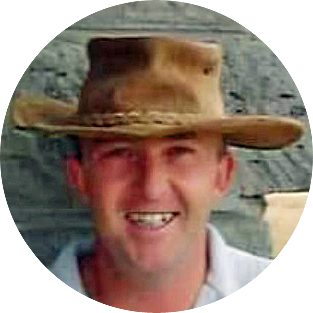
Kigali, Rwanda 13th Sept 2006
Ep. 3: It’s not because you are white young Jarvo
The fun and games continued in Enugu as the rain relentlessly pelted down, devastating poor Terrys’ valuable pool time. Prat that I was, I helpfully pointed out that the captain of the aircraft looked a little tired… completely shagged out more like.
It turned out that they had been flying to Darfur and back, an eight hour round trip, and then doing a couple of private runs to Lagos and back on the fuel NATO had been paying for. Effectively, the captain had been getting about five hours sleep each night which was scandalous never mind bloody dangerous.
I had run fowl of aircrew rest time before. An aircraft captain in Sri Lanka, who shall remain nameless, announced loudly one morning that his fourteen hours crew rest started right now, after I said a cheery good morning to him while he sunbathed at the pool. He was due to fly that evening and had already been on the ground for forty eight hours so he wreaked havoc with our flow plan. What a complete twat, I think he left and joined the Royal Australian Air Force, good luck to them. He did make the mistake of leaving his hat in Colombo when he left which made an excellent urinal.
Conversely, In Nairobi one of our RAF Tristar aircraft was surprisingly delayed. I sent all the passengers back to their barracks after explaining to all and sundry about crew rest time. That night a very irate Colonel called and woke me up. “What the f*ck is going on here, these people are military, why are they lounging in a four star hotel while we rot in these barracks?” He screeched. “I can march my men into battle after two hours sleep”.
I took a deep breath “Sir, do your troops have to march along internationally recognised air corridors and are they subject to laws laid down by the Civil Aviation Authority concerning fitness to operate an aircraft?” “No, of course not,” he blustered. “Well f*ck off then,” I suggested before returning to my rudely interrupted sleep. He actually apologised the next morning just when I was expecting all hell to break loose.
Aircrew have always been the bane of my life. Do you know the easiest way to find out who is a pilot at a party? Well you don’t need to; he will tell you he’s a pilot anyway. How many pilots does it take to change a light bulb? Just one, he holds the bulb while the world revolves around him. It’s dead easy to confuse a pilot, just ask him what the difference is between Light and Hard, it's simple really, you can sleep with a light on.
However, having made the point about flying when knackered to the aircraft captain in Enugu, I stood pissed wet through at a dark and closed aircraft with a hundred and seventeen grumpy looking civilian policeman glaring at me while he enjoyed his full eight hours off. A fine example of how to make one’s self popular with people who were already getting shat on enough as it was. When he eventually did pitch up at the airport, he gave me the smuggest of smug smiles I had ever seen and I felt my hand twitching involuntarily towards the Colonel's pistol, restraint Jarvo... he was probably trained by the French!
It turned out that they had been flying to Darfur and back, an eight hour round trip, and then doing a couple of private runs to Lagos and back on the fuel NATO had been paying for. Effectively, the captain had been getting about five hours sleep each night which was scandalous never mind bloody dangerous.
I had run fowl of aircrew rest time before. An aircraft captain in Sri Lanka, who shall remain nameless, announced loudly one morning that his fourteen hours crew rest started right now, after I said a cheery good morning to him while he sunbathed at the pool. He was due to fly that evening and had already been on the ground for forty eight hours so he wreaked havoc with our flow plan. What a complete twat, I think he left and joined the Royal Australian Air Force, good luck to them. He did make the mistake of leaving his hat in Colombo when he left which made an excellent urinal.
Conversely, In Nairobi one of our RAF Tristar aircraft was surprisingly delayed. I sent all the passengers back to their barracks after explaining to all and sundry about crew rest time. That night a very irate Colonel called and woke me up. “What the f*ck is going on here, these people are military, why are they lounging in a four star hotel while we rot in these barracks?” He screeched. “I can march my men into battle after two hours sleep”.
I took a deep breath “Sir, do your troops have to march along internationally recognised air corridors and are they subject to laws laid down by the Civil Aviation Authority concerning fitness to operate an aircraft?” “No, of course not,” he blustered. “Well f*ck off then,” I suggested before returning to my rudely interrupted sleep. He actually apologised the next morning just when I was expecting all hell to break loose.
Aircrew have always been the bane of my life. Do you know the easiest way to find out who is a pilot at a party? Well you don’t need to; he will tell you he’s a pilot anyway. How many pilots does it take to change a light bulb? Just one, he holds the bulb while the world revolves around him. It’s dead easy to confuse a pilot, just ask him what the difference is between Light and Hard, it's simple really, you can sleep with a light on.
However, having made the point about flying when knackered to the aircraft captain in Enugu, I stood pissed wet through at a dark and closed aircraft with a hundred and seventeen grumpy looking civilian policeman glaring at me while he enjoyed his full eight hours off. A fine example of how to make one’s self popular with people who were already getting shat on enough as it was. When he eventually did pitch up at the airport, he gave me the smuggest of smug smiles I had ever seen and I felt my hand twitching involuntarily towards the Colonel's pistol, restraint Jarvo... he was probably trained by the French!
When the aircraft had left, I found my ride back to the hotel most interesting as I was on my own in the bus and the two army escorts decided for a bit of light entertainment, that they would take umbrage with anyone who crossed our path, especially cyclists or people on motorbikes, easy with an assault rifle poking out the window.
Despite the fact that Nigeria remains one of Africa’s major oil producing countries, there were always long queues at any gas station which made getting petrol huge fun. Our glorious and valiant escort would steam to the front of the queue and fan out with weapons pointed and arms waving to clear everyone out of the way while we filled up. Terry and I just hunched down embarrassed in our seats. Being in the military certainly had its advantages there. My mate Flt Lt Sully, him of the helmet and wellies, was all excited because he was due to go off to Italy for a training course on the following Saturday. He was told yesterday, which was Tuesday. The military administration guy who told him the good news, amazingly couldn’t remember if it was for six weeks or six months so Sully was at a complete loss as to what clothes to pack. I spent a futile twenty minutes or so explaining the concept of blizzards, snow, ice and consequently, water freezing outside of a fridge and then gave up and just told him to take a woolly hat and his best wellies.
I was working alone that day because dear Terry had pulled a stomach cramp sicky and was refusing to come out of his room. He had been complaining of a stomach problem for a few days which suddenly came to a violent head at the airport and resulted in him having an emergency evacuation in more ways than one, fewer clothes to carry for him I suspected. Anyway he was in bed whimpering while I did all the work again… bloody malingerer! In an attempt to get him off the toilet and back to work, I supplied Tel with every drug I could find that hinted at curing his list of symptoms from my bulging medical kit.
I can remember being with a big barrel-chested Scot called Dougie Milne in Chad. We were cutting a road to the next working area when we got the Bulldozer grounded in a small river bed. As they always seemed to do, the locals appeared from nowhere to watch what was going on. Dougie was busy digging out under the bulldozer when he came up too quickly banged his back on the underside of the cab. Almost immediately a group of ladies surrounded him and starting gently rubbing his back and softly cooing while Dougie stood there rigid and looking rather worried. Dougie had a mat of hair across his chest and stomach which they began to thread with porcupine quills until it looked like a breastplate. “What do I do?” he asked me “Just let them get on with it” I said. They had obviously not seen Europeans before and once they had become braver, started painfully pulling the hairs on my legs. The locals helped us dig out the vehicle and as a bit of a payback I treated a guy with a nasty looking wound on his leg.
Waving a cheery goodbye we drove away shedding quills out of the window as we went. The next morning there was a queue of people at our camp awaiting a medical consultation. I did my best but ended up spending an inordinate amount of time driving people up and down our new road to the nearest medical clinic.
Sat in the reception area of the hotel in Enugu, I was having real snags getting our next route sorted through Nairobi with the crap phones and irritatingly slow Internet so it looked as though I would have to wing transport and accommodation when we eventually got there. At least it would be more like home ground for me so I wasn’t too worried. I felt that I would miss all the guys here. All my previous misconceptions about Nigeria had seemingly evaporated. Lt Col Azinta was a total star if a little prone to try and hold my hand which I found a tad disconcerting. Terry however, would hold hands with anyone.
Despite the fact that Nigeria remains one of Africa’s major oil producing countries, there were always long queues at any gas station which made getting petrol huge fun. Our glorious and valiant escort would steam to the front of the queue and fan out with weapons pointed and arms waving to clear everyone out of the way while we filled up. Terry and I just hunched down embarrassed in our seats. Being in the military certainly had its advantages there. My mate Flt Lt Sully, him of the helmet and wellies, was all excited because he was due to go off to Italy for a training course on the following Saturday. He was told yesterday, which was Tuesday. The military administration guy who told him the good news, amazingly couldn’t remember if it was for six weeks or six months so Sully was at a complete loss as to what clothes to pack. I spent a futile twenty minutes or so explaining the concept of blizzards, snow, ice and consequently, water freezing outside of a fridge and then gave up and just told him to take a woolly hat and his best wellies.
I was working alone that day because dear Terry had pulled a stomach cramp sicky and was refusing to come out of his room. He had been complaining of a stomach problem for a few days which suddenly came to a violent head at the airport and resulted in him having an emergency evacuation in more ways than one, fewer clothes to carry for him I suspected. Anyway he was in bed whimpering while I did all the work again… bloody malingerer! In an attempt to get him off the toilet and back to work, I supplied Tel with every drug I could find that hinted at curing his list of symptoms from my bulging medical kit.
I can remember being with a big barrel-chested Scot called Dougie Milne in Chad. We were cutting a road to the next working area when we got the Bulldozer grounded in a small river bed. As they always seemed to do, the locals appeared from nowhere to watch what was going on. Dougie was busy digging out under the bulldozer when he came up too quickly banged his back on the underside of the cab. Almost immediately a group of ladies surrounded him and starting gently rubbing his back and softly cooing while Dougie stood there rigid and looking rather worried. Dougie had a mat of hair across his chest and stomach which they began to thread with porcupine quills until it looked like a breastplate. “What do I do?” he asked me “Just let them get on with it” I said. They had obviously not seen Europeans before and once they had become braver, started painfully pulling the hairs on my legs. The locals helped us dig out the vehicle and as a bit of a payback I treated a guy with a nasty looking wound on his leg.
Waving a cheery goodbye we drove away shedding quills out of the window as we went. The next morning there was a queue of people at our camp awaiting a medical consultation. I did my best but ended up spending an inordinate amount of time driving people up and down our new road to the nearest medical clinic.
Sat in the reception area of the hotel in Enugu, I was having real snags getting our next route sorted through Nairobi with the crap phones and irritatingly slow Internet so it looked as though I would have to wing transport and accommodation when we eventually got there. At least it would be more like home ground for me so I wasn’t too worried. I felt that I would miss all the guys here. All my previous misconceptions about Nigeria had seemingly evaporated. Lt Col Azinta was a total star if a little prone to try and hold my hand which I found a tad disconcerting. Terry however, would hold hands with anyone.
The staff at the hotel were also constantly telling us how they would miss us, probably because the bar profits would drastically slump. Some of the Nigerians liked to call us Whitey but I wasn’t sure that I should reciprocate the banter; Terry’s surname is actually White which seemed to cause enormous amusement amongst the Africans, I loved the fact that whenever we got messed about he could say ‘Is it because I’m White?’. We handed over wads of cash for our tickets at the airport check-in and after a tearful goodbye to the guys we were off back to Lagos.
It was bucketing down with rain in Lagos for a change and we sat outside the terminal where we could just about stay dry under a parapet and waited an hour for Sunday, our driver, to eventually turn up. The roads were total chaos due to the weather, huge puddles of unknown depth were everywhere but we eventually arrived safely at the Hotel Continental and forgetting that we had worked for the best part of twenty four hours, proceeded to get very quickly drunk and full of goat.
Forget what I said about misconceptions. The next morning Lagos international airport was absolutely chocked full of total and utter gits. It was hassle, hassle, grief and more hassle all the way. At the check-in desk, the irritating little shit of a girl behind the safety of the counter kept wittering on about wanting ‘something small’. I misunderstood at first thinking she was referring to Terry’s manhood and then it was followed by ‘I need some breakfast’, and then ‘you have excess baggage and must pay’. Honestly, it was worse than flying Ryanair but only just. At least you weren’t jailed for daring to have a suitcase for the hold or failing to have a printer to print your boarding pass.
The check-in girl was speaking in barely a whisper and as Terry was struggling to understand the way that Africans spoke at the best of times, that was probably a good thing, I chose to ignore the woman completely. Finally she checked us in without getting a damn cent, we were then confronted by overly officious customs officials who wanted all our bags opened up and again it was ‘I need some breakfast’. It was heavily implied that it could be made very difficult for us otherwise, as they emptied the contents of our suitcases onto the table looking for something they fancied. Even the guy who took the bags away was at it. I steadfastly ignored all of them and hoped for the best but I did resort to blatantly noting down their badge numbers which seemed to have some effect.
Terry, being a nice sort of chap from Left Hand, West Virginia, or somewhere like that, suggested that the next time we should bring a loaf of bread and make sandwiches for everyone. We were immensely relieved that we had decided to arrive at the airport early as it took an eternity to get through to departures. Airside there weren’t any shops, there wasn’t even anywhere to get a nice cup of tea, what a friggin’ dump and it was still pissing down outside.
After the trials and tribulations we encountered at Lagos, Nairobi was a joy. I had spent a wonderful three years in Kenya as the Royal Air Force Liaison Officer (RAFLO) around the turn of the century and would always have fond memories of both the country and the people. I hadn’t worked at the airport for five years and yet one of the airport security guys recognised me immediately, lots of handshaking and asking about families ensued. Terry and I made our way down to immigration and were waved through on military ID cards past the dumbstruck looking tourists. They were obviously mostly Americans. I have always doubted the parentage of Americans as they are always going on about their four fathers. Incidentally, why do Americans always insist on dressing in such a stereotypically tourist way, wherever you are in the world you can always spot a Spam. The same goes for the Germans of course, mullet haircuts and dodgy moustaches, speedos on the beach and white socks and sandals. The Dutch, seventies fashion sense, big boned, hairy and always with the faint whiff of dairy products about them and what’s worse, their males are just as bad.
It was bucketing down with rain in Lagos for a change and we sat outside the terminal where we could just about stay dry under a parapet and waited an hour for Sunday, our driver, to eventually turn up. The roads were total chaos due to the weather, huge puddles of unknown depth were everywhere but we eventually arrived safely at the Hotel Continental and forgetting that we had worked for the best part of twenty four hours, proceeded to get very quickly drunk and full of goat.
Forget what I said about misconceptions. The next morning Lagos international airport was absolutely chocked full of total and utter gits. It was hassle, hassle, grief and more hassle all the way. At the check-in desk, the irritating little shit of a girl behind the safety of the counter kept wittering on about wanting ‘something small’. I misunderstood at first thinking she was referring to Terry’s manhood and then it was followed by ‘I need some breakfast’, and then ‘you have excess baggage and must pay’. Honestly, it was worse than flying Ryanair but only just. At least you weren’t jailed for daring to have a suitcase for the hold or failing to have a printer to print your boarding pass.
The check-in girl was speaking in barely a whisper and as Terry was struggling to understand the way that Africans spoke at the best of times, that was probably a good thing, I chose to ignore the woman completely. Finally she checked us in without getting a damn cent, we were then confronted by overly officious customs officials who wanted all our bags opened up and again it was ‘I need some breakfast’. It was heavily implied that it could be made very difficult for us otherwise, as they emptied the contents of our suitcases onto the table looking for something they fancied. Even the guy who took the bags away was at it. I steadfastly ignored all of them and hoped for the best but I did resort to blatantly noting down their badge numbers which seemed to have some effect.
Terry, being a nice sort of chap from Left Hand, West Virginia, or somewhere like that, suggested that the next time we should bring a loaf of bread and make sandwiches for everyone. We were immensely relieved that we had decided to arrive at the airport early as it took an eternity to get through to departures. Airside there weren’t any shops, there wasn’t even anywhere to get a nice cup of tea, what a friggin’ dump and it was still pissing down outside.
After the trials and tribulations we encountered at Lagos, Nairobi was a joy. I had spent a wonderful three years in Kenya as the Royal Air Force Liaison Officer (RAFLO) around the turn of the century and would always have fond memories of both the country and the people. I hadn’t worked at the airport for five years and yet one of the airport security guys recognised me immediately, lots of handshaking and asking about families ensued. Terry and I made our way down to immigration and were waved through on military ID cards past the dumbstruck looking tourists. They were obviously mostly Americans. I have always doubted the parentage of Americans as they are always going on about their four fathers. Incidentally, why do Americans always insist on dressing in such a stereotypically tourist way, wherever you are in the world you can always spot a Spam. The same goes for the Germans of course, mullet haircuts and dodgy moustaches, speedos on the beach and white socks and sandals. The Dutch, seventies fashion sense, big boned, hairy and always with the faint whiff of dairy products about them and what’s worse, their males are just as bad.
We got ourselves downstairs and our bags finally appeared on the deafeningly clunky baggage conveyor, thank god, and we emerged into the battlefield that constituted the arrivals concourse at Jomo Kenyatta International Airport. I had just started the opening haggling encounter with a taxi driver, when a chap named Walter, who worked for the Grand Regency Hotel appeared from nowhere and said ‘Davis’ (why they could never get David Jarvis I don’t know) ‘I thought it was you, I saw your name on your suitcase... Davis’. Terry and I impulsively glanced down at my case where in big white letters was clearly painted the word ‘JARVIS’. Anyway, Walter sorted out a driver at a price I liked even though we weren’t even planning on staying at The Grand Regency, and off we went.
I loved seeing that rich red earth again, the big sky and enjoyed the hustle and bustle that is downtown Nairobi. I had missed Kenya. At the Hilton I contracted the driver, who was also named David, for the weekend and arranged a pickup for the morning. Thankfully, the Hilton had two rooms available and as we were both pretty knackered, we decided to enjoy a quiet night in the Jockey Pub in the hotel fighting off the irritatingly persistent prostitutes and then went off to bed.
The next morning, David picked us up as arranged and we headed for the Sarit Shopping Centre in the Westlands area of Nairobi to pick up some bulk supplies of food, sugar, salt and toothbrushes and then headed off north to Uplands to visit The New Hope Childrens home and hopefully see some old friends. During my time in Kenya I had built up a relationship with the home and its manager Ann Chege, a lovely woman and the girls who were fantastic. David had only one cassette in the car, yes cassette, and it was the ‘Twenty Best Country Music Suicide Songs Ever!!! However, the ride out of Nairobi towards the Rift Valley was great and we wound our way up to 8000 ft while I tried to remember where the turning for the home was.
It turned out that the children’s home was almost opposite David’s Fathers farm so he was happy as well. We were greeted very warmly by the girls and they seemed very pleased to see me again and even more pleased that I had brought a friend with me. We were dragged around every inch of the home which was still largely under construction, handed over our bags of goodies, had some lunch, enjoyed lots of singing and got generally hugged to bits. I had always enjoyed doing the little I did to make a bit of a difference in Kenya.
I had a friend called Grace at Dagoretti Childrens Centre who I loved to bits. Poor Grace could only shuffle along could barely speak and found it difficult to keep herself clean but she gave me such unconditional love despite covering me with snot and dribble. I gave Grace the job of handing the British High Commissioner a pair of scissors for cutting the ribbon to open a special needs class I had built, mainly for her. The poor man looked very nervous as she thrust them towards him. Her teacher showed me her schoolbook one day and she had written my name at the top of every page.
I was gutted when I visited Dagoretti with Andy Grist and Chris Owen as part of a DTMA charity project in 2004, that I couldn’t find Grace. The management had changed since I had left Kenya and seemed a little too uninterested in what was going for my taste. I hoped my Grace was ok wherever she was. On that same trip, the three of us also visited the Abandoned Baby Centre and of course New Hope. It was tough for us to keep our eyes dry.
It cost very little to make a difference. I remember a British soldier who had been in my office waiting for a civil flight home and watching me sorting out school books, going through his pockets looking for Kenyan shillings to give me. He apologised because he could only rustle up thirty shillings, about twenty cents, not realising he had just given a child another month in school.
I loved seeing that rich red earth again, the big sky and enjoyed the hustle and bustle that is downtown Nairobi. I had missed Kenya. At the Hilton I contracted the driver, who was also named David, for the weekend and arranged a pickup for the morning. Thankfully, the Hilton had two rooms available and as we were both pretty knackered, we decided to enjoy a quiet night in the Jockey Pub in the hotel fighting off the irritatingly persistent prostitutes and then went off to bed.
The next morning, David picked us up as arranged and we headed for the Sarit Shopping Centre in the Westlands area of Nairobi to pick up some bulk supplies of food, sugar, salt and toothbrushes and then headed off north to Uplands to visit The New Hope Childrens home and hopefully see some old friends. During my time in Kenya I had built up a relationship with the home and its manager Ann Chege, a lovely woman and the girls who were fantastic. David had only one cassette in the car, yes cassette, and it was the ‘Twenty Best Country Music Suicide Songs Ever!!! However, the ride out of Nairobi towards the Rift Valley was great and we wound our way up to 8000 ft while I tried to remember where the turning for the home was.
It turned out that the children’s home was almost opposite David’s Fathers farm so he was happy as well. We were greeted very warmly by the girls and they seemed very pleased to see me again and even more pleased that I had brought a friend with me. We were dragged around every inch of the home which was still largely under construction, handed over our bags of goodies, had some lunch, enjoyed lots of singing and got generally hugged to bits. I had always enjoyed doing the little I did to make a bit of a difference in Kenya.
I had a friend called Grace at Dagoretti Childrens Centre who I loved to bits. Poor Grace could only shuffle along could barely speak and found it difficult to keep herself clean but she gave me such unconditional love despite covering me with snot and dribble. I gave Grace the job of handing the British High Commissioner a pair of scissors for cutting the ribbon to open a special needs class I had built, mainly for her. The poor man looked very nervous as she thrust them towards him. Her teacher showed me her schoolbook one day and she had written my name at the top of every page.
I was gutted when I visited Dagoretti with Andy Grist and Chris Owen as part of a DTMA charity project in 2004, that I couldn’t find Grace. The management had changed since I had left Kenya and seemed a little too uninterested in what was going for my taste. I hoped my Grace was ok wherever she was. On that same trip, the three of us also visited the Abandoned Baby Centre and of course New Hope. It was tough for us to keep our eyes dry.
It cost very little to make a difference. I remember a British soldier who had been in my office waiting for a civil flight home and watching me sorting out school books, going through his pockets looking for Kenyan shillings to give me. He apologised because he could only rustle up thirty shillings, about twenty cents, not realising he had just given a child another month in school.
Visiting the New Hope Childrens home again was an emotional experience and I’m sure we gained far more out of it than they did. It was a salutary lesson that it is possible to be happy with so little and it was a wonderful day, hard to leave. We eventually dragged ourselves away, bumped into David’s father on the road (almost literally), and to the tune of ‘I want to kill you, your family and all your steers for leaving me’ on the steel guitar, we set off back to the bustling metropolis of Nairobi.
On route we decided to have a quick stop at one of the Rift Valley view points, a place which always causes a sharp intake of breath, awesome view. Terry wanted to buy some nick-nacks and paid well over the top as would become his habit. I talked him out of buying an African mask by telling him of the disaster that befell a friend of mine, Andy Berkhold, when I was still in the Army. Andy had been detached to Kenya for a few months and whilst there, he had purchased a hideous looking mask. When I met Andy, we were stationed at the School of Military Survey near Newbury and our single rooms were small but functional. We had a bed, a fitted wardrobe unit and at the end of the room a sink with a mirror above and opposite the sink, a table with a pin board above. Andy hung up his prized African mask on the pin board for some decoration. One night having imbibed a little too much, he awoke in the middle of the night and being too lazy to put on some clothes and wander down the corridor to the bathroom, he decided to have a pee in his sink. He emptied his bladder with great relief while admiring himself in the mirror. It was only the next morning when he was attempting to peel damp pound notes off his table that he realised he hadn’t been admiring himself in the mirror at all, but had in fact been staring at the mask and had pissed all over his table and thus all his personal effects he had left strewn there. Not content with being embarrassed and keeping it to himself, he bought his mid morning pie and cup of tea with a very soggy pound note. Incidentally, there are only two kinds of officer in the Royal Air Force, those who piss in their sinks and those who lie about it.
Both Terry and I had very sticky heads from being stroked by the children at the New Hope home and we were generally pretty filthy. Of course, being in transit and unwilling to unpack, we were fairly clothes critical. Terry liked to have his fill of meat to eat so we decided to go to a restaurant I knew called Carnivores, for dinner. This was a true mans world. There was a massive pit with huge lumps of road kill roasting on swords over it and the Tusker beer flowed like... well beer, all it needed was a hairdressers and a shoe shop to keep the women happy. Being blokes we skipped the soup and salad that was on offer and headed straight for the meat. With the perilous state of Terry’s stomach this was like Russian roulette but we gorged happily away at a token baked potato, beef, pork, lamb, sausages, ostrich, camel, crocodile and a few unidentifiable bits before finally knocking over the flag on the table to signify defeat. We waddled back to the hotel feeling totally stuffed. I decided to put a roll of toilet paper in the fridge for the morning just in case.
I was sorry to have to leave Nairobi again. It had changed so much in the intervening five years. It seemed much quieter, more cosmopolitan, far safer and extremely friendly. I think I liked it because it had a similar sort of diversity to Leicester where I was brought up, so it felt like home to me. We paid off David our driver, somewhat furtively as he suspected the Police would rob him if he was seen getting paid in cash. Incidentally, I remember Joseph, my assistant when I worked in Nairobi, arriving late for work one day after being robbed by armed men at his home. I asked him if he had called the Police and he said ‘It was the Police’. Joseph was my hero. He was a polite, little, grey haired gentleman who was forever polishing things. I was constantly dispatching him on tasks while I cracked on with things in the office, such as paying bills, fetching the kids from school or shopping on top of his primary role of keeping me high on caffeine. One day I was ordered to put some pictures up around the house. I had those pathetic brass hook things which just bent on contact with the concrete walls. I decided I probably needed masonry nails and asked the boss how many I would need, “twenty” she said. So I asked Joseph to pop out and buy the required amount of one inch masonry nails. He was gone for hours and eventually returned empty handed. “No luck, Joseph?” I said. “No Sir, I couldn’t find a twenty-one inch masonry nail."
On route we decided to have a quick stop at one of the Rift Valley view points, a place which always causes a sharp intake of breath, awesome view. Terry wanted to buy some nick-nacks and paid well over the top as would become his habit. I talked him out of buying an African mask by telling him of the disaster that befell a friend of mine, Andy Berkhold, when I was still in the Army. Andy had been detached to Kenya for a few months and whilst there, he had purchased a hideous looking mask. When I met Andy, we were stationed at the School of Military Survey near Newbury and our single rooms were small but functional. We had a bed, a fitted wardrobe unit and at the end of the room a sink with a mirror above and opposite the sink, a table with a pin board above. Andy hung up his prized African mask on the pin board for some decoration. One night having imbibed a little too much, he awoke in the middle of the night and being too lazy to put on some clothes and wander down the corridor to the bathroom, he decided to have a pee in his sink. He emptied his bladder with great relief while admiring himself in the mirror. It was only the next morning when he was attempting to peel damp pound notes off his table that he realised he hadn’t been admiring himself in the mirror at all, but had in fact been staring at the mask and had pissed all over his table and thus all his personal effects he had left strewn there. Not content with being embarrassed and keeping it to himself, he bought his mid morning pie and cup of tea with a very soggy pound note. Incidentally, there are only two kinds of officer in the Royal Air Force, those who piss in their sinks and those who lie about it.
Both Terry and I had very sticky heads from being stroked by the children at the New Hope home and we were generally pretty filthy. Of course, being in transit and unwilling to unpack, we were fairly clothes critical. Terry liked to have his fill of meat to eat so we decided to go to a restaurant I knew called Carnivores, for dinner. This was a true mans world. There was a massive pit with huge lumps of road kill roasting on swords over it and the Tusker beer flowed like... well beer, all it needed was a hairdressers and a shoe shop to keep the women happy. Being blokes we skipped the soup and salad that was on offer and headed straight for the meat. With the perilous state of Terry’s stomach this was like Russian roulette but we gorged happily away at a token baked potato, beef, pork, lamb, sausages, ostrich, camel, crocodile and a few unidentifiable bits before finally knocking over the flag on the table to signify defeat. We waddled back to the hotel feeling totally stuffed. I decided to put a roll of toilet paper in the fridge for the morning just in case.
I was sorry to have to leave Nairobi again. It had changed so much in the intervening five years. It seemed much quieter, more cosmopolitan, far safer and extremely friendly. I think I liked it because it had a similar sort of diversity to Leicester where I was brought up, so it felt like home to me. We paid off David our driver, somewhat furtively as he suspected the Police would rob him if he was seen getting paid in cash. Incidentally, I remember Joseph, my assistant when I worked in Nairobi, arriving late for work one day after being robbed by armed men at his home. I asked him if he had called the Police and he said ‘It was the Police’. Joseph was my hero. He was a polite, little, grey haired gentleman who was forever polishing things. I was constantly dispatching him on tasks while I cracked on with things in the office, such as paying bills, fetching the kids from school or shopping on top of his primary role of keeping me high on caffeine. One day I was ordered to put some pictures up around the house. I had those pathetic brass hook things which just bent on contact with the concrete walls. I decided I probably needed masonry nails and asked the boss how many I would need, “twenty” she said. So I asked Joseph to pop out and buy the required amount of one inch masonry nails. He was gone for hours and eventually returned empty handed. “No luck, Joseph?” I said. “No Sir, I couldn’t find a twenty-one inch masonry nail."
Joseph was universally loved by the military crews, movers and police transiting through Jomo Kenyatta Airport as he took constant care of my office, tidying up behind people and making endless vats of coffee. As a thank you, they always brought copies of his favourite Top Gear magazine for him as well as a vast range of obnoxious ties for him to wear.
At the check-in desk for the flight to Kigali, and for the first time, Terry failed to get away with his ten kilos of excess baggage but we had to admit that we certainly had a good run with that, we even avoided the charge at Lagos. We ended up sitting in row twelve yet again and I found myself sat next to what looked like a suicide bomber, a woman, who mumbled to herself and rocked back and forth throughout the duration of the flight. She had a face like a bulldog sucking a wasp or someone eating salt and vinegar crisps and I was inevitably unable to stop myself staring at her which she seemed to be enjoying. Despite the high temperature both inside and outside the aircraft, she resembled a Nigerian soldier deploying to Darfur in Arab dress and was patently wearing all her clothes. She must have been a Ryanair frequent flyer. Terry typically, was sat next to a svelte, beautiful, coffee coloured supermodel type who he smoothly persuaded to give us a lift to the Novotel when we arrived in Kigali. While we were still on the ground, the aircraft was disturbingly making all sorts of clunking and belching noises and for the first time in a long while, I was distinctly nervous, luckily it was only an hour and a bit flight to Kigali. On arrival, after tearing myself away from the attention of my erstwhile travelling companion, I found that my suitcase had been forced open and a few things were missing… nice. I was gutted to find out that my nasal hair clippers were missing.
Whilst we were in Nairobi and were searching for accommodation in Kigali, Terry and I had seen mixed reviews of the Novotel on the Internet. Some had said it was clean and nice but one said it was the worst hotel ever, with more prostitutes than residents, but he was French so we ignored that, besides there was a distinctly limited choice available on my budget. It looked fine to me as we signed in at reception and our rooms were comfortable but without air conditioning which was a shame as it felt damn hot and sticky there. With my balcony door and the main door wedged open there was a wonderful breeze through the room. As long as it was safe it would be more than adequate. This was one of the inherent problems I found with the British system of reimbursement. To ensure I got repaid for my hotel bills the hotel had to be within a budget listed for each country in my finance pack. The danger was that, sometimes a hotel within the range allowed wasn’t safe, hygienic or in a decent location to get to work.
I had a mate in Kigali, Steve, who I met and was able to assist, while he was working as a VSO guy (Voluntary Service Overseas) in Kangondi village, Kenya some years previously. He was by no means your normal VSO. When we first met I thought he looked familiar but then I did watch America’s Most Wanted and Crimewatch a lot. Steve, although away working in the Sudan on a mines awareness project, had kindly given me some recommendations on bars and restaurants so we headed for the top one on his list, Bar Arada. We namedropped like mad and had a rather pleasant evening sucking noisily on luscious, tender goat kebabs and supping the local Mustig beer. Just as we were ready to leave, Steve’s wife Sarah dropped by to say hi and luckily gave us a lift home as the taxi had failed to appear. It was only later that Steve told me that she had no driving licence which explained the constant curb bumping and the parking fiasco.
The next morning I sorted out a driver from the massed ranks outside the hotel so we didn’t get stranded by a missing taxi again, just in case, better to be safe than sorry in a strange town. Eddie was his name and he was a young, rangy, cheerful chap with a half decent car, so we jumped in and headed for the Intercontinental Hotel where the American Movements team would be staying to see what it was like. It was nice but horrendously expensive and Tel said the gym and the pool were rubbish which were important factors to him. All things weighed up, the real deciding factor was The Novotel having wireless Internet in the rooms, which for Africa was pretty fast so we decided to stick with that.
At the check-in desk for the flight to Kigali, and for the first time, Terry failed to get away with his ten kilos of excess baggage but we had to admit that we certainly had a good run with that, we even avoided the charge at Lagos. We ended up sitting in row twelve yet again and I found myself sat next to what looked like a suicide bomber, a woman, who mumbled to herself and rocked back and forth throughout the duration of the flight. She had a face like a bulldog sucking a wasp or someone eating salt and vinegar crisps and I was inevitably unable to stop myself staring at her which she seemed to be enjoying. Despite the high temperature both inside and outside the aircraft, she resembled a Nigerian soldier deploying to Darfur in Arab dress and was patently wearing all her clothes. She must have been a Ryanair frequent flyer. Terry typically, was sat next to a svelte, beautiful, coffee coloured supermodel type who he smoothly persuaded to give us a lift to the Novotel when we arrived in Kigali. While we were still on the ground, the aircraft was disturbingly making all sorts of clunking and belching noises and for the first time in a long while, I was distinctly nervous, luckily it was only an hour and a bit flight to Kigali. On arrival, after tearing myself away from the attention of my erstwhile travelling companion, I found that my suitcase had been forced open and a few things were missing… nice. I was gutted to find out that my nasal hair clippers were missing.
Whilst we were in Nairobi and were searching for accommodation in Kigali, Terry and I had seen mixed reviews of the Novotel on the Internet. Some had said it was clean and nice but one said it was the worst hotel ever, with more prostitutes than residents, but he was French so we ignored that, besides there was a distinctly limited choice available on my budget. It looked fine to me as we signed in at reception and our rooms were comfortable but without air conditioning which was a shame as it felt damn hot and sticky there. With my balcony door and the main door wedged open there was a wonderful breeze through the room. As long as it was safe it would be more than adequate. This was one of the inherent problems I found with the British system of reimbursement. To ensure I got repaid for my hotel bills the hotel had to be within a budget listed for each country in my finance pack. The danger was that, sometimes a hotel within the range allowed wasn’t safe, hygienic or in a decent location to get to work.
I had a mate in Kigali, Steve, who I met and was able to assist, while he was working as a VSO guy (Voluntary Service Overseas) in Kangondi village, Kenya some years previously. He was by no means your normal VSO. When we first met I thought he looked familiar but then I did watch America’s Most Wanted and Crimewatch a lot. Steve, although away working in the Sudan on a mines awareness project, had kindly given me some recommendations on bars and restaurants so we headed for the top one on his list, Bar Arada. We namedropped like mad and had a rather pleasant evening sucking noisily on luscious, tender goat kebabs and supping the local Mustig beer. Just as we were ready to leave, Steve’s wife Sarah dropped by to say hi and luckily gave us a lift home as the taxi had failed to appear. It was only later that Steve told me that she had no driving licence which explained the constant curb bumping and the parking fiasco.
The next morning I sorted out a driver from the massed ranks outside the hotel so we didn’t get stranded by a missing taxi again, just in case, better to be safe than sorry in a strange town. Eddie was his name and he was a young, rangy, cheerful chap with a half decent car, so we jumped in and headed for the Intercontinental Hotel where the American Movements team would be staying to see what it was like. It was nice but horrendously expensive and Tel said the gym and the pool were rubbish which were important factors to him. All things weighed up, the real deciding factor was The Novotel having wireless Internet in the rooms, which for Africa was pretty fast so we decided to stick with that.
Back at the Novotel, I negotiated at the front desk to get our breakfast included in the room price and we finally managed to unpack. We then met up with Lt Col Gohima our Rwandan Liaison Officer who seemed a jolly sort of bloke and offered to get our room rate reduced if he could... he couldn’t. He also announced glibly that they would not be rotating their troops until the AU mandate in the Sudan had been extended. If true, this meant that we would be unlikely to see an aircraft for at least six days and maybe not at all. I called Rafa in Addis Ababa and passed on this bombshell, we were instructed to sit tight in Kigali, I suspected they were already aware of the situation. There were worse places we could be stuck in to be honest, Kigali was built on hills, had a small town feel to it, was neat and tidy and seemed safe. The power was constant although the water was a little more unpredictable both in terms of volume and colour.
While we were exploring the town with the car window open there was that unmistakably, welcoming wood smoke smell I would always associate with Africa. That’s the romantic in me speaking, the most common smells are exhaust fumes, sewerage, decay and that sweet sickly death smell, once sniffed, never forgotten.
Whilst we were there, I figured that I would try and sort out a trip for Tel and I to see the Mountain Gorillas despite my previous poor record with Simians. Back in the distant past in Chad I had been cutting the roads and survey lines for the Oil Exploration crews through the bush. The lines had to be dead straight and were up to 50km long so everything had to be bulldozed out of the way. However, link roads could weave as much as I saw fit so normally after cutting the lines, I would find a suitable clearing for a camp site and then cut roads between the site and the lines trying to cause as little damage as possible. One day while line-cutting, the bulldozer felled a tree and a small monkey dropped down on to the roof of the cab and refused to move.
I decided to adopt the poor creature as some recompense for having rudely devastated its environment and took it back to camp. It was fun for a few days but then it turned distinctly obnoxious, stealing food off plates, constantly knocking drinks over and hanging its red arse over the edge of the table and kindly shitting in your lap. It was like having a toddler around. I was instructed to get rid of it. We sadly left the camp in my Land Cruiser with it doing that big sad eye thing, and drove the winding track to the first survey line and then a few kilometres along it before I wound down the window and hurled it into the bush before accelerating away a tear in my eye.
When I got back to camp and still feeling a bit miserable, I went to the store tent to get some more beer only to find the bloody monkey sat on top of the beer cases eating a banana. My five km drive to dump him was actually only five hundred metres as the crow flies so he had easily managed to beat me back to camp.
To show his contempt for me, he shat on the beer and threw the banana skin at me, what a gentleman.
In Kenya I had seen Vervet monkeys stealing food and whatever they could from unsuspecting tourists. They were a pain in the arse but could also be very funny, I remember one stealing a camera and spending hilarious hours sitting in a tree photographing its genitals. It was the monkey version of Terry. I even found one sitting in my living room watching television one day; I was quite chuffed at the time as he had managed to find the missing remote control. I still wanted to see the Gorillas though, but for now it was back to sitting and waiting, with the phone and laptop constantly to hand, for something to happen, sums up my career path perfectly. At least I could glance out of the window occasionally and make sure Terry was alright by the pool.
While we were exploring the town with the car window open there was that unmistakably, welcoming wood smoke smell I would always associate with Africa. That’s the romantic in me speaking, the most common smells are exhaust fumes, sewerage, decay and that sweet sickly death smell, once sniffed, never forgotten.
Whilst we were there, I figured that I would try and sort out a trip for Tel and I to see the Mountain Gorillas despite my previous poor record with Simians. Back in the distant past in Chad I had been cutting the roads and survey lines for the Oil Exploration crews through the bush. The lines had to be dead straight and were up to 50km long so everything had to be bulldozed out of the way. However, link roads could weave as much as I saw fit so normally after cutting the lines, I would find a suitable clearing for a camp site and then cut roads between the site and the lines trying to cause as little damage as possible. One day while line-cutting, the bulldozer felled a tree and a small monkey dropped down on to the roof of the cab and refused to move.
I decided to adopt the poor creature as some recompense for having rudely devastated its environment and took it back to camp. It was fun for a few days but then it turned distinctly obnoxious, stealing food off plates, constantly knocking drinks over and hanging its red arse over the edge of the table and kindly shitting in your lap. It was like having a toddler around. I was instructed to get rid of it. We sadly left the camp in my Land Cruiser with it doing that big sad eye thing, and drove the winding track to the first survey line and then a few kilometres along it before I wound down the window and hurled it into the bush before accelerating away a tear in my eye.
When I got back to camp and still feeling a bit miserable, I went to the store tent to get some more beer only to find the bloody monkey sat on top of the beer cases eating a banana. My five km drive to dump him was actually only five hundred metres as the crow flies so he had easily managed to beat me back to camp.
To show his contempt for me, he shat on the beer and threw the banana skin at me, what a gentleman.
In Kenya I had seen Vervet monkeys stealing food and whatever they could from unsuspecting tourists. They were a pain in the arse but could also be very funny, I remember one stealing a camera and spending hilarious hours sitting in a tree photographing its genitals. It was the monkey version of Terry. I even found one sitting in my living room watching television one day; I was quite chuffed at the time as he had managed to find the missing remote control. I still wanted to see the Gorillas though, but for now it was back to sitting and waiting, with the phone and laptop constantly to hand, for something to happen, sums up my career path perfectly. At least I could glance out of the window occasionally and make sure Terry was alright by the pool.
Next month, Episode 4: Jarvo meets someone with a hairier back and fights for his reputation.
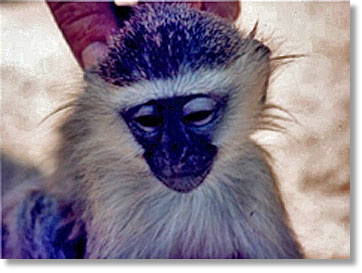
It wasn't cute but it was clever
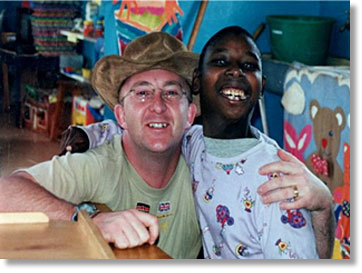
My beautiful Grace
Special needs Terry helps
Jack with his drink problem
Jack with his drink problem
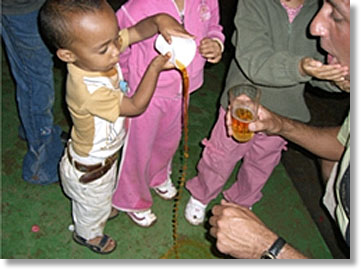
Meanwhile, on a much happier note, Karen and I had realised that we could no longer go more than a day without speaking to each other, she even investigated the possibilities of getting down to Rwanda to see me but the cost was exorbitant. One afternoon I was chatting with Steve in the Sudan on MSN and filled him in on the details of my blossoming relationship with K, ‘Have you seen her bits mate?’ he inquired casually... no I haven’t, ‘Best get a look then, could be a bloke’. This reeked of bitter experience for the man. I discussed this conversation with Terry over breakfast the next morning where I was training the omelette man to produce something edible and not the normal shit he was cooking for the French. Terry explained to me that the Internet is a marvellous tool for establishing whether your loved one was indeed a female. It seemed that a hobby of Terry’s was sending nudey pictures of himself to his missus and vice versa. I vowed to try and broach the subject with Karen… when the time seemed right of course.

From: Brian Lay, Paraparaumu Beach, Kapiti Coast
Subject: Retired and present Wellington Air Movements AMOs
Greetings Tony,
Hope all is going ok for you and family over there in Canada and you are looking after yourself given the current global situation. I have attached a picture of the recent catch-up at Wellington Air Movements in NZ with former AMOs and the present AMO.
L/R: Konrad Putu (Puts), Budgie Baigent, Brian Lay, Steve Knapton and current AMO Paul Renshaw.
Wellington Air Movements handles mostly VIPs and manages all the state visits to NZ and is considered a “perk posting.”
Keep up the fabulous work, best regards to all and stay safe
Brian
Subject: Retired and present Wellington Air Movements AMOs
Greetings Tony,
Hope all is going ok for you and family over there in Canada and you are looking after yourself given the current global situation. I have attached a picture of the recent catch-up at Wellington Air Movements in NZ with former AMOs and the present AMO.
L/R: Konrad Putu (Puts), Budgie Baigent, Brian Lay, Steve Knapton and current AMO Paul Renshaw.
Wellington Air Movements handles mostly VIPs and manages all the state visits to NZ and is considered a “perk posting.”
Keep up the fabulous work, best regards to all and stay safe
Brian
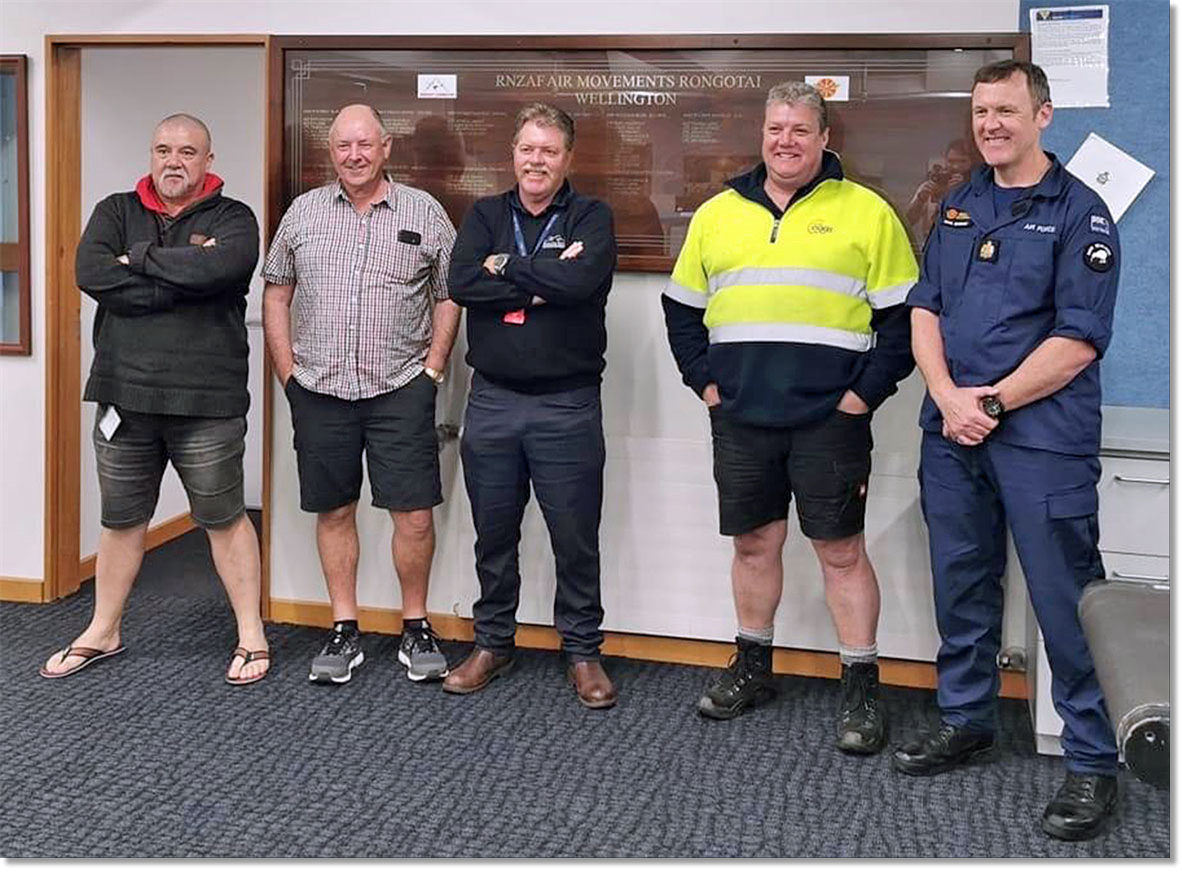
From: Michael Cocker, Swindon, Wilts
Subject: Great Uncle Fred's Diary
Hi Tony,
The Second Anglo Afghan War – 1879 -1881. An account of my Great, Great Uncle, Bty Sgt Maj Frederick Cocker. “G” Battery, 4th Brigade R.A. I have his personally written pages, from around 1890, of his service in India and Afghanistan during the 1870’s/80’s. I find his account fascinating after doing a number of tours in Afghanistan myself, along with a 15 month stint in Kandahar as CATO Manager. What has changed in 150 years?
Subject: Great Uncle Fred's Diary
Hi Tony,
The Second Anglo Afghan War – 1879 -1881. An account of my Great, Great Uncle, Bty Sgt Maj Frederick Cocker. “G” Battery, 4th Brigade R.A. I have his personally written pages, from around 1890, of his service in India and Afghanistan during the 1870’s/80’s. I find his account fascinating after doing a number of tours in Afghanistan myself, along with a 15 month stint in Kandahar as CATO Manager. What has changed in 150 years?
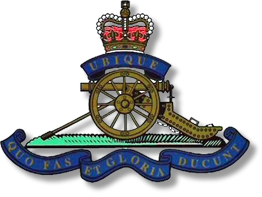
Royal Artillery Cap Badge
Fred's Diary: At the outbreak of hostilities in Afghanistan, I was serving in "G " Battery, 4th Brigade R.A. (now the 69th. Battery R.F.A.) at Mian Mir Barracks, Lahore, in the Punjab. We were ordered to form a portion of the Southern Division for Afghanistan, under the command of General Sir Donald Stewart, who was then commanding the Lahore Division.
After much preparation the Battery was furnished with an extra line of wagons and transport consisting of Bullocks, Camels, Elephants, etc. All N.C.O.'s and men were medically examined and the Battery received orders in September 1878 to proceed to Montgomery by route march.
After much preparation the Battery was furnished with an extra line of wagons and transport consisting of Bullocks, Camels, Elephants, etc. All N.C.O.'s and men were medically examined and the Battery received orders in September 1878 to proceed to Montgomery by route march.
Mian Mir, Lahore - Montgomery - This march was a most tedious one and the roads were so badly cut up that the whole route was ankle deep in dust and we had to put our handkerchiefs over our mouths and nostrils to facilitate breathing and keep away the dust. We could only see a few yards ahead, despite the fact that the vehicles were about fifty yards distance apart.
Montgomery - Mooltan - At Montgomery the Battery rested for a day preparatary to entraining which was done by half — batteries. First the right half battery in which I was a Corporal, entrained on the first morning at about four o'clock. The entraining was carried out most expeditiously, but we had some trouble with some remounts which had just arrived from Australia from Remount Depot, and were still untrained and wild when put into harness. I was personally complimented by my Commanding Officer, Major Sir John Campbell Bart, for the work my men had done so well, in getting the guns, equipment etc. entrained, which I was allotted to carry out. Sir John instructed me to take the men for some refreshment (one pint of beer each) as a reward. Our destination was Mooltan, where we arrived at about six in the evening, detrained all the horses and then encamped for the night.
Montgomery - Mooltan - At Montgomery the Battery rested for a day preparatary to entraining which was done by half — batteries. First the right half battery in which I was a Corporal, entrained on the first morning at about four o'clock. The entraining was carried out most expeditiously, but we had some trouble with some remounts which had just arrived from Australia from Remount Depot, and were still untrained and wild when put into harness. I was personally complimented by my Commanding Officer, Major Sir John Campbell Bart, for the work my men had done so well, in getting the guns, equipment etc. entrained, which I was allotted to carry out. Sir John instructed me to take the men for some refreshment (one pint of beer each) as a reward. Our destination was Mooltan, where we arrived at about six in the evening, detrained all the horses and then encamped for the night.
Mooltan - Succor - Late the following day we entrained by half batteries leaving Mooltan about 4 pm. for Succor. This journey took us about twenty hours during which time we were unbearably crowded together, with all our accoutrements and field kit We could scarcely sit down for the carriages had no hat racks, and all arms, accoutrements and field kit had to be placed under and on the seats whilst the remainder was piled up in the centre of the carriage. It was a most uncomfortable journey owing to our feet being packed so closely together.
About daybreak the following day we arrived at a halting station, but only stopped to water and exercise the horses, as they were also unfortunately crowded in their cattle trucks. The drivers travelled in the trucks with their horses, standing in turn to their horses heads, which had their full harness on. On arrival at this halting station a good proportion of the officers, N.C.O. 's and men were found to be sick with ague (fever similar to malaria) and as I happened to be the senior N.C.O. who had escaped this infection, was kept exceedingly busy. After about two hours our horses being watered and refreshed by food and exercise we restarted our journey to Succor, at which place we arrived about 9 a.m.
Succor - Shikapur - We got to work at once to detrain all horses, guns , ammunition wagons, stores, also Bullock for the third line of wagons, then embarked in flat bottomed boats to cross the River Indus, there being no landing stage, one may guess the difficult task we had. The crossing of the Indus took us two days as we had to go up and down the river to tack the tide and on to Shikapur where we halted for four days whilst we received more transport, mules and camels, also camp equipment. No European tents were taken on service, and in time were issued out with two Sepoy tents per subsection, this being our first experience in pitching these tents, which caused much amusement as they kept doubling up in the centre, but we eventually mastered their peculiarities by persevering.
Shikapur - Jacobabad - The Battery then started on the march for Jacobabad. This was the start of 250 miles to Quetta, most of which was through arid waterless desert. In some of the districts through which we marched the inhabitants had suffered terribly from floods . On the trees the waterline could be seen more than 8 feet up.
Jacobabad - Sibi - We halted at Jacobabad for two days and then continued the march to Sibi at the mouth of the Bolan Pass. During these marches we suffered greatly from thirst as there was no real water supply on this stretch of sandy desert, and the only water available was brackish and if once taken made one feel ill and lethargic and want to fall out of the column and let them go. It was on the fourth day of this march, it being a sand desert that I had my first experience of the hardships we were to endure. I was left in charge of the second and third lines of wagons, Bullock draught, and after marching a few miles it was impossible to get the bullocks to move the wagons. Owing to the sand they could not obtain a footing. I put as many as twenty bullocks in one vehicle but owing to the sand and heat, the latter being unbearable, they could not move it. I then got the escort of the Third Ghurkas to assist by hauling on the drag-ropes, and only by this means were we able to proceed and reach our camp about 8 p.m., being on the road from 6 a.m., and we were not in the least sorry when we eventually reached Sibi.
About daybreak the following day we arrived at a halting station, but only stopped to water and exercise the horses, as they were also unfortunately crowded in their cattle trucks. The drivers travelled in the trucks with their horses, standing in turn to their horses heads, which had their full harness on. On arrival at this halting station a good proportion of the officers, N.C.O. 's and men were found to be sick with ague (fever similar to malaria) and as I happened to be the senior N.C.O. who had escaped this infection, was kept exceedingly busy. After about two hours our horses being watered and refreshed by food and exercise we restarted our journey to Succor, at which place we arrived about 9 a.m.
Succor - Shikapur - We got to work at once to detrain all horses, guns , ammunition wagons, stores, also Bullock for the third line of wagons, then embarked in flat bottomed boats to cross the River Indus, there being no landing stage, one may guess the difficult task we had. The crossing of the Indus took us two days as we had to go up and down the river to tack the tide and on to Shikapur where we halted for four days whilst we received more transport, mules and camels, also camp equipment. No European tents were taken on service, and in time were issued out with two Sepoy tents per subsection, this being our first experience in pitching these tents, which caused much amusement as they kept doubling up in the centre, but we eventually mastered their peculiarities by persevering.
Shikapur - Jacobabad - The Battery then started on the march for Jacobabad. This was the start of 250 miles to Quetta, most of which was through arid waterless desert. In some of the districts through which we marched the inhabitants had suffered terribly from floods . On the trees the waterline could be seen more than 8 feet up.
Jacobabad - Sibi - We halted at Jacobabad for two days and then continued the march to Sibi at the mouth of the Bolan Pass. During these marches we suffered greatly from thirst as there was no real water supply on this stretch of sandy desert, and the only water available was brackish and if once taken made one feel ill and lethargic and want to fall out of the column and let them go. It was on the fourth day of this march, it being a sand desert that I had my first experience of the hardships we were to endure. I was left in charge of the second and third lines of wagons, Bullock draught, and after marching a few miles it was impossible to get the bullocks to move the wagons. Owing to the sand they could not obtain a footing. I put as many as twenty bullocks in one vehicle but owing to the sand and heat, the latter being unbearable, they could not move it. I then got the escort of the Third Ghurkas to assist by hauling on the drag-ropes, and only by this means were we able to proceed and reach our camp about 8 p.m., being on the road from 6 a.m., and we were not in the least sorry when we eventually reached Sibi.
On the second march from Jacobabad, it was discovered one mare belonging to our Battery had broken loose from the horse lines and could not be found. It so happened that one of the Sewars (Trooper) of the Second Punjab Cavalry on vedette duty found her and brought her into camp. This horse had only joined the Battery at Shikapur with others from Remount Depot, and only arrived from Australia recently, therefore was not quite trained and most wild in her actions and on examination it was found by some means her jaw had got splintered and was unfit for draught, and either had to be led, or used as an outrider by using a snaffle bit over her nose. My horse being very good for either Drought or Outrider was put into drought, and I was instructed to take this mare, and do what I could with her.
Instructions received from General Headquarters that a night march would take place after the troops had had a couple of hours rest (Really a forced march). I was warned by the Sergeant Major to prepare camels, with their Mussicks filled and proceed in advance of the troops. This is to provide water if not obtainable on the road when required. Fortunately for me information arrived that water could be obtained at certain places sufficient for all requirements. I was not at all sorry as I did not care for this job of going in advance of the troops by myself. However, I had to take this mare on the road "night march", and during the night after some miles on the road, of course with some nasty experiences, the Veterinary Surgeon came back to me to enquire how the mare was going. During our conversations he struck his flint to light his pipe, causing the mare to take fright, and bolted off with me from the column. I was away for a considerable time — about an hour, before I could discover the whereabouts or direction of the troops, it being 'pitch dark' and in the enemy’s country (though still in India) it was close to dawn when I heard a noise and a slight rising of dust some distance away. I pushed the mare until they saw me and halted for me to rejoin. What a salute I got! (The railway was extended from Succor to Sibi in the winter of 1879-80, 134 miles of track were laid over the flat desert in 101 days .10 to 1 a Scots Engineer was in charge!)
Sibi - Quetta - At Sibi, which lies at the foot of the Himalayan Mountains, we had to obtain all the forage necessary for the Battery's cattle during the eight days march through the Bolan Pass. For three whole days all the N.C.O.s and gunners were busily cutting the high Kirkby grass which grew eight or ten feet high This grass was then bundled up for carriage on the camels of which we must have had one hundred or more. When everything was ready (it was here we should enter the enemy's country) all cavalry, artillery and infantry were brigaded.
The first day's march through the Bolan Pass was felt by all to be a most difficult task. We started early in the evening and marched on through the day, arriving at our objective about the early evening. This march was made along the side of the river which we had to continually cross and re-cross in order to obtain the best passage as there was only a camel track to proceed by. This track had been made by Afghans when transporting their fruits to trade in the Indian markets. The Valley of Afghanistan is noted for the following — grapes, peaches and other fruits which flourish in abundance, India being their greatest market.
On the second day's march when we had arrived at a convenient camping ground, Sergeant Tagg (Acting as Store Sergeant), met with an accident caused by one of the camels, and sprained his back. I was then detailed off to take over the duties of Store Sergeant during his absence. As we were short of N.C.O.s, we had to work strenuously to get through the calls of supervising the work.
Instructions received from General Headquarters that a night march would take place after the troops had had a couple of hours rest (Really a forced march). I was warned by the Sergeant Major to prepare camels, with their Mussicks filled and proceed in advance of the troops. This is to provide water if not obtainable on the road when required. Fortunately for me information arrived that water could be obtained at certain places sufficient for all requirements. I was not at all sorry as I did not care for this job of going in advance of the troops by myself. However, I had to take this mare on the road "night march", and during the night after some miles on the road, of course with some nasty experiences, the Veterinary Surgeon came back to me to enquire how the mare was going. During our conversations he struck his flint to light his pipe, causing the mare to take fright, and bolted off with me from the column. I was away for a considerable time — about an hour, before I could discover the whereabouts or direction of the troops, it being 'pitch dark' and in the enemy’s country (though still in India) it was close to dawn when I heard a noise and a slight rising of dust some distance away. I pushed the mare until they saw me and halted for me to rejoin. What a salute I got! (The railway was extended from Succor to Sibi in the winter of 1879-80, 134 miles of track were laid over the flat desert in 101 days .10 to 1 a Scots Engineer was in charge!)
Sibi - Quetta - At Sibi, which lies at the foot of the Himalayan Mountains, we had to obtain all the forage necessary for the Battery's cattle during the eight days march through the Bolan Pass. For three whole days all the N.C.O.s and gunners were busily cutting the high Kirkby grass which grew eight or ten feet high This grass was then bundled up for carriage on the camels of which we must have had one hundred or more. When everything was ready (it was here we should enter the enemy's country) all cavalry, artillery and infantry were brigaded.
The first day's march through the Bolan Pass was felt by all to be a most difficult task. We started early in the evening and marched on through the day, arriving at our objective about the early evening. This march was made along the side of the river which we had to continually cross and re-cross in order to obtain the best passage as there was only a camel track to proceed by. This track had been made by Afghans when transporting their fruits to trade in the Indian markets. The Valley of Afghanistan is noted for the following — grapes, peaches and other fruits which flourish in abundance, India being their greatest market.
On the second day's march when we had arrived at a convenient camping ground, Sergeant Tagg (Acting as Store Sergeant), met with an accident caused by one of the camels, and sprained his back. I was then detailed off to take over the duties of Store Sergeant during his absence. As we were short of N.C.O.s, we had to work strenuously to get through the calls of supervising the work.
The change of climate was causing much suffering, for the nights were extremely cold especially after the hot weather we had been accustomed to in India and only having one blanket for covering at night, all felt the change very much, causing so many of the troops to suffer from fever and ague. One of our most promising artillery officers was lost through this cause.
On arrival at the camping ground our first job was to attend to the horses and make them as comfortable as possible, which was most difficult owing to the rocky bed, and then we could attend to our needs. On retiring for the night, we had much difficulty in keeping the tents in an upright position, owing to the ground being rocky, no pegs could be used. After about three days rest, Sergeant Tagg returned to duty and I was not sorry.
This work needed ones full attention, for it included the second and third line of ammunition, Wagons, Bullock draught, and owing to the constant crossing of the bed of the river, their hoofs getting wet they could not obtain footing for power to move the vehicles, causing much delay on the road and not arriving into camp till 11 p.m. on one occasion. On the fourth or fifth day of the march we arrived at a place away from the river and no suitable water was obtainable, as the water, it was rumoured, had been tampered with by the enemy and I received orders from my Sergeant Major to mount my horse and proceed round a bend in the Bolan pass to search for any springs of water supplies. I was away from the column for about two hours, going through the different fastnets and over boulders, expecting every minute to be picked off by the many snipers, but I fortunately managed to get back to camp safe and sound, though not before they had become alarmed by my prolonged absence. Night had fallen by the time I arrived back at my Battery, and I was exceedingly lucky to return safely.
During our march through the Bolan Pass, we lost many of the bullocks which were employed for draught in the second and third line of ammunition wagons.
The 11th. Brigade R.G.A. had elephants to drag their guns, bullocks for ammunition wagons, but bullocks when going into action, take the place of elephants as elephants would not face heavy gun fire. The feet of the bullocks suffered badly on the rocky ground they had to pull the wagons over. It was a most painful sight to see the beasts slip and stumble in their endeavours to obtain a footing to get along, but we had no other course to adopt. The weather was most severe and we lost two elephants through the hardships and cold they had to endure.
So, day by day we marched through the Bolan Pass until eventually we were grateful to emerge from the Pass, the sides of which on looking upwards seemed at times to touch each other. On emerging from the Pass we found trouble again as the enemy had got between us and our advance guard (Cavalry Brigade) and poisoned all the water in the wells, and we of the main column were doomed to thirst for 48 hours. The final section was the Khojak Pass which was so steep that guns and vehicles had to be lowered down a specially constructed slide till roads were later cut by the Engineers.
After two days journey we arrived at Quetta, and found it to be a very dismal and cold camp, bounded on one side by bleak mountains. Here we held our Christmas, although actually in the Pass on the 25th of December 1878.
On arrival at the camping ground our first job was to attend to the horses and make them as comfortable as possible, which was most difficult owing to the rocky bed, and then we could attend to our needs. On retiring for the night, we had much difficulty in keeping the tents in an upright position, owing to the ground being rocky, no pegs could be used. After about three days rest, Sergeant Tagg returned to duty and I was not sorry.
This work needed ones full attention, for it included the second and third line of ammunition, Wagons, Bullock draught, and owing to the constant crossing of the bed of the river, their hoofs getting wet they could not obtain footing for power to move the vehicles, causing much delay on the road and not arriving into camp till 11 p.m. on one occasion. On the fourth or fifth day of the march we arrived at a place away from the river and no suitable water was obtainable, as the water, it was rumoured, had been tampered with by the enemy and I received orders from my Sergeant Major to mount my horse and proceed round a bend in the Bolan pass to search for any springs of water supplies. I was away from the column for about two hours, going through the different fastnets and over boulders, expecting every minute to be picked off by the many snipers, but I fortunately managed to get back to camp safe and sound, though not before they had become alarmed by my prolonged absence. Night had fallen by the time I arrived back at my Battery, and I was exceedingly lucky to return safely.
During our march through the Bolan Pass, we lost many of the bullocks which were employed for draught in the second and third line of ammunition wagons.
The 11th. Brigade R.G.A. had elephants to drag their guns, bullocks for ammunition wagons, but bullocks when going into action, take the place of elephants as elephants would not face heavy gun fire. The feet of the bullocks suffered badly on the rocky ground they had to pull the wagons over. It was a most painful sight to see the beasts slip and stumble in their endeavours to obtain a footing to get along, but we had no other course to adopt. The weather was most severe and we lost two elephants through the hardships and cold they had to endure.
So, day by day we marched through the Bolan Pass until eventually we were grateful to emerge from the Pass, the sides of which on looking upwards seemed at times to touch each other. On emerging from the Pass we found trouble again as the enemy had got between us and our advance guard (Cavalry Brigade) and poisoned all the water in the wells, and we of the main column were doomed to thirst for 48 hours. The final section was the Khojak Pass which was so steep that guns and vehicles had to be lowered down a specially constructed slide till roads were later cut by the Engineers.
After two days journey we arrived at Quetta, and found it to be a very dismal and cold camp, bounded on one side by bleak mountains. Here we held our Christmas, although actually in the Pass on the 25th of December 1878.
(Two years before, the Bolan had been pronounced impassable and lacking in water. Now Major General Michael Biddulph had gone ahead with a small force, arriving on the 9th of November, severely depleted by sickness, after a harrowing and under equipped march.)
Quetta - Khandahar - After two days rest, the infantry brigade, by route march proceeded to Khandahar by way of the Khoghot Pass The Cavalry Brigade went by a much shorter route over the Chaman range of hills. The elephant and mountain batteries accompanied the infantry brigade, the whole division became united at the next halt (There was no opposition until 5 January when 50 miles short of Khandahar a large force of Afghans was encountered at the Ghlo Kotal. A short action forced them to retreat, at a cost of 11 British wounded). Eventually we arrived at Khandahar on the 8th of January 1879, but as I was on rear guard duty missed all the excitement of the entrance and march through the city. There were several attempts by some of the inhabitants to molest the stragglers of the column and one young Lieutenant (Royal Engineers) was stabbed, but his assailant was captured. The mortality among baggage animals on the march, had been enormous, nearly 12.000 camels alone had died as a result of the intense cold, biting winds and mistreatment.
The whole of the Division then camped facing the city. The first night I was in charge of the main artillery guard and during the night several attempts were made by marauders to enter the camp. To achieve this the natives dressed themselves in sheep skins and crawled on all fours to evade detection. One of these successfully entered the camp and the patrol of the 19th Bengal Lancers came down and turned out all guards to stand at arms. The culprit was eventually captured and killed as one of the Lancers had thrust his lance through him. (From Lahore to Kandahar had taken from September to 8th January, the heavy part being the 390 miles of mountain and desert from the railhead near Succor.)
Khandahar – Khelat - I - Ghilzai - During the night, Brigade Commanding Officer had received orders for the Infantry Brigade to proceed to Khelat-l-Ghilza, which is some 80 miles from Khandahar, for outpost duty. (Biddulph took the 2nd. Division in the other direction towards the Helmund Province in the east.) The following morning we set out over the rough open country as there were no roads excepting camel tracks. This place was occupied as an outpost to prevent any advance of the enemy from Ghazni (halfway between Khelat and Kabul). We remained at Khelat until the latter part of March. Our position at this place was an extremely strong one, on a promontory which was from 300 to 400 feet high with sides which were virtually perpendicular. The sides were so steep that roads had to be cut in a zig- zag manner to allow the guns and cavalry to get up and take their positions. It was a wonderful stronghold with its unassailable sides and just one entrance. The cold was intense, up to 29 F. of frost, and the animals died in huge numbers. Stewart was at his wits end to feed his troops, and had to send some back to Khandahar, which made the whole exercise largely pointless.
The troops of this outpost were the 2nd Punjab Cavalry, the 59m Foot Regiment, (now East Lancashire), One Field Battery, the 25th Sikhs, the 3rd Ghurkas, 'G' Battery 4th. Brigade Royal Field Artillery and one Mountain Battery and their supplies. We were agreeably surprised to find hot and cold springs at the top of this natural fort. Whilst we were in this position we were cut off by the enemy and compelled to go on short rations, only half ration being issued, for about six weeks.
Quetta - Khandahar - After two days rest, the infantry brigade, by route march proceeded to Khandahar by way of the Khoghot Pass The Cavalry Brigade went by a much shorter route over the Chaman range of hills. The elephant and mountain batteries accompanied the infantry brigade, the whole division became united at the next halt (There was no opposition until 5 January when 50 miles short of Khandahar a large force of Afghans was encountered at the Ghlo Kotal. A short action forced them to retreat, at a cost of 11 British wounded). Eventually we arrived at Khandahar on the 8th of January 1879, but as I was on rear guard duty missed all the excitement of the entrance and march through the city. There were several attempts by some of the inhabitants to molest the stragglers of the column and one young Lieutenant (Royal Engineers) was stabbed, but his assailant was captured. The mortality among baggage animals on the march, had been enormous, nearly 12.000 camels alone had died as a result of the intense cold, biting winds and mistreatment.
The whole of the Division then camped facing the city. The first night I was in charge of the main artillery guard and during the night several attempts were made by marauders to enter the camp. To achieve this the natives dressed themselves in sheep skins and crawled on all fours to evade detection. One of these successfully entered the camp and the patrol of the 19th Bengal Lancers came down and turned out all guards to stand at arms. The culprit was eventually captured and killed as one of the Lancers had thrust his lance through him. (From Lahore to Kandahar had taken from September to 8th January, the heavy part being the 390 miles of mountain and desert from the railhead near Succor.)
Khandahar – Khelat - I - Ghilzai - During the night, Brigade Commanding Officer had received orders for the Infantry Brigade to proceed to Khelat-l-Ghilza, which is some 80 miles from Khandahar, for outpost duty. (Biddulph took the 2nd. Division in the other direction towards the Helmund Province in the east.) The following morning we set out over the rough open country as there were no roads excepting camel tracks. This place was occupied as an outpost to prevent any advance of the enemy from Ghazni (halfway between Khelat and Kabul). We remained at Khelat until the latter part of March. Our position at this place was an extremely strong one, on a promontory which was from 300 to 400 feet high with sides which were virtually perpendicular. The sides were so steep that roads had to be cut in a zig- zag manner to allow the guns and cavalry to get up and take their positions. It was a wonderful stronghold with its unassailable sides and just one entrance. The cold was intense, up to 29 F. of frost, and the animals died in huge numbers. Stewart was at his wits end to feed his troops, and had to send some back to Khandahar, which made the whole exercise largely pointless.
The troops of this outpost were the 2nd Punjab Cavalry, the 59m Foot Regiment, (now East Lancashire), One Field Battery, the 25th Sikhs, the 3rd Ghurkas, 'G' Battery 4th. Brigade Royal Field Artillery and one Mountain Battery and their supplies. We were agreeably surprised to find hot and cold springs at the top of this natural fort. Whilst we were in this position we were cut off by the enemy and compelled to go on short rations, only half ration being issued, for about six weeks.
In February snow fell to the depth of several feet and much hardship and suffering was endured by the men and animals. One blanket which was carried with kits being insufficient to keep us warm as the cold was so intense. Diarrhoea and dysentery were most prevalent.
This provided us with some very serious incidents, although in one case the victim could hardly be expected to appreciate the humour of it. Gunner Richard Bennett was taken bad with diarrhoea during the night and was unable to leave our tent owing to the severe frost having frozen the canvas flap and tent sides too hard and stiff to open. Through this delay Dick was compelled to take off his undergarments which he put in one of the wooden gun buckets. During the remainder of the night they became frozen into one solid mass inside the bucket and Dick was compelled to wait two days until a thaw set in before he could retrieve his undies which were very much missed. This happened two days march from the fort.
The whole of the troops felt it. Being penned up in this place where there was not enough room to exercise the men or horses and it was too dangerous to go down from the fort. After three weeks the loss of transport camel was alarming, It was estimated fully 200 camels were lying dead at the bottom of the fort. This was endurable while the cold weather lasted during February, but in March the weather changed and the sun came out. Then the stench and flies were terrific but we had to stick it as we were cut off for the following four weeks, without any communication.
During this time all we could get was some flour and very little at that. I called it flour but it was more like coarse bran. My bed chum, Richard Bennett, who was limber gunner, obtained some of the fat issued for greasing the gun wheels and having made a kind of fire with some camel fodder, made this ' flour' into japaties or cakes and we found them quite acceptable. We had done this before when on short rations during our march from Khandahar.
We stuck to the outpost at Khelat - I - Ghilzai until we got the glorious news of orders to return to Khandahar. Whilst at Khelat-I-Ghilzai, as , I was detailed with the undermentioned party consisting of six men gunners as foraging party with an escort from the 12th Khelat - I-Ghilzai Regiment, of one Sergeant, Corporal and twelve Sepoys.
When it came to detailing the different sentry duty it was found that they were not willing to carry out this duty owing to their racial feeling, they being natives of this country and district. I had only the six gunners armed with carbines and ammunition to carry on within my charge, and this put me in a quandary, having 30 camels and many ponies with their drivers in charge etc. The duty however had to be faced without the slightest hesitation and I ordered the Sepoy Sergeant to march his escort back to camp about 3 to 4 miles away. On that particular morning it was very cold with snow some inches thick and our boots in a very poor condition. Having left camp about 6 a.m. without any rations and owing to being left without escort, the work of the foraging party was difficult and dangerous, but I managed to obtain all that could be carried, and was well complimented on returning to camp quite safe about 6 p.m.
This provided us with some very serious incidents, although in one case the victim could hardly be expected to appreciate the humour of it. Gunner Richard Bennett was taken bad with diarrhoea during the night and was unable to leave our tent owing to the severe frost having frozen the canvas flap and tent sides too hard and stiff to open. Through this delay Dick was compelled to take off his undergarments which he put in one of the wooden gun buckets. During the remainder of the night they became frozen into one solid mass inside the bucket and Dick was compelled to wait two days until a thaw set in before he could retrieve his undies which were very much missed. This happened two days march from the fort.
The whole of the troops felt it. Being penned up in this place where there was not enough room to exercise the men or horses and it was too dangerous to go down from the fort. After three weeks the loss of transport camel was alarming, It was estimated fully 200 camels were lying dead at the bottom of the fort. This was endurable while the cold weather lasted during February, but in March the weather changed and the sun came out. Then the stench and flies were terrific but we had to stick it as we were cut off for the following four weeks, without any communication.
During this time all we could get was some flour and very little at that. I called it flour but it was more like coarse bran. My bed chum, Richard Bennett, who was limber gunner, obtained some of the fat issued for greasing the gun wheels and having made a kind of fire with some camel fodder, made this ' flour' into japaties or cakes and we found them quite acceptable. We had done this before when on short rations during our march from Khandahar.
We stuck to the outpost at Khelat - I - Ghilzai until we got the glorious news of orders to return to Khandahar. Whilst at Khelat-I-Ghilzai, as , I was detailed with the undermentioned party consisting of six men gunners as foraging party with an escort from the 12th Khelat - I-Ghilzai Regiment, of one Sergeant, Corporal and twelve Sepoys.
When it came to detailing the different sentry duty it was found that they were not willing to carry out this duty owing to their racial feeling, they being natives of this country and district. I had only the six gunners armed with carbines and ammunition to carry on within my charge, and this put me in a quandary, having 30 camels and many ponies with their drivers in charge etc. The duty however had to be faced without the slightest hesitation and I ordered the Sepoy Sergeant to march his escort back to camp about 3 to 4 miles away. On that particular morning it was very cold with snow some inches thick and our boots in a very poor condition. Having left camp about 6 a.m. without any rations and owing to being left without escort, the work of the foraging party was difficult and dangerous, but I managed to obtain all that could be carried, and was well complimented on returning to camp quite safe about 6 p.m.
Khelat - I - Ghilzai - Khandahar - In the early April we had to get out of this fort and our first job was to get the guns down from the top, but as the sides were too steep for the animals to do this work we had to manhandle them down. I shall never forget that day, for I well remember working a bit to eagerly in my shirt sleeves heedlessly and contracted a very severe cold and in a couple if days I was down with pleurisy and was ordered by the medical officer to be put in a 'dhooley . The next day when the troops were preparing for the march, the 'Assembly' was sounded and on hearing this I immediately jumped out of the 'dhooley' and joined my sub- section for the march, to see and be in at some of the fun. But we were disappointed for the enemy, who were on the next range of hills made off at once and we missed them, though we went on in anticipation of meeting them. The next few days was anything but comfortable as we fully expected the enemy attacking us. We marched in brigades in echalon formation, it being very hilly ground.
When on top of one of these hills, No. 3 sub-section ran into a bog which was the sight of a lifetime to see the grey horses floundering up to their bellies in mire. This caused delay in the march but we saw no more of the enemy. On arrival at Khandahar we were again encamped in front of the city and later went into cantonments which were built by the army of occupation in 1842. These cantonments had in the interim been occupied by Afhgans and were very filthy and had to be thoroughly cleaned. To do this we had to take about one foot's depth of the flooring earth clear away before occupation. The cantonments are built in squares resembling villages and had four main gates namely, north, south, east, and west. They are built of mud with very thick roofs of the same material. Here we were quartered until some satisfactory settlement had been arrived at. But it was no holiday for us as the duties were endless. Guards and protection had to be provided in expectation of raids by the enemy.
As a non commissioned officer, I was continually on duty as the staff was depleted by sickness, and later cholera broke out, which took off a great number of all ranks. During our occupation we lost our Sergeant Major and Quartermaster Sergeant. March saw the military situation stabilised, and the cold gave way to June temperatures of over 100 F in the sun.
Khandahar - Chammon - Khandahar - In 1880, terms of settlement were reached and the Division was to return to India, via Quetta and the Bolan Pass. (The treaty was signed at Gandamak on 26th May and then the main issue was to get the Armies out A.S.A.P. as for one thing cholera was rife and many men were dying of it. Stewarts men for instance lost 253 out of 401 attacked. Roberts left for a well earned leave at Simla, the summer location of the Indian Government.) On 4 Sept. the citadel at Kabul was evacuated but very soon, men of the Herat Afghan regiment rioted about non payment of back pay, with bloody results. While we were at Chammon the dreadful news of the massacre of the British Resident, Sir Louis Cavanare, and all his escorts reached us and our Division was ordered to Khandahar at once until March 1880 when we were relieved by a division from Bombay. (Simla and Roberts decided that they would just have to start again and after a tough fighting march, Roberts finally entered Kabul on 9th March. Meanwhile Stewart had reoccupied Kandahar and recalled his departing troops, including Fred.)
When on top of one of these hills, No. 3 sub-section ran into a bog which was the sight of a lifetime to see the grey horses floundering up to their bellies in mire. This caused delay in the march but we saw no more of the enemy. On arrival at Khandahar we were again encamped in front of the city and later went into cantonments which were built by the army of occupation in 1842. These cantonments had in the interim been occupied by Afhgans and were very filthy and had to be thoroughly cleaned. To do this we had to take about one foot's depth of the flooring earth clear away before occupation. The cantonments are built in squares resembling villages and had four main gates namely, north, south, east, and west. They are built of mud with very thick roofs of the same material. Here we were quartered until some satisfactory settlement had been arrived at. But it was no holiday for us as the duties were endless. Guards and protection had to be provided in expectation of raids by the enemy.
As a non commissioned officer, I was continually on duty as the staff was depleted by sickness, and later cholera broke out, which took off a great number of all ranks. During our occupation we lost our Sergeant Major and Quartermaster Sergeant. March saw the military situation stabilised, and the cold gave way to June temperatures of over 100 F in the sun.
Khandahar - Chammon - Khandahar - In 1880, terms of settlement were reached and the Division was to return to India, via Quetta and the Bolan Pass. (The treaty was signed at Gandamak on 26th May and then the main issue was to get the Armies out A.S.A.P. as for one thing cholera was rife and many men were dying of it. Stewarts men for instance lost 253 out of 401 attacked. Roberts left for a well earned leave at Simla, the summer location of the Indian Government.) On 4 Sept. the citadel at Kabul was evacuated but very soon, men of the Herat Afghan regiment rioted about non payment of back pay, with bloody results. While we were at Chammon the dreadful news of the massacre of the British Resident, Sir Louis Cavanare, and all his escorts reached us and our Division was ordered to Khandahar at once until March 1880 when we were relieved by a division from Bombay. (Simla and Roberts decided that they would just have to start again and after a tough fighting march, Roberts finally entered Kabul on 9th March. Meanwhile Stewart had reoccupied Kandahar and recalled his departing troops, including Fred.)
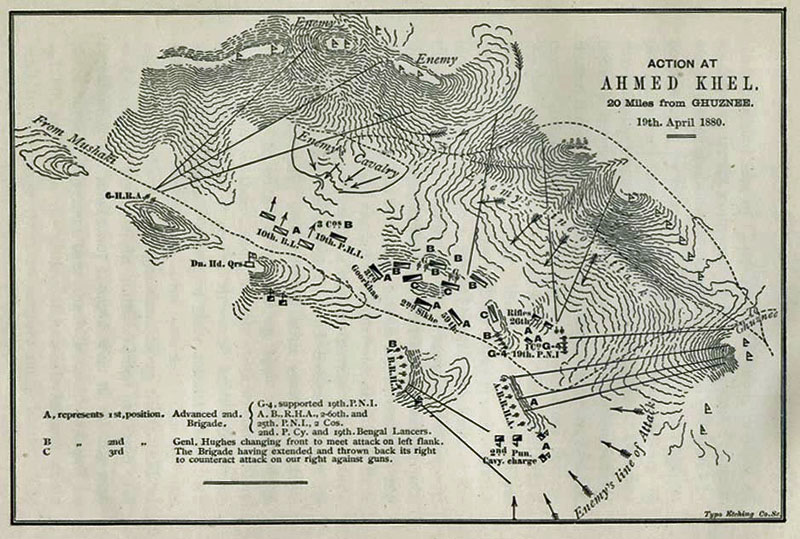
Khandahar - Kabul - We then proceeded to Kabul via Khalat-I-Ghilzai, and Ghazni. (Stewart left Khandahar on 27th March with 7,249 men, 7,273 followers and 11,000 animals, all to live off the country, as they were short on supplies. After Khalat I Ghilzai the followers only got whole grains of wheat sweetened with sugar!) It was glorious to get on the move again. After passing Khelat I Ghilzai on the second day, our column being about 7 miles in length owing to passing through defiles, our advance guard, after passing through the last defile gave warning of the enemy being in front some thousands in strength and after gathering enough forces, engaged them in battle lasting for about two hours, it being estimated that about 2,000 of the enemy being killed, this according to a dispatch report of the 'Battle of Ahmed Khel' Afghanistan, the column was suddenly attacked by 2,000 Ghazi horsemen, big men with white robes and swords, trying to guard their bodies from Stewarts hail of Martini Henry bullets. The fight lasted just an hour with 17 British killed and 124 wounded. The opposing force numbered 15,000 who suffered about 3,000 dead. The day after occupying Ahmed Khel, news came of a 7,000 strong advance guard gathering near Ghazni. Stewart quickly intervened with 2,800 men under Palliser, who eventually dispersed them only after Stewart came out with an extra 1,200 men. The Heavy Battery and the Miners and Sappers were left to guard the city under Major Tillard, who organised a barricade of camel saddles at the gates. Fortunately they were not needed. This was called the battle of Arzu.
After resting for about an hour, the troops moved off towards Ghazni about 9 miles, where the Division was to halt It was here that in 1842 'A' Battery R.H.A. guns were captured from the British, these were retaken and brought back by the troops. During our rest or stay at Ghazni the enemy attempted to attack. The Division being notified, met them at he village of Urzoo at about 6 a.m. about three miles from camp. We engaged them until about 3.30 p.m. causing the enemy to disperse, returned to camp and no more trouble came. After resting for three more days, we continued our march to Kabul, over hills which had to be blasted by the R.E. to prepare road for the heavy ordnance 40 pound Battery with elephants to pass. On arrival into camp in the Zarghanshar Valley we were delayed for some weeks through unknown reasons, and then marched on to Kabul. (Finally an acceptable placeman for the Afghan throne was wearily agreed all round, most parties now quite fed up with disruption. Abdurrahman was made Amir of Kabul.)
During this time the Afghans at Khandahar, where we had left, broke out, causing great trouble, the regiment of foot being cut up. (On 28th April back in England, Prime Minister Disraili was defeated in an election, largely because of the Afghan war, in favour of Gladstone and his 'Midlothian Campaign', Stewart now became l.C. Afghanistan, and now had about 20,000 troops plus followers, a lot to feed in a poor country). Meanwhile in Khandahar, now commanded by Lieutenant General Primrose, they had foolishly been drawn into battle at nearby Maiwand on 11th July with disastrous results. 969 British were killed, and 3,000 Afghans, with a compete rout of the force under Brigadier General Burrows. It was decided by the authorities that General Sir Frederick Roberts should make his selection of troops to form a Brigade and get to Khandahar as a matter of urgency. No wheeled artillery were to accompany his troops, so only the mountain Battery was selected. On our arrival at Kabul our Division occupied a position in close proximity to Bala Hissar, where we remained in readiness for any eventualities which may happen. The result of General Roberts historic march from Kabul to Khandahar and the defeat of the enemy there are well known, and meant for us the cessation of hostilities and the close of the campaign.
After resting for about an hour, the troops moved off towards Ghazni about 9 miles, where the Division was to halt It was here that in 1842 'A' Battery R.H.A. guns were captured from the British, these were retaken and brought back by the troops. During our rest or stay at Ghazni the enemy attempted to attack. The Division being notified, met them at he village of Urzoo at about 6 a.m. about three miles from camp. We engaged them until about 3.30 p.m. causing the enemy to disperse, returned to camp and no more trouble came. After resting for three more days, we continued our march to Kabul, over hills which had to be blasted by the R.E. to prepare road for the heavy ordnance 40 pound Battery with elephants to pass. On arrival into camp in the Zarghanshar Valley we were delayed for some weeks through unknown reasons, and then marched on to Kabul. (Finally an acceptable placeman for the Afghan throne was wearily agreed all round, most parties now quite fed up with disruption. Abdurrahman was made Amir of Kabul.)
During this time the Afghans at Khandahar, where we had left, broke out, causing great trouble, the regiment of foot being cut up. (On 28th April back in England, Prime Minister Disraili was defeated in an election, largely because of the Afghan war, in favour of Gladstone and his 'Midlothian Campaign', Stewart now became l.C. Afghanistan, and now had about 20,000 troops plus followers, a lot to feed in a poor country). Meanwhile in Khandahar, now commanded by Lieutenant General Primrose, they had foolishly been drawn into battle at nearby Maiwand on 11th July with disastrous results. 969 British were killed, and 3,000 Afghans, with a compete rout of the force under Brigadier General Burrows. It was decided by the authorities that General Sir Frederick Roberts should make his selection of troops to form a Brigade and get to Khandahar as a matter of urgency. No wheeled artillery were to accompany his troops, so only the mountain Battery was selected. On our arrival at Kabul our Division occupied a position in close proximity to Bala Hissar, where we remained in readiness for any eventualities which may happen. The result of General Roberts historic march from Kabul to Khandahar and the defeat of the enemy there are well known, and meant for us the cessation of hostilities and the close of the campaign.
(Roberts arrived at Khandahar, took over from Primrose, based on four months seniority, and faced up to an Afghan army of 4,800 regulars, 32 guns and 8,000 irregulars. Roberts had 12,500 but also had to safeguard the city . On 1st. September 1880 he had a very complete victory and completely dispersed the Afghans, with only 35 killed, 213 wounded, against 1,200 dead Afghans . Roberts reputation was much enhanced.)
Kabul - Khyber Pass - Peshawar - A number of loose ends had to be tidied up. The generals had arguments about who cocked up what, when and why. For example some said that Sam Browne, who was awarded the G.C.B and invented 'The Belt', was a regular old woman and quite unfit to command an army. Probably unfair, but typical of the backstabbing. The Achakais had to be punished - Baker did this- 2,500 confiscated animals, a nominal fine and some houses and crops burned 'par example'. The Marris likewise - a 260,000 rupee fine and some hostages held.
We were ordered to return to India by way of the Khyber Pass. On leaving Khandahar I was appointed victualling sergeant in addition to my own duties with the exception of guard duties, which I maintained to completion of the campaign. I was responsible for the supply of rations for the Battery and often on arrival in camp after a full days marching I had to go out with an escort to the nearest villages around for supplies for the cattle or any item of use for the following day. This duty often kept me out till midnight and occasionally later still. These long hours were very fatiguing. On leaving Kabul our Battery was detailed off for rear guard and I was placed in full charge of the ordnance which had been captured from the Afghans.
This ordnance comprised of 72 guns, howitzers and mortars, some of these were of small calibre. I received from Ordnance Dept. Bullocks and a few camels for transport of the guns etc. The camels were always put in the lead while the bullocks did the draught work in the wheel of the team. Owing to the shortage of animals two or three of the vehicles were lashed together to be pulled along by one team of animals. This was effective when going along the level but when ascending and descending the cliffs of the Khyber Pass they had to be unlashed and drawn singly up and down the inclines owing to the zig zag of the roads, and when we had to travel along the top, relashed. This unlashing and lashing up again was a very tedious job as we had only six men from the battery to do this work which the native drivers did not or would not understand.
Our progress through the Khyber Pass was very slow, tedious and irritating owing to these much too frequent stoppages. In addition to this I had all my own transport for the commissariat to supervise, and also deal with the issue of all the rations and stores with only the assistance of the Babboo who was a very good help to me. We were grateful when we eventually arrived at Peshawar after fourteen days or so on the road from Kabul, where I had to park them on the Parade Square of the native Infantry lines, until instructions were received for their removal to the Arsenal at Nowshera. The Battery were to remain at Peshawar for six months to allow men and horses to recoup, the latter being in very poor condition. In fact, non commissioned officers and men required rest.
Kabul - Khyber Pass - Peshawar - A number of loose ends had to be tidied up. The generals had arguments about who cocked up what, when and why. For example some said that Sam Browne, who was awarded the G.C.B and invented 'The Belt', was a regular old woman and quite unfit to command an army. Probably unfair, but typical of the backstabbing. The Achakais had to be punished - Baker did this- 2,500 confiscated animals, a nominal fine and some houses and crops burned 'par example'. The Marris likewise - a 260,000 rupee fine and some hostages held.
We were ordered to return to India by way of the Khyber Pass. On leaving Khandahar I was appointed victualling sergeant in addition to my own duties with the exception of guard duties, which I maintained to completion of the campaign. I was responsible for the supply of rations for the Battery and often on arrival in camp after a full days marching I had to go out with an escort to the nearest villages around for supplies for the cattle or any item of use for the following day. This duty often kept me out till midnight and occasionally later still. These long hours were very fatiguing. On leaving Kabul our Battery was detailed off for rear guard and I was placed in full charge of the ordnance which had been captured from the Afghans.
This ordnance comprised of 72 guns, howitzers and mortars, some of these were of small calibre. I received from Ordnance Dept. Bullocks and a few camels for transport of the guns etc. The camels were always put in the lead while the bullocks did the draught work in the wheel of the team. Owing to the shortage of animals two or three of the vehicles were lashed together to be pulled along by one team of animals. This was effective when going along the level but when ascending and descending the cliffs of the Khyber Pass they had to be unlashed and drawn singly up and down the inclines owing to the zig zag of the roads, and when we had to travel along the top, relashed. This unlashing and lashing up again was a very tedious job as we had only six men from the battery to do this work which the native drivers did not or would not understand.
Our progress through the Khyber Pass was very slow, tedious and irritating owing to these much too frequent stoppages. In addition to this I had all my own transport for the commissariat to supervise, and also deal with the issue of all the rations and stores with only the assistance of the Babboo who was a very good help to me. We were grateful when we eventually arrived at Peshawar after fourteen days or so on the road from Kabul, where I had to park them on the Parade Square of the native Infantry lines, until instructions were received for their removal to the Arsenal at Nowshera. The Battery were to remain at Peshawar for six months to allow men and horses to recoup, the latter being in very poor condition. In fact, non commissioned officers and men required rest.
By the end of December 1880, almost the entire expeditionary force was back in India. A replacement force of 20,000 was stationed in critical locations, whilst the Generals and Politicians in London and Simla argued the pros and cons of this expense and the perceived attitude of the Russians. ' Plus ca change ' as our French pals would say. During this time vast members of army staff were employed calculating how fast the Russians could lay rail tracks to Quetta and how fast we could lay them the other way! Instructions were received for the Battery to be stationed at Meerut and to proceed there the latter part of March 1881. The Battery left Peshawar on 30th March.
I, having received orders from the Officer Commanding the Battery to take all captured ordnance etc. to Ordnance Depot at Nowshera, commencing the journey with guns etc. (72) captured from the Afghans during the campaign, to the commandant in charge at Nowshera. This completed my supervision of this transaction. I was thoroughly complimented by my officers for the work which had been carried out in such a satisfactory manner.
Peshawar - Meerut - Instructions were received for the Battery to be stationed at Meerut and to proceed there the latter part of March 1881. Having rejoined the Battery and pleased to say goodbye to the last responsible service, and to enjoy again the company of my comrades and the march we had in front of us, a distance of 450 miles. The Battery left Peshawar 30th. March 1881 and arrived in Meerut in the middle of May, all dressed in blue or home uniform. The Battery received a good reception from all the troops stationed there. Here I completed my service in India and the Royal Artillery in 1883, some six months after my engaged period, and left the Battery in December of that year for home having completed ten years service in India.
Meerut - Bombay- Woolwich - I took the train for Deolally, Bombay, this being receiving depot for the troops going and returning from India. Unfortunately the troopship I was to travel by, met with an accident on her passage being detained for repairs etc. for six weeks, so I was doomed for another spell, and during this delay the O.C. of the Depot, sent for me and requested me to take up the duties of Provo Sergeant which I accepted and carried on until date of embarkation. Previous to this the C.O. of the Depot asked me to retain this service on board the ship, but knowing that I would be responsible for all prisoners including convicts and insanes, I declined to accept, for during my stay at this depot and provost sergeants work, I had had sufficient trouble with policemen and the task of being everywhere at one time, I felt anxious to have a few hours to myself whilst on the voyage and thoroughly enjoy the journey having made some good friends, landing in Woolwich in February 1884. During my stay at Woolwich, I received from the Officer Commanding the Artillery Regiment, word to know if I would like to re-engage for a second period of service, viz. 21 years. Accepting this offer recommendation for reengagement which was submitted to the War Office, and returned sanctioned. So I remained for another 21 years, making a total of thirty three and a half years service.
The Delhi Durbar 1877 - I was also present on the 1st January 1877 at the proclamation of Queen Victoria as Empress of India, which was quite a sight to be present and see. My Battery which I was serving in, the 4th. Brigade Royal Artillery, was stationed at Nowgong, Bundlecund District, Central, India, from where we marched, leaving 8 September 1876 arriving at Delhi in December, a distance of 270 miles, and remaining at camp, Budley-K-Serry till 7th or 8th January and leaving for Lahore arriving latter part of February.
I, having received orders from the Officer Commanding the Battery to take all captured ordnance etc. to Ordnance Depot at Nowshera, commencing the journey with guns etc. (72) captured from the Afghans during the campaign, to the commandant in charge at Nowshera. This completed my supervision of this transaction. I was thoroughly complimented by my officers for the work which had been carried out in such a satisfactory manner.
Peshawar - Meerut - Instructions were received for the Battery to be stationed at Meerut and to proceed there the latter part of March 1881. Having rejoined the Battery and pleased to say goodbye to the last responsible service, and to enjoy again the company of my comrades and the march we had in front of us, a distance of 450 miles. The Battery left Peshawar 30th. March 1881 and arrived in Meerut in the middle of May, all dressed in blue or home uniform. The Battery received a good reception from all the troops stationed there. Here I completed my service in India and the Royal Artillery in 1883, some six months after my engaged period, and left the Battery in December of that year for home having completed ten years service in India.
Meerut - Bombay- Woolwich - I took the train for Deolally, Bombay, this being receiving depot for the troops going and returning from India. Unfortunately the troopship I was to travel by, met with an accident on her passage being detained for repairs etc. for six weeks, so I was doomed for another spell, and during this delay the O.C. of the Depot, sent for me and requested me to take up the duties of Provo Sergeant which I accepted and carried on until date of embarkation. Previous to this the C.O. of the Depot asked me to retain this service on board the ship, but knowing that I would be responsible for all prisoners including convicts and insanes, I declined to accept, for during my stay at this depot and provost sergeants work, I had had sufficient trouble with policemen and the task of being everywhere at one time, I felt anxious to have a few hours to myself whilst on the voyage and thoroughly enjoy the journey having made some good friends, landing in Woolwich in February 1884. During my stay at Woolwich, I received from the Officer Commanding the Artillery Regiment, word to know if I would like to re-engage for a second period of service, viz. 21 years. Accepting this offer recommendation for reengagement which was submitted to the War Office, and returned sanctioned. So I remained for another 21 years, making a total of thirty three and a half years service.
The Delhi Durbar 1877 - I was also present on the 1st January 1877 at the proclamation of Queen Victoria as Empress of India, which was quite a sight to be present and see. My Battery which I was serving in, the 4th. Brigade Royal Artillery, was stationed at Nowgong, Bundlecund District, Central, India, from where we marched, leaving 8 September 1876 arriving at Delhi in December, a distance of 270 miles, and remaining at camp, Budley-K-Serry till 7th or 8th January and leaving for Lahore arriving latter part of February.
After Indian Service - Arriving back in England from India, Fred accepted the offer of a further engagement term of 21 years, but at this point the story thins out a bit. Records however show that quite shortly after his return in February he married a Miss Mary Perryman in April, both from the same address of 43 Gousalva Road, Battersea. Fred is described as a soldier and Mary a housemaid. The witnesses were Mathew Morton Cocker and Emily Cocker. In the 1891 Census they are both listed at Hilsea Barracks, Cosham, Hants, and then at 256 Chorley Old Road Bolton, in 1891, as Sergeant Major of the 9th Lancs Artillery Volunteers.
Fred moved at some time after his retirement to Exeter. This was probably because his wife was from nearby Budleigh Salterton on the Dorset coast, a much more pleasant place to live than the north, where all the towns were very dirty with coal smoke at this time, and to be avoided if possible.
A Contemporary Account of the Battle of Ahmed Khel (extracted from a newspaper cutting circa 1880) - Throughout the whole of the Mutiny the stubborn valour of the Artillery was again remarkable. F Battery was also with the force under General Primrose which was sent to garrison Kandahar. In the action at Amhed Khel it behaved with conspicuous bravery. The action commenced at 9 0'clock precisely, and from that time till 10 a.m., when the " cease firing " sounded all along the line, the roar of the guns and the rattle of the Infantry fire never ceased for a moment.
F Battery was in advance on the extreme right, and the guns opened upon the enemy at a distance of 1,200 yards. They did not wait for an attack as 3,000 Ghazis rushed on to the British line, and they charged up to within thirty yards of Major Warter's (F Batteries) guns, and compelled him to retire 100 or 150 yards, when he again came into action. The practice of his guns during the whole engagement was particularly good.
At Maiwand, E Battery, Royal Horse Artillery. covered itself with glory. Two of the guns were taken and retaken early in the action, and at last the supports, having been forced step by step by the weight of superior numbers, one of the guns was permanently captured and turned upon those from whom it was taken. This was not effected without a desperate hand-to-hand fight. The enemy advanced with such rapidity and daring that many were killed within twenty yards of the muzzles of the guns.
Lieutenant Osborne, in this action saved the lives of Major Blackwood and Captain Michell, seeing them surrounded by half-a-dozen Ghazis, were slashing at them with their tulwars, he flung himself into his saddle and dashed to their rescue, just where the fight seemed thickest. He burst through the wall of turbaned swordsmen surrounding them and slashed his way through the mass... [article truncated]
Fred moved at some time after his retirement to Exeter. This was probably because his wife was from nearby Budleigh Salterton on the Dorset coast, a much more pleasant place to live than the north, where all the towns were very dirty with coal smoke at this time, and to be avoided if possible.
A Contemporary Account of the Battle of Ahmed Khel (extracted from a newspaper cutting circa 1880) - Throughout the whole of the Mutiny the stubborn valour of the Artillery was again remarkable. F Battery was also with the force under General Primrose which was sent to garrison Kandahar. In the action at Amhed Khel it behaved with conspicuous bravery. The action commenced at 9 0'clock precisely, and from that time till 10 a.m., when the " cease firing " sounded all along the line, the roar of the guns and the rattle of the Infantry fire never ceased for a moment.
F Battery was in advance on the extreme right, and the guns opened upon the enemy at a distance of 1,200 yards. They did not wait for an attack as 3,000 Ghazis rushed on to the British line, and they charged up to within thirty yards of Major Warter's (F Batteries) guns, and compelled him to retire 100 or 150 yards, when he again came into action. The practice of his guns during the whole engagement was particularly good.
At Maiwand, E Battery, Royal Horse Artillery. covered itself with glory. Two of the guns were taken and retaken early in the action, and at last the supports, having been forced step by step by the weight of superior numbers, one of the guns was permanently captured and turned upon those from whom it was taken. This was not effected without a desperate hand-to-hand fight. The enemy advanced with such rapidity and daring that many were killed within twenty yards of the muzzles of the guns.
Lieutenant Osborne, in this action saved the lives of Major Blackwood and Captain Michell, seeing them surrounded by half-a-dozen Ghazis, were slashing at them with their tulwars, he flung himself into his saddle and dashed to their rescue, just where the fight seemed thickest. He burst through the wall of turbaned swordsmen surrounding them and slashed his way through the mass... [article truncated]
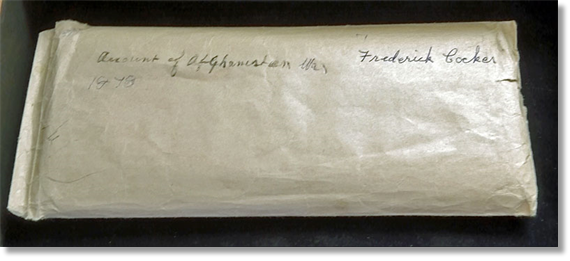
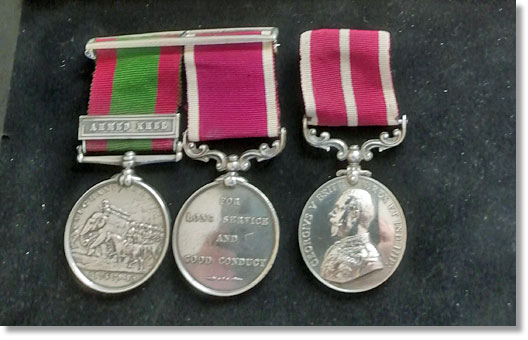
Fred's medals - Afghan with Ahmed Khel Clasp, LS&GCM & MSM
Envelope containing the original handwritten diary

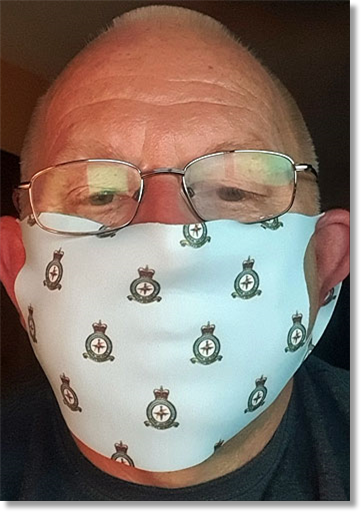
John Belcher, Chippenham
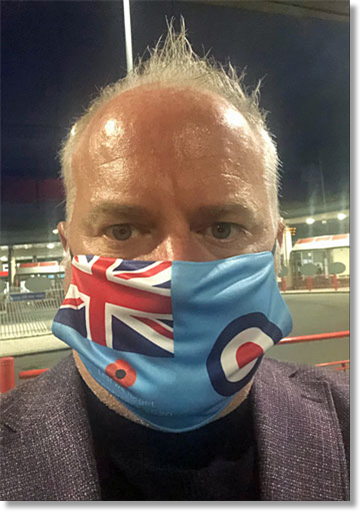
Mal Robinson, Gateshead
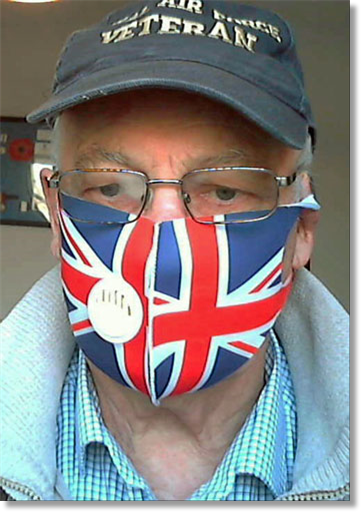
Gerry Davis, Bristol
[You might ask, how do we keep our eyeglasses from fogging up while wearing a mask? Rub your dampened thumb and index finger with regular bar soap. Using your soap-coated thumb and forefinger, rub both sides of your glasses lens, creating a soap film. Allow it to dry for about 30 seconds. Using a soft cloth or tissue, polish the lens until clear. Voila! The lens should not fog up now. Repeat on a daily basis - TG]
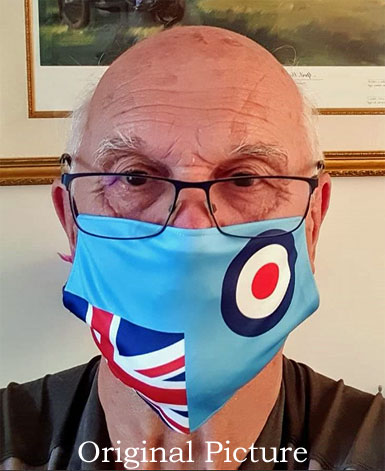
Bob Dixon, The Bassett
For those who noticed my face covering was
upside down in my original Facebook post,
herewith a corrected version!
For those who noticed my face covering was
upside down in my original Facebook post,
herewith a corrected version!
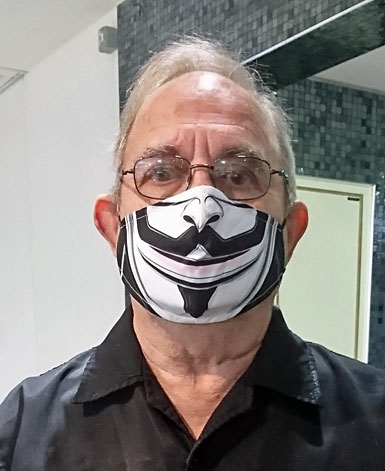
Donald Milburn, Swindon
Made a trip to Kos, Greece, Sept/Oct so took my new protective mask. My wife Jan also had a cheeky one posing with the waitress
Made a trip to Kos, Greece, Sept/Oct so took my new protective mask. My wife Jan also had a cheeky one posing with the waitress

From: Bryan Morgan, Abingdon, Oxon
Subject: Face Masks
Tony,
I have long enjoyed drinking Ned, a NZ Sauvignon Blanc, and for Father’s Day my daughter bought me a bottle of Pinnacle - an up market version of the same wine retailing at £15.
This, I thought, would be something special but it was so disappointing that I was forced to send my derogatory remarks to the producer. To my delight I was sent two complimentary bottles of my usual Ned plus two logo face masks.
As you will see below, they offered me the ultimate brinkmanship when next meeting my socially distanced wine drinking friends. Removed, of course, for the following consumption!
Regards,
Bryan
Subject: Face Masks
Tony,
I have long enjoyed drinking Ned, a NZ Sauvignon Blanc, and for Father’s Day my daughter bought me a bottle of Pinnacle - an up market version of the same wine retailing at £15.
This, I thought, would be something special but it was so disappointing that I was forced to send my derogatory remarks to the producer. To my delight I was sent two complimentary bottles of my usual Ned plus two logo face masks.
As you will see below, they offered me the ultimate brinkmanship when next meeting my socially distanced wine drinking friends. Removed, of course, for the following consumption!
Regards,
Bryan
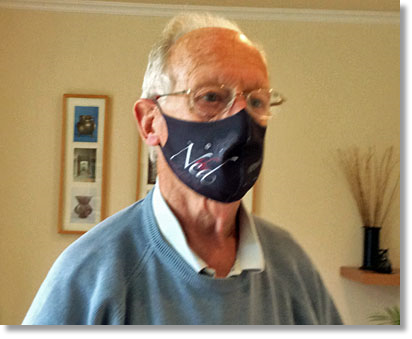

Video - Don't forget your face mask!

From: Allan Walker, Burnley, Lancs
Subject: Movements Officers' Reunion 2020
Good afternoon Tony,
I was going to attend the Cenotaph Parade again this year, however, there has been a restriction of 8 places for each of the organisations taking part so I will not be going.
What a year it has been. In Burnley we presently now have the highest number of cases in UK. Not quite yet in full lockdown but it seems so with the current restrictions. So far all is well with all our family who live locally.
Saw from the last Old Bods e-mail that Ben Ball has died. Knew him well. If you can get a copy of the training film "Black Spear" you will find both of us in it.
Keep safe everyone!
Allan
Subject: Movements Officers' Reunion 2020
Good afternoon Tony,
I was going to attend the Cenotaph Parade again this year, however, there has been a restriction of 8 places for each of the organisations taking part so I will not be going.
What a year it has been. In Burnley we presently now have the highest number of cases in UK. Not quite yet in full lockdown but it seems so with the current restrictions. So far all is well with all our family who live locally.
Saw from the last Old Bods e-mail that Ben Ball has died. Knew him well. If you can get a copy of the training film "Black Spear" you will find both of us in it.
Keep safe everyone!
Allan
[Unfortunately, try as I might, I couldn't locate the video - TG]

Video: Flying The World's Biggest Turboprop - Antonov AN-22
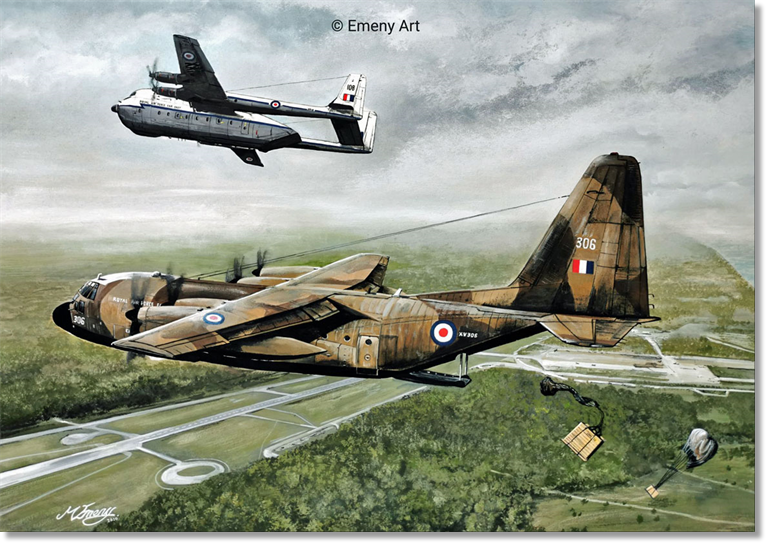
An Argosy and Hercules over Changi - by Aviation artist Matthew Emeny
The painting is now off to the printers ready for limited edition print production. Print release date should hopefully be early December and I hope to produce two sizes. Scene details are below as well as information on how to reserve prints.
SCENE DETAILS
The scene features RAF 215 Squadron Argosy C Mk1 'XR108' and 48 Squadron Hercules C Mk1 'XV306' flying over RAF Changi, Singapore during the late 60s. The Hercules is making a low level drop as part of a training exercise. My customers father transitioned from the Argosy to the Hercules in 1968 and the painting is symbolising this changeover.
SCENE DETAILS
The scene features RAF 215 Squadron Argosy C Mk1 'XR108' and 48 Squadron Hercules C Mk1 'XV306' flying over RAF Changi, Singapore during the late 60s. The Hercules is making a low level drop as part of a training exercise. My customers father transitioned from the Argosy to the Hercules in 1968 and the painting is symbolising this changeover.
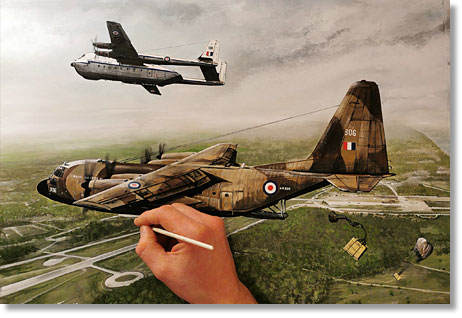
As pointed out by a few people, I am aware that the Hercules number is a slightly later arrival to RAF Changi. However, both aircraft are significant to my customer and his father and therefore minor artistic license has been permitted.
LIMITED EDITION SIGNED PRINTS
There will be 100 limited edition prints produced and these can be reserved without deposit or commitment by emailing a request to: reserve@emenyart.com
Sizes and prices unknown at this stage, but will be communicated as soon as possible
COMMISSIONS
If you are interested in commissioning a painting, then please message me or send an email to commissions@emenyart.com
Cheers!
Matthew Emeny
LIMITED EDITION SIGNED PRINTS
There will be 100 limited edition prints produced and these can be reserved without deposit or commitment by emailing a request to: reserve@emenyart.com
Sizes and prices unknown at this stage, but will be communicated as soon as possible
COMMISSIONS
If you are interested in commissioning a painting, then please message me or send an email to commissions@emenyart.com
Cheers!
Matthew Emeny
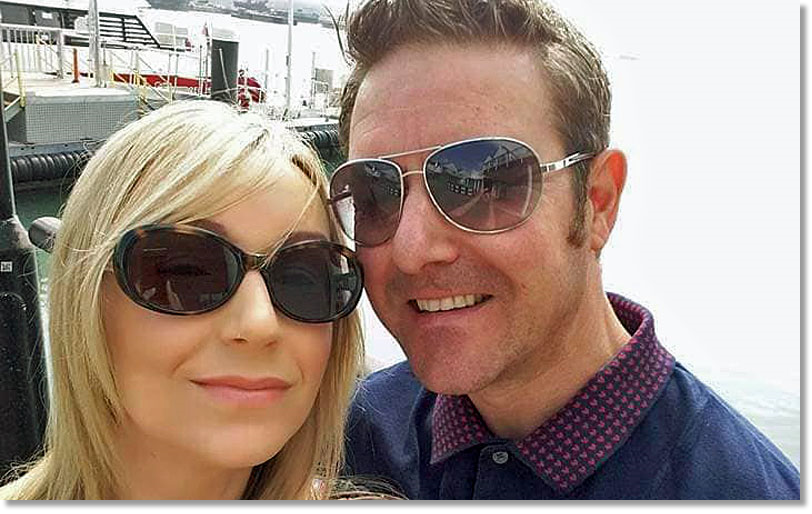
Louisa and Andy Crisp (RAF) celebrated their 12th anniversary recently
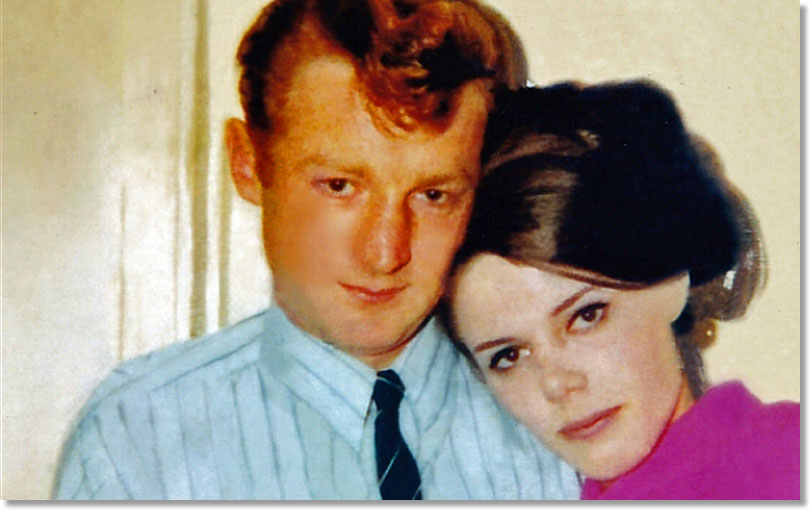
Still together after 53 years - this picture was taken on Dave and Rosemary Abrams (RAF) first date!
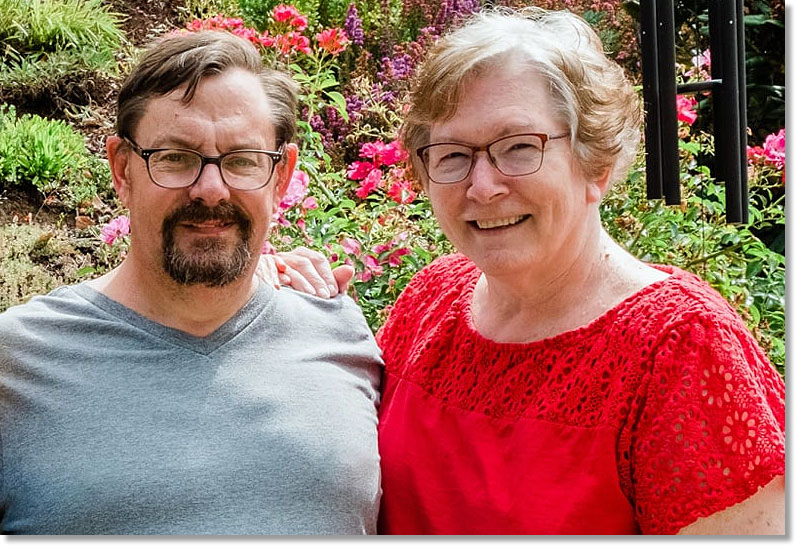
Dave and Cindy Salmon (RAF) at home in the Pacific Northwest USA celebrating 19 years
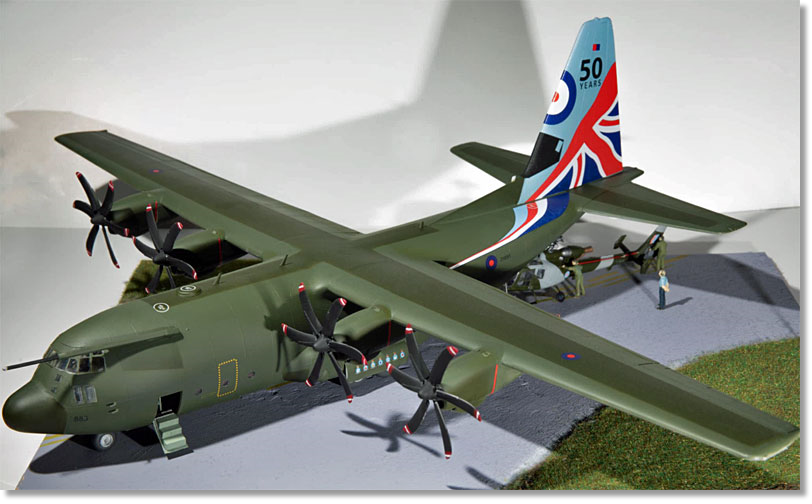
Richard Allen (RAF) - Latest lockdown project completed. Was going to call it "Spot the DAMO!"
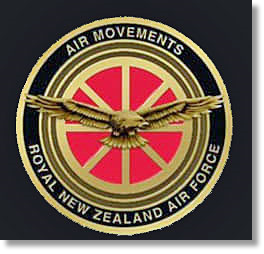
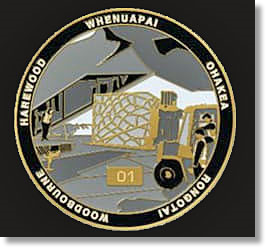
Auckland A4 and FLTLT Tracey Lewis in consultation with the Air Movement units have been developing a challenge coin - the final version is presented above.
The wider Logistics/ALM community are now welcomed to register their interest in purchasing some of these (unnumbered). The target is to get an additional 100 coins ordered to keep the final cost down.
Coins are expected to cost individuals between $9-$10 each. Shipping costs to individuals who can't pick up from an Air Movements terminal will be an additional cost.
Multiple coin orders encouraged!
To register your interest, email ak.a4@nzdf.mil.nz with the quantity requested. Replies required by EOP Wed 4 Nov.
The wider Logistics/ALM community are now welcomed to register their interest in purchasing some of these (unnumbered). The target is to get an additional 100 coins ordered to keep the final cost down.
Coins are expected to cost individuals between $9-$10 each. Shipping costs to individuals who can't pick up from an Air Movements terminal will be an additional cost.
Multiple coin orders encouraged!
To register your interest, email ak.a4@nzdf.mil.nz with the quantity requested. Replies required by EOP Wed 4 Nov.
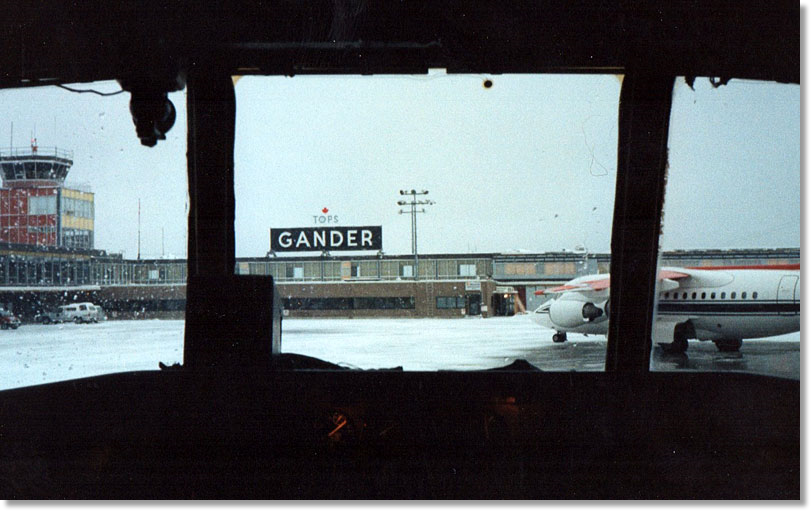
So many memories - Albert Ross here we come!
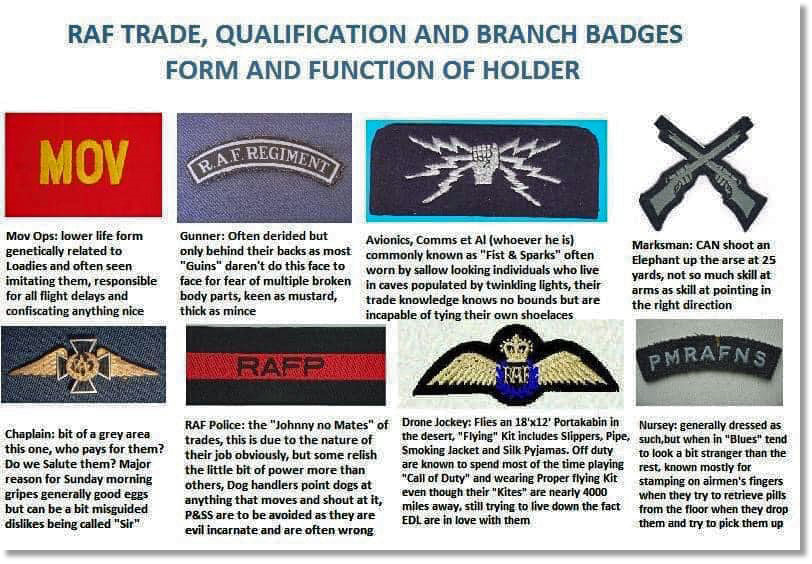
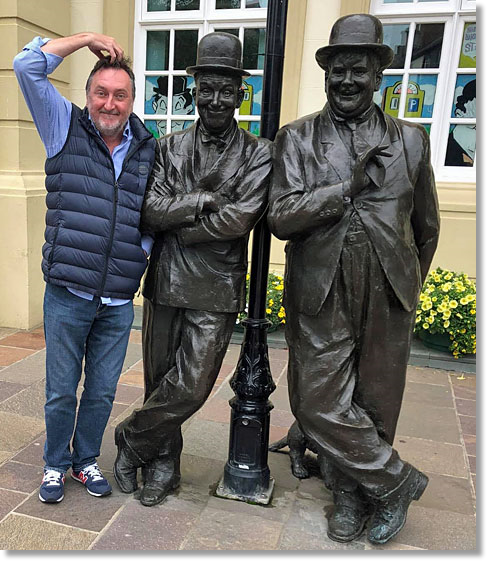
From: Lee Kincart, Basel
Subject: Kincart, Laurel and Hardy
Hi Tony,
I was visiting mum in Arnside in the summer and I took her to Ulverston for lunch and a wander around. Unfortunately we did not have enough time to visit the Laurel & Hardy museum there.
Stan Laurel was born there and back then it was part of Lancashire, but since the map was re-drawn years ago, it is a popular tourist spot in Cumbria.
I was brought up in Kendal so love the Lake District.
If I’m not mistaken, I think Pete Buck was from there, or nearby. We used to drive home together from trade training at Brize.
Cheers
Lee
Subject: Kincart, Laurel and Hardy
Hi Tony,
I was visiting mum in Arnside in the summer and I took her to Ulverston for lunch and a wander around. Unfortunately we did not have enough time to visit the Laurel & Hardy museum there.
Stan Laurel was born there and back then it was part of Lancashire, but since the map was re-drawn years ago, it is a popular tourist spot in Cumbria.
I was brought up in Kendal so love the Lake District.
If I’m not mistaken, I think Pete Buck was from there, or nearby. We used to drive home together from trade training at Brize.
Cheers
Lee
More Relevant Stuff
This newsletter is dedicated
to the memories of:
Guy Paquin (RCAF)
Sam "Gazoo" Gordon (RCAF)
to the memories of:
Guy Paquin (RCAF)
Sam "Gazoo" Gordon (RCAF)
Tony Gale
ukmamsoba@gmail.com
ukmamsoba@gmail.com




